#then i also want to draw Corrupt because i made a brand new reference for him....
Text
There's so much to do....so many options...can't choose one...*exaggerated sigh*....
#rambling anne#i want to do the weekly prompts for inktober....#but then i also need to do a drawing for my friend...which i do want to drsw but STILL#then i also want to draw Corrupt because i made a brand new reference for him....#also have a request.....#AGGGHHHHHHH#artist struggles
10 notes
·
View notes
Text
The Tolls of Justice: the Tarot, Name Meanings, and More!
Gentlepeople…
BEHOLD!
All the tarot-aligned hints! All the future foretellings! All the silly references! :) Everything you might have overlooked is here for you easy-to-read pleasure!
Naturally, there be spoilers a-plenty ahead for Batman the TellTale Series: The Tolls of Justice, so if you haven't read it (or maybe you're thinking about reading it, or this is your first time hearing about it), I'd advise waiting until you're done with each chapter to read through the sections. You can either click the link and be redirected to Ao3, or look through my tumblr tag #ttoj!
*One forwarding note: the tarot references build slowly in this story, and I only use the traditional Major & Minor Arcana. You'll see a lot of jokes and name-type references before we get to the tarot. I also simplified the numerics, but they're often displayed as roman numerals on cards, hint hint.
Prologue
gang member "Four Ears" - a very very off-the-collar reference to the line "Listen up, four-ears!" from J-Men Forever; in context, it was an off-shoot of the insult "four-eyes" but for music taste, also implying the person's taste was "square".
gang member "Muddy Nye" - his name can be boiled down to "muddy river". It works as an allusion to the messy, unclear case ahead of Bruce and the Batfam, but also as a hint to Clayface, who acted as Muddy in his first sighting of the story.
"Sunset" - a reference to everyone's favorite vampire series to pick on, the Twilight series; back when it was at the height of it's popularity, some drug dealers sold heroin marketed towards the crowd based off it's terrible and unfortunately iconic(?) line from Edward Cullen, "You're my own personal brand of heroin"…hence why the drug of choice BM is shipping here is heroin. Essentially, this plot setup is one big joke.
"FIGS" - a reference to POP! vinyls, hence the capitalized name and spiky word balloon on the packages.
"Gray Ghost [memorabilia]" - one of my (and everyone else's) favorite BtAS episodes, which proves definitively that Bruce Wayne | Batman is not only a Huge Nerd™, but also a massive collector of normal fandom things. (Do you think he troughs through blogs and fanwikis…? What am I saying, of course he does. He edits them.)
gang members "Jack Whendleham and Kirby Noltz" - nod to Jack Kirby, comic artist extraordinaire!
Ch.1: A Different Ceiling
[chapter title] - John does not wake up in Arkham at the start of the story, hence waking up to a different ceiling. He also hits different limitations on what he can do, so it's also a different kind of "ceiling". (Like the term "the glass ceiling", the invisible barrier a demographic hits in a hierarchy.)
St. Dymphna New Life Home - named after Saint Dymphna, the patron saint of mental illness. There's no "'s" at the end because I saw other clinics named after Saints didn't use the possessive form when referencing them.
The Lucky Hotel - an oxymoron, really; the unluckiest place to get stuck at with it's seedy history, but also the place where John "gets lucky"…in a couple of different ways!
Stitched Up Alterations - a heavy nod to the wonderful batjokesy line from S2, "We're two threads in the same stitch". It's pretty deeply ingrained in fanon (and technically canon, if you go with The Dark Knight) that Joker makes his own clothes, hence Batman rarely finding him through his tailor. Since John's thrifty and clearly made his original Joker outfit(s), I piggybacked off it as a legit skill to give him. I mean, come on, the guy is always so stylish! And you're really going to look at me and say he didn't alter his thrifted shirts and vests to fit his sleek frame? Puh-leeease.
13th Street - 13 is a traditionally unlucky number in western culture; hence the "Lucky Hotel" there having a bloody history, along with a failed, closed casino nearby.
Corazón gang - okay, I admit…I'm still a weeb at heart. It's a One Piece reference. Corazon was one of the few post-timeskip new characters I really liked; his name is Spanish for "heart", and he sported a heart motif. Like the gang in this story, he also died before the start of the main storyline.
Ch. 2: Face Values
[chapter title] - A reference to the phrase "not taking things at face value", which is very evident in this story. Also doubles as a rather loose reference to the upcoming Tarot cards.
Sebastian Overfield - The name Sebastian means "from Sebaste", as is derived from the Greek word sebastos ("venerable", someone who has a lot of respect). Overfield of course is "over" and "field", implying the family is on a high hill overlooking/overseeing/maintaining a certain field. As Seb is a reverend, this name is well-fit for him.
orange rose [gift from John] - means "passion" in the language of flowers, and can allude to fascination; this can be taken platonically or romantically…but it's definitely romantic when it's coming from John.
blue iris [gift from John] - means "faith and hope" in the language of flowers, and sometimes are associated with royalty; an allusion to Batman/Bruce's overall symbolism in the eyes of Gotham…and John.
Chandis [ship, circa Prologue] - A reference to Chandi | Chandika, the Hindu deity; the short version of their story is that they are a demon slayer, known to be angry and passionate, wield multiple weapons, and ride a lion. And who was on the ship? Hmm…
Ch. 3: Ink Trails
[chapter title] - A reference to the Alterations' claim slip John finds, which ends up leading back to the Court of Owls. It doubles as a reference to the mask tattoo/clue on Ian 'Nito'.
Faith Ackart - "Ackart" is a variant of "ackhart", derived from "ekkehard", which we can say roughly means "brave/hardy". The name "faith" and "hardy" together is another very subtle clue for the audience towards the villains' motives. (Well, I say that, but it was really more of a joke-clue for me to giggle at. And it makes a good reporter name!)
Lou Monger - the guy's a fish monger…with the last name Monger. It's-a joke! ;D
Ian 'Nito' Coggs - first mentioned without his real last name, but "Ian Coggs, Nito", is a pun on the word "incognito"…which is what Clayface is here.
FriendBook/Chirp/bloggr/uBox - takes on Facebook, Twitter, Tumblr, and YouTube respectively. (This started back in my 'Season 3' story, At the Brink of Midnight, though I've since learned that bloggr was a real thing. :T) The 'uBox' is meant to be a play on 'jumping box'/'the box' as other terms for TV, like 'the tube'.
"whole tomato of pins" - the supposed history of tomato-shaped pincushions is that tomatoes placed on mantels repelled evil spirits and guaranteed prosperity, but I really wanted to just allude to the common pin-cushion shape. (My mom once had a whole little basket of strawberry shaped pin-cushions. I remember "borrowing" them a lot as a kid to play with. And then "losing" them.)
"sock and buskin masks" - these are a reference to the "comedic sock" and "tragic buskin (i.e. boot)" of the Greek comedy-tragedy theatre masks. I figured something like them would be a good logo for the "false faces", as BM is obsessed with masks. It also doubles as a natural callback to the "your relationship with x has changed" feature of TT games.
Ch. 4: Suite of Cups
[chapter title] - the first chapter to be a reference to the Tarot, in specific the Minor Arcana of Cups; rather than specifying the card at play outright, this title is a pun on the aforementioned arcana "suite", as the main location of events this chapter are in a casino's hotel suite. One can interpret many Cups cards at play here, but...
○ Specifically, in the Casino's suite/crime scene, there are 8 visible seats, but 7 cups on the table. The 7 of Cups refers to choices, fantasy, and illusion, an indicates there are multiple opportunities or many paths you can take, but they should be chosen carefully; when reversed, it can mean confusion, diversion, and temptation, and indicate a lack of choice or failure to choose.
○ The upright version is definitely in play, with the overall root of TellTale games being choices, and some "the player" makes this chapter will move your relationships with Tiffany and John in different ways, which can strengthen your relationships with them. If "the player" has chosen to be a more violent Batman, the way the Talon - and later, the Court - treats Batman is different.
○ The Reversed reading can be interpreted for the Court's complete disregard for the mere notion of choice.
Bauta - a Venetian carnival mask, meant to represent 'anonymous decisions' via it's original design of protecting identities. It's quite common in carnivals.
Melpomene-Thalia - the Venetian masks for comedy and tragedy, a la 'sock and buskin', the masks used as a general symbol for theatre. You can practically taste the irony, given who's shown wearing it...
Volto - a Venetian mask, meant to represent 'anonymity, quiet exit' for it's blank face. It's also known as the "Citizen Mask" because of it's worn by the common folk (in comparison to the more elaborate masks).
The Lot [casino] - named for "drawing lots", like drawing straws or matches to pick a person to do a task (usually with the shortest straw having to do the task, but it varies). This is both a pun on the fact that it's a casino - where you try your luck at gambling - and corresponds with the theme of foretelling the future that's woven throughout much of the story.
The Wednesday Nighters gang - this doesn't mean anything in particular. I'm a big fan of Midsomer Murders, and there's an episode ("Death in a Chocolate Box") where it references a few dirty cops who frequently took the Friday night shift at a station for episode-plot-reasons, who called themselves The Friday Nighters. It's an off-shoot reference to it, hence the corrupt cops on the gang in this story. :)
[John's voicemail] - Another BtAS episode I love is "the terrible secret of Bruce Wayne". In particular, I loved Joker's voicemail when Dr. Strange calls in ("Boy, do YOU have the wrong number!") and I wanted to do something like that. But, y'know, way less murdery.
"F85H4ND" - l33t-written "Fate's Hand", for…well, the hand of fate, supposedly guiding you through life/events. Another correspondent to the foretelling the future theme.
Michael Hodgson - not all of the names I pick for characters mean anything. Sometimes their names are just loose references to things I like. This is a silly mish-mashup of the original hosts of Mystery Science Theater 3000, Michael [Nelson] and [Joel] Hodgeson. (Joel was the first host + show creator, and Mike was the second host who closed out the original series run.)
"40F5WRD5" [Batcomputer archive] - l33t for the 4 of Swords, a card in the Minor Arcana for rest and restoration; since the archives and file names are randomly generated when not prompted otherwise with manual input, an otherworldly force seems to be saying 'get some damn sleep Bruce'.
[John's ringtone] - I know, TT always has everyone's phone on silent. I don't care. Bruce's ringtone for John is "Mack the Knife", a song about a violent mobster, played on a carnival organ. Chosen because 1) John probably loves that song, 2) I thought it was funny that it has the line "the shark bites - with his teeth, dear - when he shows them pearly whites" and how well that goes with John's A+ dental care... 3) TeamFourStar made jokes in their BtTTS S2 playthrough about having "a special ringtone whenever John calls [them]"…why would I not carry that through? They did get me to where we are now, you know. ;)
Ryde - the in-game stand-in for Lyft, the not-a-taxi service.
Ch. 5: The Wheel Still Spins on the Upturned Chariot
[chapter title] - a reference to 2 tarot cards in the Major Arcana. 1) "The Wheel"/"The Wheel of Fortune", which is a sign for continuous cycles, inevitable fate, and usually indicates good fortune and pre-destiny when the card is presented upright. When reversed, it can signify bad luck and an unfavorable fate. 2) "The Chariot", symbolizing a path forward to success, confidence, and overcoming obstacles; when reversed, it's stands for recklessness and lack of direction/control. 3) As the Chariot is upside down, John's original plans have been upended and everything goes out of his control in a chaotic situation. He’s essentially "not at the driver’s seat" for a little while. "The player" decides which direction to take the wheel in - either letting him lash out violently and send him on more solitary and dangerous path, or satisfy his need for stability by embracing his new relationships. The Chariot is always upturned here, but whether the wheel spins forward or backward is up to "the player's" decisions.
511 N. Blade Street - this one's a bit messy. 511 = V I I, or VII in roman numerals, which =7. The tarot cards are traditionally numbered in roman numerals. North, for pointing upright, and "blade" is synonymous with "sword". So it’s the "7 of Swords", in the upright position – referring to deception and trickery, which is of course what's going on in regards to who Ian 'Nito' Coggs really is…
Apt 1005 - even muddier, but this is referring to the 10 of Swords, which is for betrayal and backstabbing, hinting at the true motives of "Ian" | Clayface. 10-0-5, so 10 and the l33t for "OS" = 10-o-S.
900 Wanda Way - Both a pun on the phrase “wander away” and the 9 of Wands in the Minor Arcana, which alludes to pushing forward to achieve victory. A good allusion for a clinic, me-thought.
400 Wanda Way - The 4 of Wands in the Minor Arcana stands for community, another good allusion for a clinic.
Karen McCarthy - named after the most stereotypically uptight narcissistic asshole the masses have agreed to call 'Karen', and both McCarthyism and another famous lady with the surname McCarthy. Because I wanted you to know the second you see her name that she is *horrible*. (Funny, though, there's 2 senators named McCarthy that are pieces of shit and one infamous quasi-celeb who's the face of the anti-vax scene. Is it just a cursed family name?)
Ch. 6: The Tips of Our Swords
[chapter title] - Refers to the 4 of Swords card in the Minor Arcana, as the "swords" are alluding to the four active members in the Batfam - Bruce, John, Tiffany, and Iman - who work together on the case[s]; you can infer this title to a presentation not unlike the Musketeers joining swords to affirm themselves as a team, as they all gather together. The reversed reading of the card is for restlessness/stress in Bruce's case, and the clear signal of the universe to tell him to relax, and the reading when presented right-side up is for the break it gives to "the player", with the homey atmosphere of the Batfam spending time together. Either reading is completely valid here.
○ BUT, as Alfred is a non-active member of the Batfam, we could also say that 5 of Swords is also at play, right-side-up for the fighting and resentment with Alfred, and John's hinted budding conflict with him; and 5 reversed for Bruce's attempts at making up with Tiffany. If one illustrated the gathering of our four heroes joining swords like the musketeers over a breakfast table, then Alfred would be sitting drinking tea, standing as a symbol of the Ace of Cups, signifying new emotions or stirrings of feelings.
○ If we stretch the metaphor eeeven further, the title can also be a loose reference to the Sword of Damocles; threats always hang above the heads of powerful people, and in this case the looming threat of Black Mask and the mysterious assassin, ever-present in Batman's world…
Dr. Brandi September - literally "Sword" and "Seventh Month", alluding to the 7 of Swords, hinting to deception and manipulation at play.
"I was tired of the soup du jour" - a shameless Devo reference; a tiring of the routine/everyday. "I'm tired of the soup du jour - I want to end this prophylactic tour - ain't nobody around me - understands my potato - I'm only a spud boy - lookin' for a real tomato" - DEVO, "Mr DNA/Smart Patrol".
Motel 11, Augury Road - "augury" is another word for crows; as a gathering of crows can be a method of fortune-telling, this a reference to a gathering of 11 crows, which when seen is supposed to be indicative of disguising or revealing secrets.
Ch. 7: Drawing the Strings
[chapter title] - meant to allude to John aligning the strings connecting the people and crimes together, like an old-fashioned way of mapping clues; can be interpreted as these crime-strings on the proverbial board being drawn closer together, marking the center of the "web" as the Court of Owls
Frieda Baast - Frieda, an allusion to the Norse goddess Freya, who rode on a chariot driven by cats, and Baast, the Egyptian goddess who had the form of a cat. It makes it really obvious who was staying at the Motel 11, huh?
room 14 [Selina Kyle's motel room] - a reference to the 14th tarot card, "Temperance", which when upright is meant for choosing the middle path between choices. This is meant to reference Selina herself, currently at a secret, personal crossroads and being in "the middle"; John can influence her hidden choice by either making her think about what her potential job's employers are really aligning themselves with, or taunting her into how she can't leave her old life behind. (Whether John is violent or not doesn't completely impact her choice, but it does impact how they interact later if Selina winds up in the hands of our villains.)
Oracle, Spoiler, Batgirl, Spectrum - Batman's had a lot of non-Robin sidekicks in comics, including Batgirl (originally Barbara Gordon), Oracle (Barbara Gordon, post-Batgirl-forced-retirement and computer hacker extraordinaire), and Spoiler (Stephanie Brown, who "spoiled" crimes). As a fan of Ao3/tumblr's @fractualized 's own Telltale Bat-verse fics (the "Release John Doe" series), I added in the reference to "Spectrum", which Tiffany became in lieu of "Robin". A wink from one fan-writer to another! ;)
"I'm steppin' out, my dear - to breathe an atmosphere […] - that simply reeks […] with class" - John's singing a classic Fred Astaire hit, "Top Hat, White Tie, and Tails".
Eric, Jerome, Jeremiah, Jack [John's "Normal name" ideas] - As this story allows "the player" to pick a name for John to use in place of his own, you can pick between some classic and modern references to Joker's alternate personas over the years. Eric White Border (edit: goddang it that's what i get for looking at White Knight while writing this up and never double-checking), Joker's regular persona in the New 52 Batman comic line; Jerome or Jeremiah of the Gotham TV series, both of which are different aspects of Joker's personality through media, with a more modern gritty version in Jerome (think Heath Ledger's Joker) and a more modern take on Joker's sociopathy in Jeremiah; and last but not least Jack Napier, the first official name of Joker circa Tim Burton's Batman (1989), and the one most popularly used (BtAS and other comics throughout the years since use this name). "The player"'s choice doesn't impact the story or the way John acts, but it does give a surprise feature later. ;)
Matt Chaney - Aka, "Clayface", Matt has both new and old elements in his name alone. Matt, for Matt Hagen, the most well-known/used of the Clayface personas, and Chaney, for classic film actor Lon Chaney, AKA the man of a thousand faces. This Clayface is an aspiring actor who is psychologically dependent on Moddy to keep him handsome after a terrible car accident left his face marred. He uses his excellent makeup skills and acting to infiltrate the False Face Society, and double-plays them and the Court of Owls.
Root / MuSec - stand-ins for Vine and TikTok, respectively. "MuSec" is both a play on the word "musac" (the word for 'elevator music' and generic produced music you hear in fake stores and the like) and the mish-mash of the words "music" and "second", referencing the short length of the videos. "Root" was used in a prior story (At the Brink of Midnight), and acts as another "natural network" type name akin to Vine; though I do recognize "Vine" might have come along as part of the phrase "I heard it through the grape-vine". I have a feeling some Aussie fans might find the fake-Vine name funny...or just awkward.
Ch. 8: It Had to Be You
[chapter title] - A reference to the classic crooner song, "It Had to Be You"; specifically, the one that flows through the first scene is a cover done by Frank Sinatra, meant to align with other Bat-media's use of Sinatra where Joker and Batman are concerned. The Arkham games got his famous "Under My Skin", and another crooner's "Only You". Batjokes fans/content creators have also used "Strangers in the Night" for their relationship. I wanted to present one that would feel at-home in the TellTale universe regardless of what route you end up with, and what's more perfect than a song about finally discovering the love of your life? The song fits them to a tee, in my humble opinion…
Estella Art Gallery - Selina's art gallery, mentioned previously to have been the site of a Talon attack. "Estella" translates to "star", for the tarot card "The Star". When presented upright, it means hope and rebirth; this card can be presented after a disaster, such as an event like "The Tower". Normally, it can be interpreted as a card to show a phase where you have trust and faith in yourself and the universe. Selina was turning over a new leaf and enjoying her new life until the Owls found out who she was.
Mrs. Bollard - "bald-headed person"…this poor woman got her wig snatched as John stole Bruce from her on the dance floor. xD
"I knew today's horoscope was bullshit" - a nod to earlier, where Roman mentioned his horoscope when visiting Bruce; "a friend will help you out of a tight bind." Not that it was mentioned like that... still! I wonder what today's was? "You will be fortunate in your business endeavors"? Ha ha ha! But really, the horoscope is another nod to the theme of foretelling the future, as it's a popular method to try and see how your day, month, season, or year will be. Not that I know what sign Roman is… *thinking face*
[Achievement Unlocked: Batman Who Laughs] - John showing up in the Batman cowl was not only funny, but a direct nod to the Batman Who Laughs. The TT games had Batman comic titles often used as Achievements, so I figured I'd put in some…
[Achievement Unlocked: Batwoman Rises] - Iman helping the team out in the spare Batman suit is naturally a nod to Batwoman, and something I wanted to do for a while. ;D
Brighella - a Venetian mask taken from a play now used to depict a cunning and mischievous servant. Originally the mask was used to depict a greedy villain character.
The Two Gilded Cups - A restaurant in-story that references "The Two of Cups" tarot card, a card representing unity, partnership, and two becoming one. When upright, it's a card that can reference lovers or a new relationship; when reversed, it can represent broken communication, imbalance, or tension. As such, the couple who were seen at the restaurant - Sonja Townsend and her husband - are established lovers who work together for the Court of Owls, but those who were really there are Jackie Lant and Matt Chaney, who are in an imbalanced relationship. "Gilded" implies that "The Cups" are covered unnecessarily with gold - this is both in reference to Jackie and Matt's disguise of the Townsends and the truth about their relationship. Matt's lies are covering for his narcissism and selfishness, and ultimately is the only thing holding him and Jackie's relationship together.
Moddy - A fictional body modification clay-mud-putty that's a product of Janus Industries, this makeup is the favorite of Matt Chaney and the reason we can call him "Clayface". Like the traditional Clayface, Matt is in dire need to have his fix of the makeup, despite what it does to him - as John notes, it leaves a weird burn-like sensation, and since Matt has deep scar tissue he covers every minute of every day, it's made the skin damage worse.
"You’re really committed to drowning in that river" - A riff on the old joke "denial ("de Nile") isn't just a river in Egypt".
"Your words are honey in my ears, but my brain always turns it into bitter wax" - In Futurama, Fry has a silly line of “Sweet words! Sweet words that turn into bitter wax in my ears!”. It always had the potential to be a great metaphor if the words were twisted around! :) Plus, I mean, come on, this is a totally On Brand™ thing for John to say!
Ch. 9: Strength in Numbers
[chapter title] - Referencing the Strength card, for bravery, compassion, and inner strength; the title also doubles as a play on “different kinds of strengths”. Strength is the will the expose your truths. Strength is finding compassion to help others. Strength is staying true to your convictions in the face of opposition. We see all different kinds of strength on display here.
○ It can also a reference to the different partnerships going on, with Jackie joining the team (unofficially), Bruce and Tiffany going off to tackle the other half of our case, and John and Iman’s team-up. :)
"[John] could barely hear it over the tinny electronic whistling tune emitting from his own phone, telling him the person on the other end was a mystery" - this is referencing an old tumblr joke! Yes, John has the “It is a mystery” tone on his phone for unknown calls…complete with the little (:o) ghost icon.
CUP5K1NG [license plate] - Referring to the King of Cups card, a card portraying emotional balance and compassion. As it's not written as "K1NGCUP5", it implies it's a reversed card, signifying there's manipulation and instability at work. Even though Matt doesn't own the car this license plate belongs to, it's definitely tied to him since it's his getaway ride, and thus hints at what's to be revealed in his and Jackie's hotel room.
Aylin Street - the name "Alyin" translates into “moon halo; one that belongs to the moon”, thereby being a reference to the Moon card, representing mysteries and illusions. An investigation is afoot!
“Looks like I’ve got the red light, kiddo.” - In stage acts, the red light is to indicate to the performer their time on stage is up. Generally, it’s reserved for comedians who either overrun their time or are losing the audience. John's joking that he's been given the red light to exit stage left (but not persued by bear).
"What’s the ‘G’ for?” - Iman's 'Gotham Construction' jumpsuit has a G different from John's - it's shaped more like a gear. This is another Mystery Science Theater reference, in particular the logo for Gizmonic Institute, the company/labs that "employed" original host Joel and the mad scientist Dr. Forrester (and his assistant, TV's Frank), who started the experiments of forcing a guy and his robot friends to watch reeeally bad movies. The result was 12 (soon to be 13!) seasons of some guys making hilarious and very memorable jokes at said bad movies' expense. Does this reference mean that Bruce is just as huge a dork as I am, or does it mean that MST3K is real in this universe?! You make the call! ;D
○ …if you read 'What's the 'G' for?' in Invader Zim's voice, that's also valid. Especially if you followed it with “I dON’t know!” in GIR's. (There is no cringing here! We openly embrace our childhood silliness!)
MasterOfClayFace / #IdW3arThat [Matt Chaney's social media login] - naturally Matt is so far up on his high horse that he considers himself a master of clay work…and of course his nickname is ClayFace! His password is a joke in and out of canon, being a riff on Lemon Demon song: “A mask of my own face – I’d wear that” ~ Lemon Demon, “Mask of My Own Face” [Nature Tapes].
3055 [Jackie Lant's InstaPic followers] - According to research, the average Instagram following is about 1000, so Jackie is above average popularity. Anything above 10k is usually(?) celeb status. The number 3055 is meant to be broken up and turned partially into l33t, to make 3-O-S-S, or 3 of Sword[s]. The 3 of Swords card in the tarot signifies heartbreak and grief, stemming from betrayal, loneliness, and rejection. Jackie experienced all three of these heart-piercing swords during her return to Gotham, with Matt basically forcing her into isolation, betraying her trust, and rejecting her input and values in favor of his own; but she didn't really know it until the truth was exposed.
8055 [Matt Chaney's InstaPic followers] - similarly, Matt's follower count is meant to be 8-O-S-S, or the 8 of Swords card. It signifies self-victimization and imprisonment. In particular, the card shows a person restrained and trapped, but their helplessness is a show…they could choose to get out, if they got over themselves. Matt is incredibly selfish, so it comes as no surprise that he will play the victim card.
#OnlyInGotham - Another tumblr reference! I love the @hashtagonlyingotham blog! ( ^3^)
The Herold Rite's Theatre - A play on the word "Hierophant": Herold, like “herald (ruler/champion)” and Rites, like “sacred rites”. In the tarot, the Hierophant card represents following tradition and values, which for the Owls is their very core. This is basically a big ol' hint that Iman and John are heading into Owl territory, but also foreshadows the religious undercut of The Court and Reverend Sebastian Overfield's role.
"a familiar red-pyramid-and-floating-eyeball" [graffiti] - A reference to my icon! ;D You think I can't self-promo?
trading cards [found in theatre storage] - In the Theatre, John finds "old promotional trading cards for an old sci-fi film with big-brained aliens". This is a shameless and loving reference to Tim Burton's 1996 film Mars Attacks!, of which my AO3/tumblr icon and username is lifted - the movie was based on a series of Topps trading cards from the 1960's, and had it's own set of cards with movie scenes and behind-the-scenes pictures (and summaries of events) printed for the movie! They also used them as promotional tools, and if you get very lucky purchasing a copy of the old single-issue comic books from the 1995 Mars Attacks run from Image Comics, you can get a promo card.
https://bit.gt.gd/S3272019F?=RO - Originally "gd" stood for a derivative of Google Drive, but I can’t look at it and not see “get good”. The "S3272019F?" is meant to stand for "Started: March 27, 2019 Finished: ?". I can't believe I started uploading the story in March of 2019! Man, 2020 really messed with my sense of time…
Ch. 10: Tantara Bounces Off of Moonlit Walls
[chapter title] - "Tantara" is defined as "the blare of a trumpet or horn", as seen in the Judgement card, which stands for self-reflection as well as reckoning, and can indicate rebirth. There's of course another reference to the Moon card, for intuitions and the unconscious being. Then what are the "[Moonlit] Walls"? Well, they're the part of the only Major Arcana tarot card to represent a building - they are the walls of the Tower, symbolizing destruction and disaster. When all the cards' meanings are put all together, this alludes to a time of discovery among absolute disaster.
○ Expanded, the whole title is a reference to both forms of Judgement occurring – self-reflection and change are happening with Bruce and John as their mysteries and anxieties are finally put to rest: John is undergoing his final "rebirth", seeing his reality clearly in Arkham’s padded cell; Bruce seems to finally come to terms with working with Tiffany, as his fear of not being able to protect her comes through with her showing she's able take care of herself and prove she's a true asset to the team; and the Court of Owls finally comes to light, with Matt Chaney, the Talon Adam, and the Talon Sonja Townsend finally showing their real motivations.
○ We can also interpret the title as a reckoning coming for the Owls, who have long been obscuring the truth of their deeds and whose true motives have been murky. They've built their own tower of disaster with bricks of delusion, and judgement's horn is blaring a warning through their hallways…
"X-Sharp Manufacturing" - a reference to the 10 of Swords (hence the "sharp"), the tarot card for betrayal, backstabbing, and defeat. For Bruce, there is disaster here beyond his control that ends in a [temporary] defeat. For Roman Sionis, owner of the small factory as part of Janus Inc., he's unwittingly walked into his own betrayal.
"Merlin's Flower Arrangements" - Merlin, a famous wizard, is a reference to The Magician card, who defines “as above, so below”… And as John is taken to a secondary location, so is Bruce. :)
"La Luna Painting" - La Luna, aka The Moon; remember, shadows can play tricks on your eye, so something’s afoot here… Aka "HEY GUYS THIS TOTALLY ISN’T SUSPICIOUS OR ANYTHING NO SIR"
Yelsnia Theater - Yelsnia is…actually a name. But searching for it shows my true hint, as it's "Ainsley" backwards. "Ainsley" derives from Scottish words meaning “alone, solitary” or “hermitage”. This is a reference to the Hermit card – in this case, it's blatantly upside down, referring to loneliness, isolation, and a general disconnection with mankind. AKA, the path Matt is on.
"the looming pillar tower" [Arkham] - A blatant representation of The Tower. It stands for impending disaster and "an upheaval of a foundation of reality". Of course, this can be taken in two ways. 1) That John has overcome/avoided the disaster of another mental breakdown. 2) That John’s foundation of his delusions - that he’ll wake up in or get sent back to Arkham for his sickness - was wrong in a realistic sense, as he’s made serious progress in managing his emotional issues, and right in an unrealistic one, where the only way he could be sent back was through an outside force, i.e. the Owls.
10210475 [inmate number] - When separated for the numeric cipher, we get 10-21-4-7-5, or J-U-D-G-E
13051420 [inmate number] - When separated for the numeric cipher, we get 13-5-14-20, or M-E-N-T
○ When put together, the inmate numbers read "Judgement", the tarot card is shown here for John's choices and character arc on display throughout this chapter. When the card is reversed, it implies a lack of self-awareness, which we can also attribute to "the player's" choices for John if they make Bad Decisions. If you simply take the word "judgement" at face-value (without involving the tarot) it also works wonderfully, applying to John's entire situation as being a trial/judgement set by a higher force.
"The prince returned to the tower" dialogue [the prophetic cell mate] - Whether the person speaking is physical or not, John notes he can hear the scratching of pencil on paper within the cell, implying a person is writing their words down like a story… “The prince,” (John Doe, alias Joker, traditionally the ‘Clown Prince’ of Gotham) “having returned to the tower” (Arkham Asylum, the foundations of John's issues) “to reclaim his crown,” (assurance in himself and his reality; the completion of John's "self" with his final choices and becoming Vigilante!Joker for good) “trails after the fiend” (confronts the Talon Adam, alias Owl-man) “who's flying on wings of retribution” (core beliefs, perceived sense of justice). “The fiend’s wings are big, but the bones are brittle” (the Owl-man is imposing and persistent, but his physical "wings" are his weakness).
○ If you couple the Court of Owl's belief that G*d has written down the destinies of everyone in the world [as they are each born] with the knowledge that someone was writing down a short version of John's events at Arkham…hmmm.....
Room 11 [Iman's cell room] - The 11th card in the Major Arcana is "Justice". This can reference either 1) The just-desserts coming for Talon Adam/"The Owlman", or 2) The outcome of the player’s choice to take Iman with them or not.
11 minutes + 16 seconds [remaining time on bomb timer] - 11:16. 11/16, aka my birthday! :) I only wish I had finished Chapter 10 in time for the chapter's publishing year (2020), lol~
"Our Faith brings Perseverance, and Our Perseverance guides Justice, for Mercy to God." - The Court of Owls' beliefs circle around 3 principles bringing people closer to G*d: Faith, Perseverance, and Justice. Their belief hardens their persistence in their actions (as they are written and not guided by "Evil"), and their goals are ultimately to deliver justice where the human system failed and "Evil" prevailed in "escaping", hence the guiding of one principle to another. "Mercy to God" is what is granted by righting the injustices of the world; as G*d wrote your future down exactly, Evil can corrupt it, and once corrupted this does G*d a harmful injustice. The Court considers themselves close to G*d by "mercifully" stopping further corruption via eliminating "Evil" in all it's worldly forms…
Speaking of the 3 principles, our main Owls are meant to be "embodiments" of these in the story.
○ Talon Sonja Townsend represents Faith, driving home her belief in G*d's absolute destiny. She is corrupted by her own selfish goal of eliminating her son-in-law, but is also so by-the-book she does not think to look at the obvious double-standards of the Court, and doesn't think her underlying actions are guided by "Evil".
○ Talon Adam represents Perseverance, having fought Joker to unconsciousness, and was willing to blow up Arkham with himself still inside just to eliminate it; he is the most brainwashed, but the least corrupt in motivations, only striving to get what he feels is "justice". On the flip side of Adam is Talon Evan, who despite serious injury still appeared in Court and jumped at the chance to kill Joker and Batman, despite the Court's general appreciation of Batman; he is corrupt in personal selfishness, as he possesses no "real" faith in the Court's belief system and doesn't like others getting credit by stealing his targets.
§ ...it's also worth mentioning that the names for Adam and Evan are meant to be derivative of "Adam and Eve". In this way, it can also be seen as a parallel to The Lovers card, which one can attribute to Bruce and John. While Bruce + John are oddly harmonious and undeniably have a strong bond regardless of story paths, Adam + Evan are discontent rivals, with Adam "stealing" Evan's target and good graces with the Court, and Evan very pointedly beating up and kidnapping Batman (who Adam admires) to set up Batman's eventual Judgement.
○ Reverend Sebastian Overfield is the main representation of Justice, though he embodies all 3 principles. The Court’s belief is that their pursuit of justice – stopping Evil/chaos via deaths of criminals – overrides their own traditional sins. Because they are being helpful to G*d, granting Them mercy by righting the injustices of Evil and putting G*d’s Word back on the right path, they are in G*d’s favor. Therefore, as the leader of the Court and the one who organized everything by handing down "God's word", he is the carrier of Justice; without him, the Court would be nowhere and G*d would be shedding more tears over their ruined work…at least, in his mind. Naturally, he is the exact opposite of what justice should be. He is biased and unwavering in strict faith, as much a carrier of chaos as he doesn't want to be…
○ Of course, this is all also up to interpretation. One can interpret Adam as "justice", Evan as "perseverance", and Sebastian as the stand-in for "God", as he is the Court's ruler and is the sole person to hand down "the word of God".
"[…]if two people you normally count on for one reason or another" - Alfred made a subtle dig at John being Bruce's boy-toy. Ouch, Al'…
"[…]given it's your pet project, and all" - Even though Selina is talking about Arkham, she's making a dig at former-Arkham-resident John being Bruce's "pet", who in her eyes was Bruce's main reason for getting Arkham revitalized. :\ Man, everybody's picking on their relationship…
petrichor - The smell proceeding rain. Because it's not a climactic fight scene in Gotham city without rain.
Ch. 11: The Tolls of Justice
[chapter title] - Naturally referring to the Justice card of the tarot, this title is the same as the story title. Funnily enough, this is the 11th chapter, and the 11th card in the tarot deck. (I guarantee you I did not plan this bit… Funny how these things play out, ain't it?) The Justice card naturally stands for cause and effect, clarity, or truth; ultimately, it's a representation of karmic retribution, and what the Owls are in dire need of facing. The title overall is referring to both the [para]phrase "do not ask for whom the bell tolls, for it tolls for thee" (in the original context: a grievance over death for all out of love for community/mankind, not just one person) and the "toll" - as in cost or damage - of enacting justice. What Bruce has put himself through to become and keep being Batman, the enactor of vengeance for all those wronged in the city of Gotham, and what ultimately the Court of Owls has sacrificed - either wittingly or unwittingly - in the name of justice. It also extends to John, who for the sake of "justice" is routinely stuck in Arkham, in one way or another, and has never had a conceivably just or fair life at all - thus paying the unwilling toll opposing Bruce and the Owls. We can also extend it to Tiffany, who is making good on her work with Bruce to "pay her toll" for her own crime, with her toll being seen in a positive light as Robin, compared to what life sentence she might have been paying otherwise.
[the sword in the pulpit] - a symbolic reference to The Justice card, as the Justice card in the major arcana often depicts a sword, either alone or in someone's hand. This can also be interpreted as a reference to the Ace of Swords in the minor arcana, which is normally pointing upwards, referring to victory, truth, or ideas; when flipped, as it would be when looking at the initial depiction of the sword as a "cross", it stands for lies and confusion. The sword in the story itself is a symbol of justice, and uses snakes as the stand-in for the forces of Evil, which are destroyed by the owl making up the handle and supposedly wielding the blade.
"the skull peeking out of the knight’s helmet" [card in the box on Reverend's desk] - A very clear reference to the Death card, famous in the tarot deck. It signifies change, inevitable cycles, and new beginnings/directions. Depending on the reading, it can be interpreted as an actual death, but more often than not it’s merely showing of a life change. As this is the Reverend’s deck, it seems the last card he drew was Death… The viewer can interpret this as a reading from the Reverend into the Arkham plot, where Death is representing John’s own changes, the end of Talon Adam’s latest “cycle”, or the actual deaths that had occurred (no matter how many there are in the end). The viewer can also read this as the Reverend trying to find his own fate, the fate of Roman Sionis for his trial, or Batman’s fate. All of them are quite valid, but I feel the most accurate interpretation is that the Rev' was trying to read the future of the Court of Owls.
○ …as mentioned above, the Death card is the most overt reference to the Tarot. This way, if someone didn't piece together the weird chapter titles, the specified numbers and number-letter strings, and/or the odd names of people and places, they'd be able to double-back and see them as clues. They are put there purely as a storytelling clue for the audience. As you can tell, the tarot references increased with each chapter…almost like someone is trying to get your attention…
[the framed painting] - a reference to The High Priestess, aka card II of the tarot. This card is indicative of intuition and looking within, and can signal to mysteries at hand or a higher power at work. The pillars on the card are (hilariously enough) marked with a B and J, and are in black and white, respectively. They stand for Boaz (Strength) and Jachin (Establishment), and are meant to represent the duality of nature, good/evil, masculine/femine, etc. Naturally, both pillars are equal. In this depiction, it is both relating to “the player’s” own duality, with the ability to be flexible as Bruce and John and have both good and bad decisions play through the story, and as a strong hint to a higher power being present.
8-9-6-3 [candle puzzle] - It takes a bit to work out by sorting through the alphabetic values to each number, but it doesn’t make a complete word. On ye olde phone keypad, 1 is always null in value, so it’s always unlit in the candle sequence, and since there are 4 other numbers present we know it doesn’t count as part of the string. (If there were only 3, you could guess a year from your notes.) My idea for the “game” specs of this part would be that the key-code would be somewhat randomized, either using a specific year (if Tiffany and/or Iman are not present, this is *always* the case, as you have to utilize your background notes and the candles by yourself), a few translated letter combinations just for fun, or an occasional number-card type combo, as presented here. (In some lucky scenarios, “the player” doesn’t have to solve the candle puzzle, since Tiffany can figure out the year by herself and just call you over when she opens the door. You still have the option of looking around, though!) In this case, the values are another tarot-themed hint, using the card number first: 8-w-n-d, for the 8 of Wands, which alludes to quick actions. AKA “Get ready for quick-time events!!!”
"looking more like the king on the throne than a judge" - Meant to allude to The Emperor card, the ultimate royal symbol in the major arcana and always depicted with a king. Traditionally this symbolizes power, authority, control, etc., but when reversed it alludes to overbearingness, arrogance, and chaos. For the Owls, they would likely see themselves as the upright depictions, even when presented upside down before the person doing their reading… And here is no better example, with the Reverend Overfield taking place as the ultimate authority over the Court.
"like [Sonja] had a say in commanding the room" - Alluding to The Empress, in conjunction with Rev’s position, this card alludes to femininity, motherhood, nurturing, creativity, and/or abundance. When reversed, it stands for neglect, creative blocks, overbearing, and/or uncaring. Sonja is a good example of an overbearing mother, trying to make decisions for her child because she thinks she knows best - thus fits the reversed reading well.
[Courtroom layout] - How curious is it that I haven't referenced The Devil when we have so many opportunities? That's because I strove to show this card rather than reference it overtly. The Devil card depicts El Diablo in the upper middle, lording over the card, with two souls chained to him at the bottom. The classic depiction shows a female demon-like human on one side and a male demon-like human on the other. As such, Rev. Sebastian sits on the high bench as the judge, overlooking the courtroom, and Sonja and Evan sit beneath him, one embedded on each side of the lower bench, sitting before him rather than beside him. Naturally, The Devil card represents temptation, manipulation, and materialism (though not necessarily of physical things). There is nothing more suited to The Devil card than the Reverend Sebastian Overfield and the Talons.
Circe | Cindy Peterson - Circe was the original Black Mask's downfall, or at least serious decent into who would be Black Mask. In her origin, she was a model who seduced Roman and ended up being blamed for his poor business choices, as he completely revolved Janus Inc.'s new direction around her image, somewhat at her insistence. Roman seemed to love her, but grew vengeful when she dumped him. She was named Circe, after the witch who lured men to their doom. In this story, she plays a much less active role but ultimately still serves as Roman's downfall, though in a very different way. : she does seem to care about Roman, going so far as to hide him on her yacht, not rat him out for his overt gang activities, and even leave Gotham with him for good to run from Batman despite not being in a relationship with him for long. But Bruce is able to spin this to his advantage, openly lying that she was working for him undercover and twisting Roman's affection for her into paranoid doubt, which he eventually lashed out with and ended up being caught because of. Circe never got a ~proper~ name in the original canon, so I dubbed her Cindy. The name "Cindy" can be boiled down to “person from Kynthos” and since Circe is Greek… Well, it fits well enough!
"[…]waltzing into the danger-zone without his wingman" - It’s Top Gun's “You can be my wingman anytime”, but with ALL the homoerotic implications!
"the Degnah Club" - The Degnah Club can be inferred to be one of Roman Sionis’ clubs, or just one his False-Face Society visited on occasion, but the event that happened there is implied to have taken place before the start of the story. “Degnah” when written backwards is “hanged”, referencing the Hanged Man card. When upright, this card means sacrifice and selfless acts. When reversed, as very much implied here, it’s an unnecessary sacrifice. This is both a play on what Roman’s implying – which is likely a very violent event – being an “unnecessary sacrifice” as part of Matt Chaney’s greater scheme for the Court of Owls, and as an allusion to Matt’s fate, where his morals/good choices/old law-abiding life were thrown away for an inevitably failed pursuit.
"[Tiffany | Robin's] personal count of 13" - The 13th card in the tarot is Death, bringer of change and ender of cycles. It’s also a traditionally unlucky number. This number is the “body-count” of Tiffany’s run through the Court so far. Does it reference the end of the Court's latest cycle, or something else…?
Accompanying the Tarot, as mentioned earlier I also tied in other fortune-telling methods, with the counting of crows and reference to the zodiacal horoscope. I also threw in allusions to luck, with The Lucky Hotel and The Lot (in both name and the fact that it's a casino). This is all tied entirely around the concept of fate and being able to change it with the choices you have made or currently make as "the player". Luck itself has nothing to do with your choices and the fates you guide Bruce and John to, and it's not something "the player" can control - it's an illusion, with things seemingly lucky for our heroes having already been written in on purpose to lead to the next event. It's essentially a long, drawn-out joke.
Talons/Reverend's Owl Masks - I wanted the Talons to be set apart from the rest of the Court and have special owl faces. The Court's owl masks are as follows:
○ Talon Adam - Great Horned Owl; chosen for the owl's large size and hunting ability, as well as the protruding "horn" feathers mimicking Batman's cowl. This is the most common owl used in media. The "horns" are meant to clue the reader into the culprit early on. Adam's a Batman-fan, so he mimicked Bats' style.
○ Talon Sonja - Snowy Owl; chosen for the owl's fairly elegant feather pattern and Sonja's ~colder~ personality. Sonja had a masquerade one to show her "humane" side to prospective Owls, but always wears a full-faced mask for the rest of the Court.
○ Talon Evan - Barn Owl; chosen for it's ghost-like face and screeching call, and it's hunting skills. They sometimes are seen as bad omens. While Adam was a mysterious stalker, Evan is overtly dangerous upon appearance, in no due part to his temper.
○ Reverend Sebastian Overfield - Eastern Screech Owl; this owl is smaller than the other, but has similar "horn" feathers to the Great Horned, and a gray face. The "horns" are meant to be another a mirror to Batman, but can be considered another allusion to The Devil. It isn't the largest or flashiest owl of the bunch, but Sebastian has the most power of all the Court members.
[The "Justice" bell-toll] - traditionally, a church bell tolls to signify someone passing into death. In the Court/Church of Mercy's case, they use a bell rung at midnight to signify a complete "trial" and a carry-out of their own brand of "justice"…which also culminates in death. The "trial" shown in this chapter is a rarity, as the offenders are actually present to get a talking-to before their sentencing - generally, the Church will hold a mock-trial to decide the fates of the perpetrators…after some previous counseling with Talons and select older members. (Think of the Trial like a ceremonial conference for the majority of the time.)
Chapter 12: Ten Cheers to the World!
[title] - The act of cheering, aka toasting, is to raise a cup and drink towards someone or something in celebration or tribute. Here, it's referring to the tarot's Ten (X) of Cups, which is pretty much the best card you could pull in a reading - when upright, as it is here, it means celebration, fulfillment, and happiness! The World card is the final card in the Major Arcana, encapsulating completion, accomplishment, and harmony, all from inner and outer sources. It might seem redundant at first, but the Cups suite in the Minor Arcana is all in regards to emotions, relationships, and love; in comparison, the Major Arcana represents a journey from innocence and ignorance to wisdom and completion. So you have an emotional celebration with fulfilling relationships, and the story's path marked as complete in both a literal and figurative sense.
"An accident at Ace Chemicals" [Iman & John's convo] - Referencing the majority of Joker origins, wherein pre-Joker fell into the vat of chemicals at Ace Chemicals and survived, leading to a psychotic breakdown due to his changed appearance and/or the circumstances around to what led him to Ace Chemicals in the first place.
"the string of deaths in the Velestra mafia" [Iman & John's convo] - a ref to the former mafia/main antagonists in Batman: Mask of the Phantom that kept getting killed off one by one by the Phantom. Whether The Phantom exists in this world…we'll have to wait and see, I guess!
"an unrecoverable ‘data loss’ at the Agency" [Iman & John's convo] - not a reference to canon, but my own theory on a potential background for John being a former Agent…(see further below)
"Et tu, Peeps?" - a riff on "Et tu, Brute?", Julius Ceasar's last words as he was betrayed and stabbed to death.
"Maybe I was someone in the wrong place at the wrong time" / "someone at the right place at the wrong time" [John monologue] - Another reference to the most popular background choice, the Ace Chemical origin story, and it’s variations. Though probably lacking Batsy’s involvement, considering the timeframe…
"Maybe I was some experiment gone wrong" [John monologue] - A reference to a different author's Season 3 replacement fanfic, where John ended up being a genetically modified human/test tube baby. Unfortunately the work got deleted from Ao3??? And my bookmark is gone, so I can't name the fic… But I still remember you, Unknown Author!!! It was a fun story and I've never forgotten that twist!!!! \( >o< )/
"Maybe I was even an Agent, like you" [John monologue] - My own little theory as to why the Agency was so keen on getting him for the Suicide Squad – and why he was considered a dangerous part of the gang despite not doing too much of interest in Season 1 (even if you consider the theory that he was helping Lady Arkham get her chemicals/drugs) – was that he was part of the Agency somehow. Either an agent who screwed up on the job, a rogue agent that escaped death via Agency trap…or maybe a guy who knew too much! But it's a fun, fresh idea to bring to Joker's multi-choice past, right? (( ;w;)) <(please say yes)
hippocampus - The region(s) of the brain that primarily deals with memory.
[the photo] - I wanted to leave it up to the reader/"player" to decide what kind of pre-Arkham past the TellTale!Joker has… So whether you think the picture Iman has is a "real" photo of him or not is entirely up to you.
"[…]'you're the moon to my sun'" [John, 'paraphrasing' Bruce] - In Tarot terms, this is a reference to the Sun card, representing joy, success, and masculinity, as well as another reference to the Moon card. One can also interpret the Sun card as "success in overcoming your obstacles or fears". As the Moon card can represent inner fears and femininity, it's a fitting opposite for interpreting this romantic line. While Bruce doesn't exactly embody the "positivity" and "joy" that this card represents, he brings that feeling into John's life, and Bruce is more traditionally masculine in contrast to John. This is also an overt use of the phrase "[they're] the moon to their sun" - a romantic notion that one person, though the opposite to the other, is completely complementary, like a One True Love. TeamFourStar's playthrough of TellTale Batman: The Enemy Within had not one, but TWO mentions of the "moon to [their] sun" line, the second of which was referring to John and Bruce. This one's for you, fellas!!! ( ^3^)
○ Funnily enough, The Moon is a very broadly interpreted card. Sometimes it's not a good card to have because deception, manipulation, illusion, and mystery/confusion are all potentially at work in your life. Sometimes it's an excellent card, because it tells you examine your feelings to resolve a problem, or tells you that you aren't seeing the whole picture. The reversed of the card is often attributed to avoidance of one's problems and further confusion, but also clarity, truth, and the full view of what's going on. If John is the embodiment of The Moon in the upright position, then I say Bruce is that of the Reversed Moon…
"[…] two lovers against the world" - Another classic romantic phrase that can be turned into a Tarot reference. The original phrase is meaning two romantic partners are pitted against "the world"/external forces that threaten to tear them apart, but they are committed to each other regardless. You can't really pit cards against each other in a reading, but you can read Past-Present-Future. In which case, in story terms, The Fool is always the Past, The Lovers is the Present here, and The World is the Future. As mentioned earlier, The World represents harmony and completion - if reversed, it would mean incompletion and chaos. The Lovers card is representing a strong union being forged between two people, very often romantic in terms of the Tarot. The meaning is usually attributed to decisions in a relationship being made (whether to start a new one, or to deepen the one you have), but it can also represent people outright, as well as an indication that a new partnership/relationship is on the way. When reversed, Lovers represents disharmony, imbalance, or a loss of relationship. In our story, of course, our two lovers are representing the upright reading of the card in the Present, showing as a strong couple. As it's "against", it implies that The World is something that will be a challenge, so it's likely Reversed. Which is a pretty good representation of Gotham in general, isn't it? lol~
○ The Lovers can also be seen symbolically in chapters 8 and 9, when Bruce and John are laying opposite each other and linking pinkies/holding hands at the hotel. :)
○ John uses the romantic line regardless of whether he's a vigilante or not! If you didn't get the Best Ending, aka our Sleepover Ending, Bruce would wind up back in the parlor with John as usual, and once the rest of the fam are gone (if they were there at all), he uses it to describe themselves. In the villain route, Bruce and John converse in the Batmobile on the way back to Arkham, and John uses the line there, too. ;3c
○ Naturally, you don't really get this complete scene if "your" Bruce is with Selina in the vigilante route.
Ending Type - …it's not a tarot reference or anything specific. I just wanted to let you know that you can ONLY get the Sleepover Ending if you have Tiffany and John in Bruce's party on good terms with each other AND with Bruce.
○ You can drive Tiffy away from Bruce by saying she shouldn't be with them at the Court Battle, but also by generally not believing in her/being mean and giving a neutral reaction to her staying during Battle; she won't go back to the cave with Bruce, so you don't get a chance to speak to her directly afterwards as either character. (John can still have his conversation with her via text, and they can still end on the same terms.)
○ If you don't have vigilante!John, there's no one else to help lift the things, so Tiffy's idea is never brought up.
○ John is always simping desperate for Bruce's attention, so even if you don't treat him as well in a platonic relationship, he'll still be there for this Ending type. ;_;
○ If you have a Romanced!Selina in your party, Selina will join you in both Court Battle and the Ending as seen in this story. It'll either cause her to take Iman's place (if she is not present) or to have extra spot suddenly appear above the rest of the group. Like Tiffy, she overheats and needs more space too cool off.
§ You can also talk to her as John, and sort of makeup/say your part of the team now. (But John will still be somewhat jealous of the attention she gets.)
§ John doesn't get the emotional hug with Bruce if Selina is around - especially since she doesn't temporarily leave with Tiffany and Iman - but the conversation is almost the same.
§ Naturally you can talk to her as Bruce, too. I don't think on her options too much, but they'll likely talk about change and what it means to have this "job" and internalizing too much of their emotions/themselves.
§ If you and Selina are only friends, Selina can join you in the Court Battle, but will text you instead of sticking around.
1:06 A.M & [Clock time on Belltower in Chapter 11] - Bruce's sense of time is off, which is why he's surprised it's after 1AM and not closer to 2AM. (Can't blame him, he was unconscious for a while and a whole bunch of stuff happened.) I figured if Bruce broke out of his kidnapping ropes at 10PM sharp, and drove all the way to the GCPD, that's about 20-30 minutes in his supercharged car, if not a little less, plus with 5 minutes to escape proper. If we think GCPD is sort of a halfway point to Old Gotham/The Coventry district, it's another 15 minutes to there. So he'd arrive at the Church of Mercy before 11PM, and wait John for around another 10-15 minutes, including with all the investigating inside. The "trial" scene probably took another 10 minutes until Batman crashed it, and fight scenes seem long because of all the action going on, but by the time Bruce and co' leave, it's not 12AM yet. The bell-tower in the Church of Mercy is actually off by about 20 minutes… And what do you know, card XX (20) of the tarot's Major Arcana is Judgement, alluding to karma at work! It can also be attributed to a life change. ;D
"11:43:20PM" - this wasn't deliberately meant to allude to anything. It took the batfam about 2 minutes from the last toll to leave the church. Bells' tolling speed is varying between clocks and towers, but you can estimate about 30-45 seconds for a full twelve. If it rang at 11:40 exactly, then…ugh, this is sounding like math homework.
Epilogue:
[Still a WIP, so will be updated after it's uploaded! Shouldn't have much, though! Saay, isn't there a Major Arcana card missing? (9v9) I wonder what that iiiiis~]
So that was [just about] all of them! I had a lot of fun weaving them throughout the story this time, especially with the story's themes! AtBoM didn't have as nearly as many, so they weren't really worth mentioning before.
I hope this was helpful to those of you who were interested in diving beneath the surface of BtTTS: TToJ~!
#ttoj#ttoj reference guide#telltale batman#batman the telltale series#tarot cards#I made it a goal to use all the Major Arcana!#fortune-telling#it took me a month to compile this whole guide#I had notes scattered between my Word doc and google doc#hopefully this wasn't too hard to read#even if no one got any of these i'm satisfied!#they were really fun to write!!#edit: corrected Eric's last name (my bad)
16 notes
·
View notes
Text
Inktober #8: Frail
This was delayed a day because it’s longer than any of the others. Relates to my WIP “No Drama”, aka “Q is an investigative journalist researching whether God is a corrupt politician of his people”.
So the first thing I need to explain before I tell you about meeting Heph is his name.
Humans call me John Deer (it’s a joke. Their name for a man who has no name is John Doe, but a doe is a female deer. I don’t technically have one of their genders, strictly speaking, and if you go by the body I’m in, it’s not female, so I thought I’d go by John Deer. Turns out the joke’s on me; add a silent e to the name and it’s a company that makes tractors. Go figure.) However, as I hope would be obvious, that’s not my real name. The Aleph don’t have physical bodies and aren’t made of matter and the pure information we are made of doesn’t translate to syllables you or anything that makes sound can pronounce. If I were to translate my name, it would be impossibly long to convey in words; an Aleph’s name is, essentially, a hash function of our personality, the defining nature of our being. I’m not going to stand here and recite my entire personality to you, or anyone else’s entire personality, either, and don’t expect any other Aleph to do so.
So when we walk among pre-eschatonic species, we generally go by the names of gods in their language, or animals of symbolic value (which on most planets, for many groups on that planet, are indistinguishable from gods), or Virtue Names like “Patience” (that one is definitely not mine). And then, when we speak to one another with our meat mouths because we’re in meat bodies, we use those names, the use-names specific for that planet, that culture, that language. On Earth, in English-speaking languages (as well as a significant number of the other ones), I’m known to other Aleph as Fox, Ferret or Weasel, depending on their current opinion of me. My opponent goes by the Lion, or the Ape. But Heph doesn’t use animal names; for the past several hundred years, when he walked on this planet, he called himself Hephaestus. The Greek God of engineering, smithing and invention – technology, in other words – who also happened to be crippled. I think it would be hard to find a myth better suited to be Heph’s use-name.
You see, Heph was born damaged. (We aren’t “born” like you’re born, messy screaming infants coming out of a parent’s orifices. A seed is woven by an entire team of Aleph who’ve chosen to procreate and gotten permission to do so, and then that seed grows fractally. So we are a little less random than spinning the Wheel of Sperm and Ova like you guys do… but not much less random.) By the time he was grown enough that anyone was able to notice the damage, it was too late to correct him without making major changes to his essence, and most Aleph would have to be dying before they’d consent to that (if then. Personally I’d rather die.) It’s hard to explain what the problem is to a non-Aleph, so I need to draw an analogy. In essence… his bandwidth is too low. He cannot quickly upload anything to the Host, and he doesn’t have the storage capacity for the energy we draw down to do our reality-altering things. Where the rest of us are gods, Heph is barely a guardian spirit.
Back when we were both living in the Host most of the time, I am… ashamed to admit that I overlooked Heph, the way almost all the Aleph do. He can’t join with one of us – well, he can, but it’s shallow because of his low bandwidth. Not to be crude about it but it’s as if one of your males was trying to make love to a woman with the vaginal depth of a tea saucer. It… doesn’t do a lot for most Aleph. He can’t participate in most of the things we do because he can’t store enough energy to do it. So he isolates himself from us, and we let him do it because we’re all kind of at a loss as to how you include a guy who can’t do 90% of what you take for granted.
Heph, however, is very smart. All Aleph are by human standards, but Heph is by our standards. So he found a way around the problem.
When I met him on Earth, I was dying in a gutter. I’d been sentenced to a decade of being locked down to a single mortal body, and since I’d been on Earth when they grabbed me and put me on trial, it was Earth they sent me back to. Specifically, Victorian England. Naked, and with no money. Or antibodies. I ended up in a workhouse, where as you can imagine I did fantastically well since I’ve always been so eager to do pointless busywork and follow orders. The main punishment for disobedience was not being fed, followed by being held in a cell for a day and then given clothes that were supposed to shame you. I had no sense of shame, but I got a lot less food than the body I was in needed, and I was surrounded by people who were not in the best health. When I couldn’t work anymore and I was delirious with fever, they threw me out to be picked up with the rest of the refuse, assuming I’d be dead by morning.
Heph was on Earth too. He tracked me down, using technology he’d created. That’s Heph’s thing. He creates technology to compensate for his weaknesses. We have safeguards against anyone or anything but a recognized member of the Host drawing on power, so his tech can’t do all the shiny things a full-powered Aleph can, but we have plenty of access protocols to reach the database of knowledge. So he was able to find me. No Aleph was supposed to render me aid, but Heph was not afraid of pulling the cripple card to get away with doing anything he’d been forbidden to do that he nonetheless decided was the right thing to do. He may be one of the smartest of us, but most Aleph treat him as if he’s not particularly bright, just because he can’t output his thoughts as fast as the rest of us, or fork himself and multi-process. And he made sure not to give me any aid that only an Aleph would be capable of. He fed me bread mold, a powerful antibiotic – you know it as penicillin – that humans happened to not have discovered yet, and pumped sugar, water and saline solution directly into my veins with a sterile glass tube ending in a needle, which humans would later refer to as an IV once they’d invented it. It was all with materials that could be found on Earth, that humans could have discovered (and in fact did, later on.)
I didn’t know my sentence was for a decade. Nobody had told me there was a time limit. I thought they’d left me on Earth to die. Heph restored meaning to my life. The Host as a whole may have abandoned me, but one specific Aleph still cared, and went well out of his way to take care of me. Heph’s not known for being a fluffy, love and compassion kind of guy; he’s cold, aloof, introverted, with difficulty outputting his emotions in a format most Aleph can read, and his shallow bandwidth means that if an Aleph tried to probe him directly, it would cause him a lot of pain. Which, since we are a compassionate species, meant no one was allowed to probe him without his permission. Which he never gave.
In those days, Heph had been tall and broad-shouldered, still going with the whole blacksmith motif. He was never ripped like a bodybuilder, but his upper body had some substantial muscle to it. He’d affected black curly hair and bronze skin like the Greeks he’d named himself for. And he’d worn thick spectacles and walked with a cane. I’m not sure whether he does it on purpose or whether it’s a subconscious compulsion, but every body Heph creates for himself in matter has damage to mobility and damage to perception, representing what he suffers in his true form. I tend to think Heph identifies so strongly with being disabled, he can’t imagine having a form that isn’t.
Ten years before I’d even learned the sentence was finite. Heph had known, but hadn’t been allowed to tell me – and while obviously he thought he could get away with saving my life and being my companion and showing me how to survive as a human, equally obviously he didn’t want to disobey the Host in the matter of telling me my sentence. Their logic was that it was hardly an aspect of being mortal to know for a fact that if you just survive long enough you’ll get your immortality back. The truth was, of course, the Lion had had the judges in his pocket. We hated each other even then; that’s why I started investigating him. He had them do it to be pointlessly cruel, and they came up with a rationalization to the rest of the Host. Well, in those ten years, Heph became my best friend. Raven and Cat and Monkey, my other close friends, hadn’t come to visit. Even Isis, who treated me like I was her little brother and used to watch out for me when we were millions of years younger, left me there. Heph was the only Aleph willing to risk the displeasure of the Host to be my friend.
So as soon as I came back to Earth, I looked him up, of course.
I’m kind of in the same boat he’s always been in; I have my powers, but the moment I draw down energy to do anything major, or even upload any complex hand-rolled query, my memories upload to the Host. And I’m absolutely sure that the Lion is going to honor the law and not seek to obtain illicit access to privacy-locked memories. Yup. Positive. So the moment I use my powers, my enemy gets to see exactly what I’ve been thinking and planning up to that point. Which means I can’t use my powers for anything short of “my physical body has just been killed and I need to upload or I’ll actually die.” But locating a fellow Aleph is such a common query, we have a wizard for it, which can be triggered without uploading – and while my privacy lock keeps that particular simple query from finding me, Heph’s never felt the need to hide.
But I gotta admit I was kind of shocked when I saw his new body.
He recognized me, of course. “Fox. Come on in.”
Heph was living in a farmhouse that he’d converted to his brand of tech wonderland, probably because he wanted to have enough land between him and his human neighbors that no one called the cops for strange noises or mysterious lights. I stepped over several gadgets of unknown function, following Heph to the kitchen. “You still drink tea?” he asked me.
“Uh, yeah, what have you got?”
“Oolong, chai, green with ginger, peach chamomile, Earl Grey, and hibiscus.”
“Gimme the chai.” The last time we’d met, chai had been something you’d only get if you were actually in India.
I made my way to his kitchen table, which was covered with papers and had what looked like two laptops sitting on it. I happened to know they were laptops the way desktop computers are abacuses, but humans probably wouldn’t have been easily able to tell the difference, unless they knew the Unix operating system well enough to know that Heph was not running a variant of it. Heph pushed the papers out of the way on one of the chairs, giving me a clear spot to sit down, as he remote-activated a teakettle with his mind.
“What brings you back to Earth?” he asked.
“Before we get into that, I need to address the elephant in the room, Heph.”
“No one here goes by Elephant.”
If I hadn’t known Heph as well as I did, I might not have guessed he was telling a joke; he was completely deadpan. “Yeah yeah. What have you done to your use-form?”
Like I said, the last time I’d seen Heph, he’d been built, matching the crippled blacksmith stereotype. Now… he was still tall. That was about the only point of resemblance. He’d gone for a pasty white, skinny form with long blond hair in a ponytail, thick glasses with a tint to them so I couldn’t really see his eyes well, and his body looked like it would blow away in a strong wind. There was a visible brace on his left leg, and he dragged it very slightly when he walked. Heph had always made his use-forms disabled, but there’s disabled and then there’s “looks completely helpless.”
“This is the new look for the 21st century technologist,” Heph said.
“It looks like the consumption chic that was going around in Byron’s day. Do you eat? At all?”
“Sure. Chips, pizza, burgers. All of the fatty, unhealthy stuff that modern technology gurus poison themselves with when they’re crunching on a project, which is all the time.”
“Great, so you’re not just incredibly skinny, you also probably have a dozen vitamin deficiencies. Heph. You gotta keep that body running! With your upload time—”
“Thanks, I’m aware of my upload time. And I’m pretty sure you didn’t drop in on me just to tell me I’m too thin.”
“I’m worried about you. You look like one high fever could do you in.”
“They’ve invented a lot more antibiotics than they had around when you got sick. Listen, Fox, I get that you’re worried, but I’m not trapped like you were. If something goes wrong with this body because it’s too fragile to survive, which is highly unlikely anyway, I’ll have enough time to upload. I’ve got plenty of equipment to scan it for health.” He got to his feet with some difficulty and limped over toward the singing teakettle.
“What was wrong with the old one?”
“Firstly, too many photographs got taken of it. I had to fake my death so I didn’t have uncomfortable questions about why I looked exactly like my great-grandfather.”
“Maybe you should have thought of that before posing for photographs right after they were invented.”
“It’s not the Victoriana I was concerned with, it was more the World War II era stuff. And secondly, it’s the aesthetic. Today people don’t think of blacksmiths when they think of technology. They think of autistic white men with bad vision.”
I raised an eyebrow. “Did you actually give yourself autism or is that just a metaphor?”
“Look the definitions up, I am actually the closest thing to autistic the Aleph have ever produced.” He came over to the table with my tea. I didn’t try to help him or intercept him. Quite aside from the fact that he’d find it insulting, he had so much junk on the floor that his knowledge of what to step over and when made him more mobile than I’d be. “But stop trying to sidetrack me. What are you doing on Earth?”
If another Aleph had asked that question, there might have been all kinds of subtext in there. Are you in exile again? Have you gone native after spending ten years as a mortal here? Don’t you have anything better to do? From Heph, it more or less meant exactly what he’d asked. “Can’t tell you unless you’ve run a backup,” I said, taking a sip of the tea.
Heph rolled his eyes. “You’re so dramatic,” he said. “Look at this.” He got up again and dodged some more junk on the floor, making his way toward what the people who’d built this place probably thought of as a family room or maybe sitting room. I followed, feeling like a drunk guy in a china shop. My personal aesthetic has never been tiny, delicate motions, so getting anywhere across Heph’s floor without breaking his stuff was like a minefield, except with fewer actual explosions, I hoped.
It was a metal box. “Very impressive,” I said. “I especially like the craft in the solder lines.”
“Don’t be an ass. Here.” He unlatched a latch I hadn’t recognized and lifted the lid. Inside was a crystalline array of the kind the Aleph used to use before we shifted to encoding our data in neutron stars. “Local backup device.”
I tried not to look impressed. Of course Heph had a local backup device. I was kicking myself for not assuming he’d have created such a thing. “Does it work?”
“I changed my use-form. How do you think I did that without it being a major pain in the rear?”
That was a good point. Heph’s bandwidth was low enough that it would take him a couple of days to upload to the Host. Changing bodies would have involved creating a new form, uploading out of it, and then downloading into the new one… which was a problem if it took you two days to upload or download, because your physical body might very well die on you or suffer brain damage while you were imperfectly socketed in it. I felt a lot better about Heph’s frailty now. “How long does it take to transfer to that?”
“I’m running delta backups every time I sleep, so if the body were to die unexpectedly, I’d only need to transfer at most a day’s worth of memories and experiences. Probably 20 minutes at a maximum. Also, if it wasn’t obvious to you, I’m not doing regular backups to the Host and I can tag data to keep it out of the upload when I do, and there’s no way any other Aleph is getting into my local backup server. It’s not even connected to the Host except when I run uploads from it.”
Okay. His memories weren’t accessible to the Lion either. That meant it was safe to tell him the details of what I was up to. I made my way back to the table with my teacup. “So, this is going to be a long story…”
16 notes
·
View notes
Conversation
People of the Caroline phase of the Hundred Years War as dril tweets
Edward III of England: im a marine & accomplished scholar. my sons were alchemized into helicopter fuel to serve their armed brothers. how dare u post penis to me.
Charles V de France: the Digimon Otis peace treaty will hence be frozen in piss and thrown onto the freeway where itll shatter into one million despicable pieces
Richard II of England: i rise; spreading my arms, exuding fluorescent spheres of energy, each representing an Unfollower, Cuasing me a great deal of pain,Screaming
Charles VI de France: how to convince my uncles to combine into one superuncle so that i only have to buy one christmas card? how to do it? how to ddo this? how
Edward the Black Prince: #worstfeeling dying of dehydration caused by diarrhea in a third world nation ravaged by warfare with no doctors #bestfeeling halo 4 odst
Joan of Kent: my big sons have made a mess of the garage again after being riled up by the good word of the Lord.
Lionel of Antwerp, 1st Duke of Clarence: someone please. ive bitten into a nasty apple and I don’t know how to spit things out of my mouth. ivr never spit before and i need help.
Louis Iᵉʳ, duc d’Anjou: me and the boys pooled together our total life savings of $1789.34 in a last ditch effort to rescue the failing quiznos brand from the brink
Marie de Blois: never brought this up due to Trolls, but my son is set to graduate from ITT tech next semester after 8 years of hard work and im very proud.
John of Gaunt, 1st Duke of Lancaster: im not cut out to be a content producer!! fuck thtis!! i want to go back to just looking at everyone else’s content and nodding if its good
Constanza de Castilla: abusing my vile neighbors by putting leaflets around which state that i am now to be referred to as “Daddy’s Golden Goose”.
Jehan, duc de Berry: ACCOUNTANT: I Just don’t know how you can justify donating $700 to “Chips Ahoy” ME: i hope your car flips & becomes your fucking firey grave
Edmund of Langley, 1st Duke of York: damn it to piss. my wife replaced all of my anti-wife reading materials with Pro-Wife bullshit
Isabel de Castilla: I Just Want 2 Have Sex On This Site All The Time With Out Havin To Argue With Peopl And Deal With People Cryin And Shit #WiseWordsToLiveBy
Philippe II, duc de Bourgogne: the first step to becoming a Millionaire is to acquire one hundred dollars
Thomas of Woodstock, 1st Duke of Gloucester: when you do sutuff like... shoot my jaw clean off of my face with a sniper rifle, it mostly reflects poorly on your self
Henry Bolingbroke: DAD: your baby brothers missing, please put down the controller. help us find him ME: Did u read the news. Gaming is a legitinmate hobby now
Louis, duc d’Orléans: my uncle called me a Loser on television way before this guy’;s uncle did it @cnn @reuters @infowars @gameinformer
Edward of Norwich, 2nd Duke of York: my cousin was charged with arson(Bullshit) , and i was thinking we could all help out by drawing up some memes to display in his prison cell.
Pope Innocent VI: i am above choosing sides here. i hope they either become friends & cancel the match, or beat each other completely to death simultaneously ....
Isabelle de Valois, duchesse de Bourbon: my son has been combing his hair without permission. how do i cope with the pain.
John Chandos: i truly hate winning the infamous “Darwin Award” by getting bombarded with artillery fire in the Super K-Mart parking lot
Bertrand du Guesclin: PEOPLE MAG: which pop culture icon are u going to Slaughter next... ME: I have set my sights on “The Boogie Woogie Bugle Boy of Company B.”
William of Wykeham: im sorry but, when you people reply to my posts with things like “Fuck you” and “Fuck your Account” it makes me look like a real dumb ass.
Robert Knolles: spend a lot of time thinking about how sometimes even war criminals can be heroes sometimes... Dont like it? Click the unfollow buttobn
Jehan III de Grailly: JUDGE: i'll commute 10 yrs from ur sentence if you kiss my gavel ME: no. i will do the time i deserve and thats the truth and also nuff said
Arnaud de Cervole: i spend lots of time thinking about how many of my depraved, miserable followers would murder me if they could get away with it #SocialMedia.
Owen Lawgoch: oh nothin, i was just buying some ear medication for my sick uncle... *LOWERS SHADES TO LOOK YOU DEAD IN THE EYE* who's a Model by the way,
Seguin de Badefol: id like to report a hacker. he offered me 1000000 to show my dick and didnt cough up the dough when i delivered the goods. i got hacked
Louis II, comte de Flandre: I will be your Father. I will take you as my Son and teach you the ways of online. We will hold hands as our follower count reaches infinity.
Gaston III, comte de Foix: my disrespectful teen son somehow got hold of a gluten product and now he wants to become a cat girl
Charles II de Navarre: everyone on this site thinks they’re hard core but i bet if they took poison to weaken their bodies i would win fights against them handily
Jehan II, comte d’Armagnac: as a small business owner i think its bulshit that i have to give 30% of my income to Spain just because obama lost a swordfight to some Fag.
Jehan Froissart: im rwriting a script about a smart and handsome army man cop who murders civilians but wants to stop murdering civilians because hes in love.
Arnaud Amanieu, seigneur d’Albret: im good old southern boy and we dont cotton to bollocks .
John Minsterworth: its me again, from the website. admit that the berenstain bears are for adults or i will strategically headbutt your father to death.
Jehan IV, duc de Bretagne: my trolls & detractors all have gross mental issues. they love drama and are all jealous of my precious army man blood #truth #SorryNotSorry.
Peter de la Mare: come. I SHall lead the charge against corrupt Game developers, (Falls face forward ansd a variety of ass medicines spill out of my clothing).
Enrique de Trastámara: i am only here to field questions regarding my presidential bid. i will not discuss my ongoing project, tentatively titled “Aids Mario.”
Pedro I de Castilla: have you ever wanted to click X on a bastard
Tiphaine Raguenel: THE SUN THE MOON AND THE STARS ARE ALL TOO SMUG FOR MY LIKING
Olivier V de Clisson: unloading an entire belt of ammo at me with a minigun or some such device will now get you “Blocked”
Louis II, duc de Bourbon: may god help you if you trip your feet against my handsome bulk while i am sitting on the floor looking at Depression things on my tablet pc.
Jehan de Vienne: for every year that He is not featured in Forbes Magazine as the worlds richest man... GOD will sink one of our battle ships
Louis de Sancerre: i dress as a medieval knight and pummel my metal body with cymbals to get all 59 of my pit dogs riled up before i fling lawn chairs at them
John Hastings, 2nd Earl of Pembroke: my favorite feature of this site is absolutely no consequences for my opinions sucking ffucking ass and me being 100% wrong about everything
Pierre de Craon: the facts are thuis: i accidentally did benghazi while trying to steal nfl broadcasts and im sorry about it. this is a stressful year for me.
Alice Perrers: (sniffing a crumpled up one dollar bill i found on the floor of a dog kennel) ah.. thats greenbacks baby
Ambrosio Boccanegra: somebody please Bribe me
#hundred years' war#medieval#dril#middle ages#english history#french history#european history#history
11 notes
·
View notes
Text
Research: Project Defuture The Future
Randolph Lamonier
Randolpho Lamonier, is a visual artist from Minas Gerais, born in 1988.
He developed several works, specially photography articulated with other languages. He deals with several daily experiences in the city as a form of work, in which photography leads to multiple forms of symbolic exchange.
His work moves between different media, with a leading role in the practice of textile art, drawing, photography, video and installation. In his research, word and image are always together and tend to talk about micro and macro politics, urbanities, sentimental lies, chronicles, diaries and multiple crossings between memory and fiction.
The work done in fabric and embroidery brings sentences like: “ In 2040, we legalized love and other less intense drugs”, and is part of a set of creations in which Lamonier elaborates predictions based on thoughts about the present. “ I always create these works from guidelines that I consider urgent”, explains him.
In the words of the artist himself: “I make flags with what I have. I have never been so foreign. I draw poems, calls for help, war cries, everything is very urgent. The air is contaminated, the floor is covered with debris; sheets, pots, ropes, concrete, broom. Under the rubble the seeds grow in a hurry”.
Perhaps something more interesting than his incredible flags, are the themes he addresses, most of the time making a prediction of the future, about things that could happen in Brazil.
He is indignant with everything rotten that has in Brazil, from the corrupt government, the uncontrollable drug trafficking, the misogynistic society that still exists in Brazil and in several Latin countries, up to the violence itself.
He creates these flags in order to have some kind of hope for Brazil in the future, creating an utopia, where the problems would be thrown away.
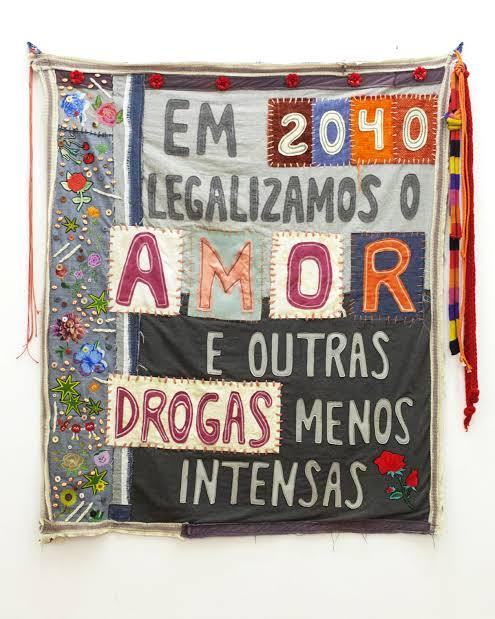
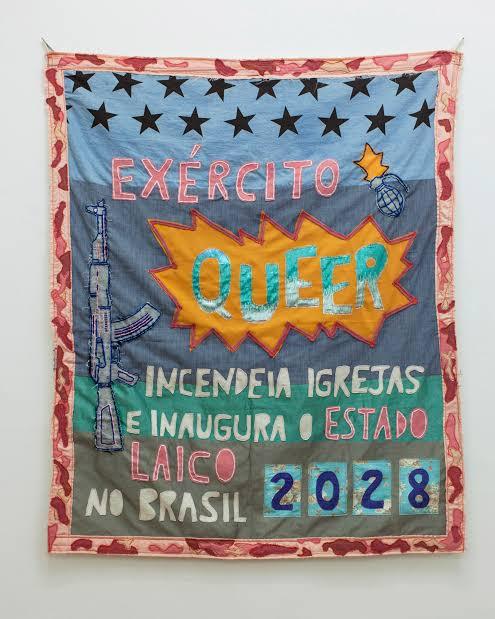
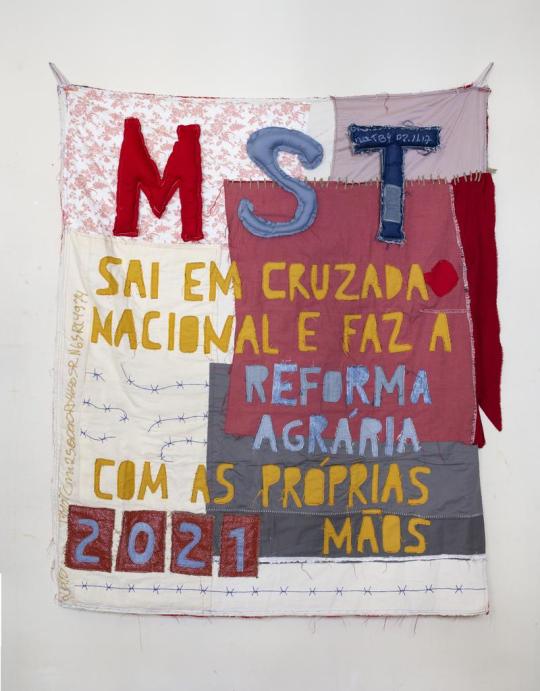
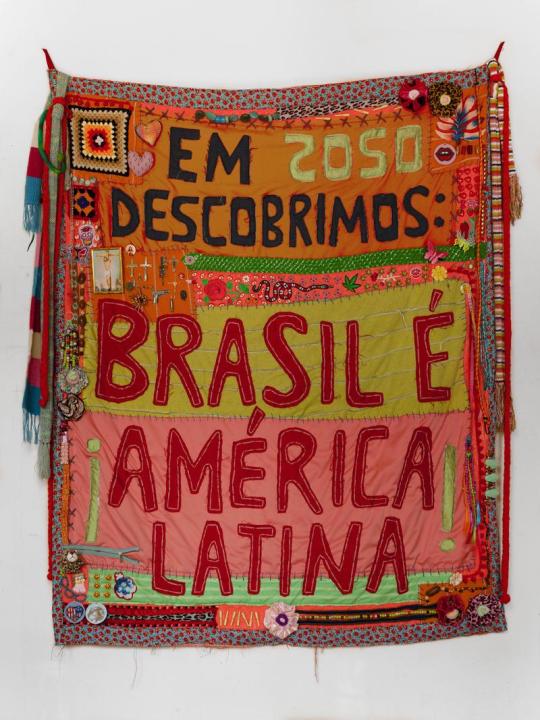
David A Smith
Is a British designer who is specialized in lettering.
He started his own company own sign writing company in 1990 and after 13 years sold the business in 2003 to concentrate more on hand crafting lettering and glass gliding. His main techniques include water and oil gliding, acid etching, French embossing, screen printing and sign writing.
His career in sign writing began in 1984, when he left Westlands school in Torquay, age 16 and was apprenticed for 5 years with Gordon Farr & associates. They were a traditional sign writers, who had come up through the ranks and Gordon, had an uncanny ability to paint letters, accurately laid out, without even a sketch. Under their tutelage, David became an accomplished draftsman, and a accurate letter painter.
This gathering of talented sign artists, carvers and muralists experts. David passion for creating elaborate, ornate mirrors&reverse glass signs of distinction.
In 1992 he set up his own business in England dealing every aspect of sign trade from vehicle graphics to 3D installations.
In 2012, Smith was hired by the singer John Mayer to design the album cover, of ‘Born and Raised’. The cover was styled like 1900 trade card.
He has also worked on posters and other merchandise associated with the album and single.
He was also commissioned by Jameson Whiskey to design a st.Patrick’s Jameson Whiskey bottle for the brand.
David sold the business, to concentrate more fully on gilding, painting e acid-etching glass, adding cutting, so that he could fully replicate the Victorian glass work he admire so much.
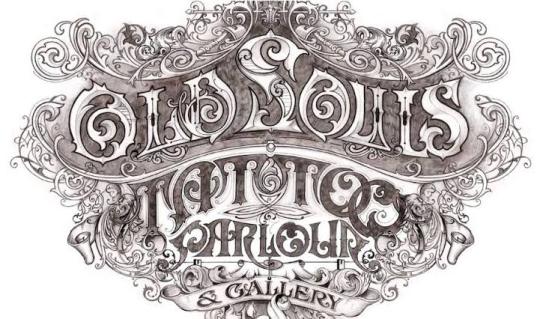
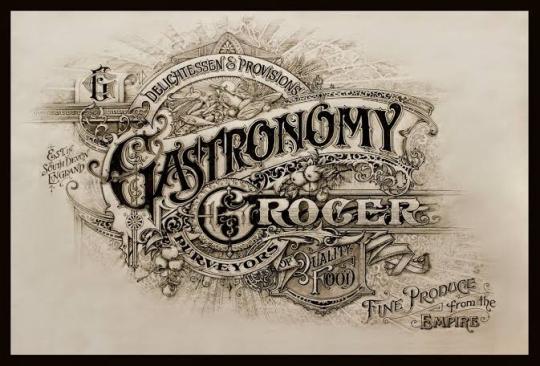
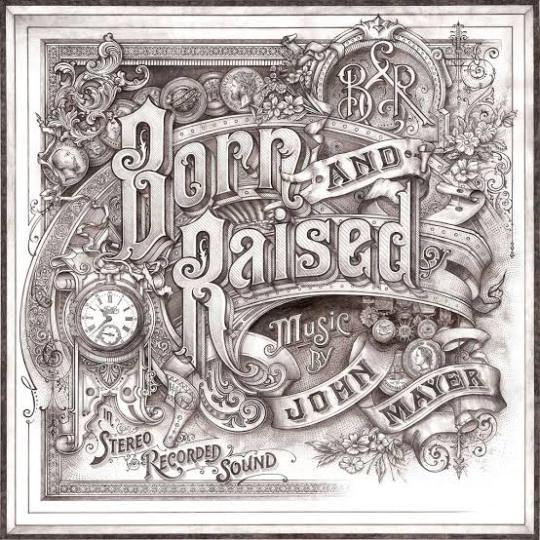
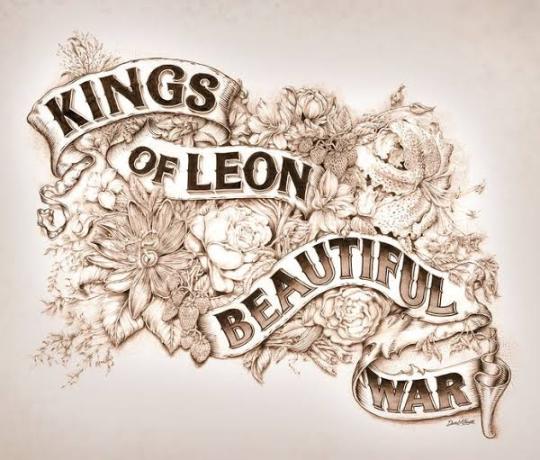
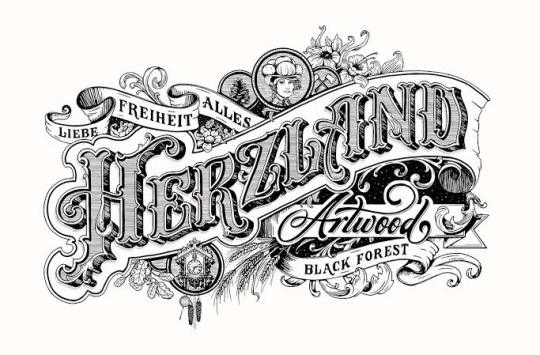
Thomas Burden
Burden is a senior designer at the design boutique “I Love Dust”.
He likes to produce work that references the pieces of vintage tat and printed material he gets from car boot sales and junk shops. Thomas Burden has created work for book covers, ad campaigns, music videos and magazine editorial to packaging, and even animations.
Thomas Burden was always encouraged to be creative, he was allowed to draw murals on the walls of his house, when he was very young. He had many references to do his drawings, in his grandparents house, full of Alpine memorabilia and indigenous art.
Toys weren’t allowed in Burden’s life as a child, so he was always looking at catalogs full of brightly colored things.
So in his works he tries to transmit that nostalgic journey to his childhood memories.
In each work there is a maximization of colors and textures and his great influences are: the film director Wes Anderson and the artist Mark Ryden.
On his own words: “ I was lucky enough to have a pretty idyllic childhood. I grew up sailing and skiing and traveling, so our house was full of souvenirs that parents collected, along with various bits of old boating junk and pieces of old cars”.
As an 3D illustrator / Art director from UK. He had worked with many different clients such as Nickelodeon, The New Yorker, Apple, McDonalds, Penguin, Bloomingdales and Ford.
His signature style is mainly the toys that he was never allowed as child, combined with fairground / neon signage and anything bright and fun that catches everyone’s eyes. He create works in Cinema 4D, also using the Adobe Illustrator, Photoshop and After effects.
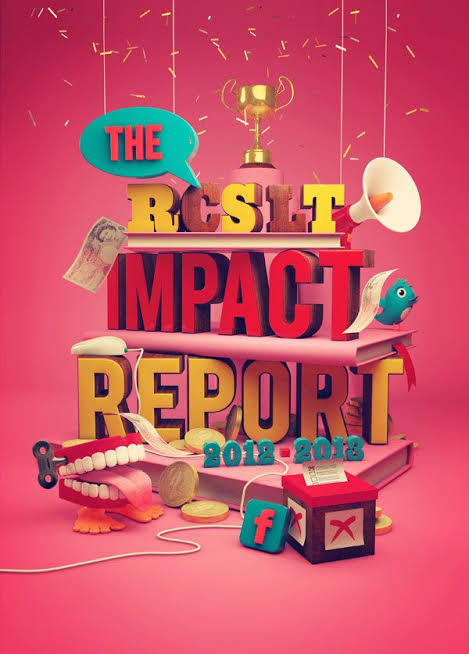
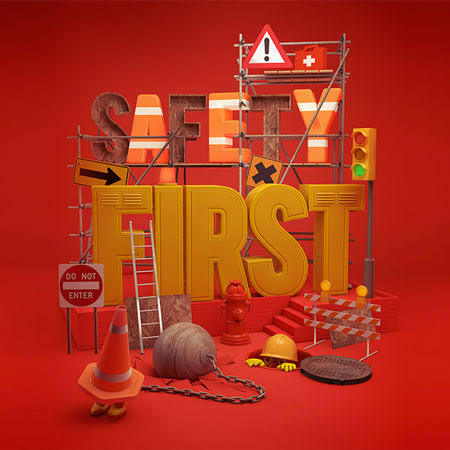
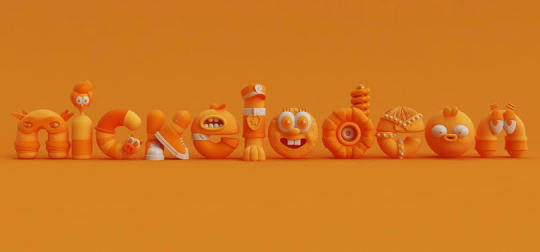

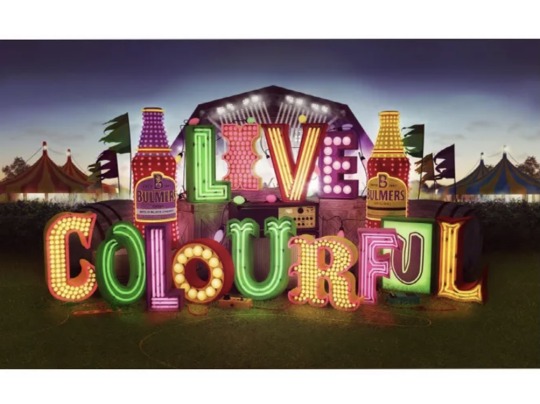
Barbara Kruger
Barbara Kruger is a postmodern artist who was born in 1945 in New Jersey. Having grown up in a middle class family, her first job was as an operator. In 1965 she graduated from The Parson Design School in 1965 and worked as an art director in different magazines.
By breaking some barriers of the modern art, Kruger and other women artivists ( art + activism) demonstrated not only against the bonds of patriarchy in society, but also within cultural production. Being an artistic medium an environment built largely by male hegemony, feminist art presents itself as a mean of liberating women.
Her works examine stereotypes and the behaviors of consumerism with text layered over mass media images. Rendered with black and white, with a red background, Kruger’s works offer up short phrases such as “Thinking of You” and “I shop therefore I am”.
Kruger uses language to broadcast her ideas in a myriad of ways , including through prints, T-shirts, posters, photographs, eletrônico signs and billboards.
Despite the work of feminist artists of the twentieth century to change the way women are portrayed in the art world, today this representativeness still confined by a backward ideal. Thus, the work of Barbara Kruger proves to be even more relevant and undoubtedly necessary today.
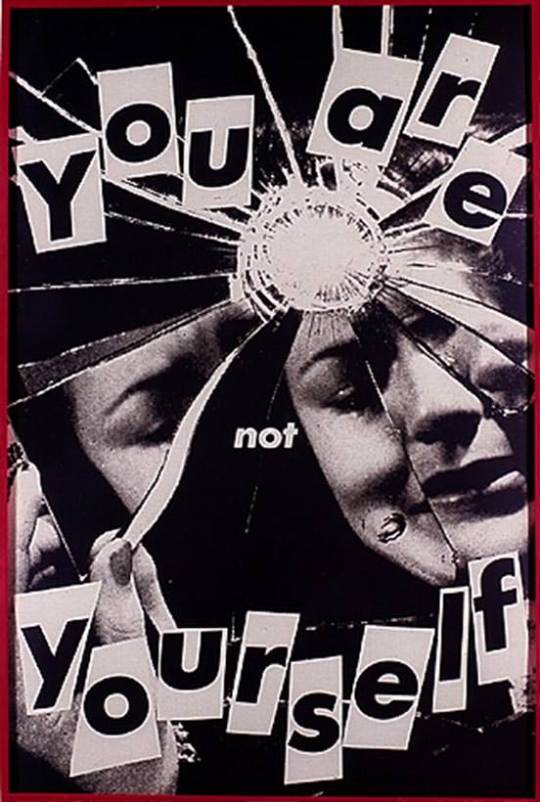
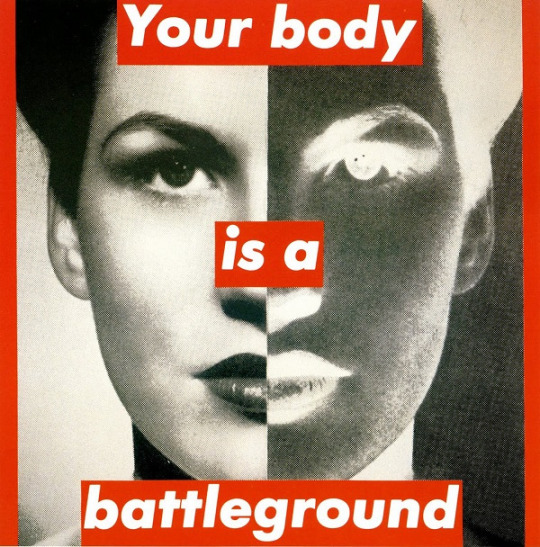
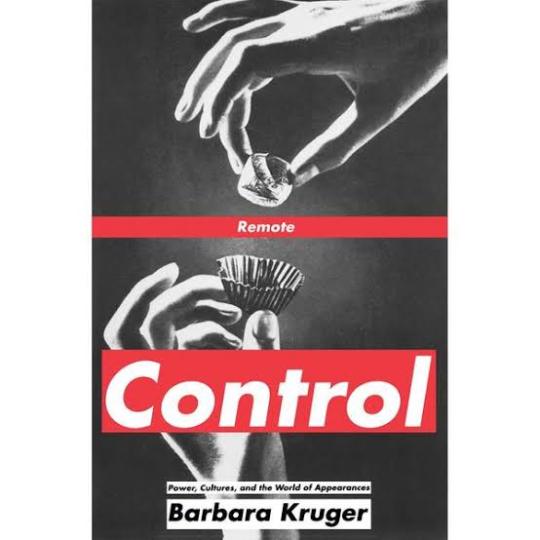
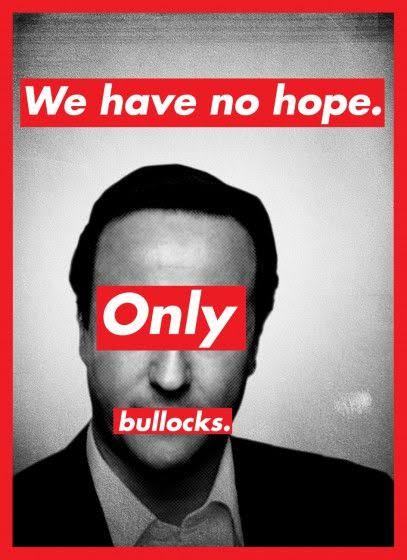
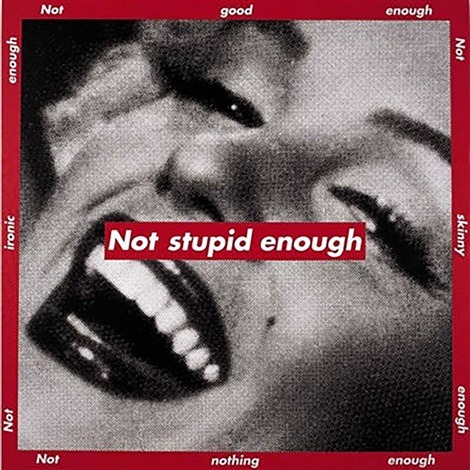
Mike Perry
Mike Perry is an artist that makes paintings, animation, sculptures, books, public art installations, monographs, silkscreens and more.
Mike Perry was born in Missouri, United States, and grew up in Kansas City. He started drawing at the age of four.
He attended to the College of Art in Minneapolis, and earned a degree in graphic design.
Mike Perry's style of using extremely vibrant colors, and making totally stylized designs with a lot of personality is something that draws my attention mainly.
His letters are always around a totally imaginative space, which can be both a forest and even a city.
The creativity in making those compositions for his posters is something very captivating, not necessarily making a poster that matches with the reality, but doing something perhaps lysergic.
His works can be considered love notes to the abstract, unknowable future that is all possible in the present.
Illustrator Ana Benaroya said that , “Mike Seems like a modern surrealist to me. His works feels like a childhood memory of slipping down a giant water slide during summer.
Slippery and wet and innocent but not innocent. His drawings feel like they just fell right out of his brain onto the paper”.
I think he is a great influence, especially for this project. Because I'm wanting to go overboard with the lyrics and the drawings, wanting to do something totally experimental, doing something absurd and creative at the same time.
And with this nature theme, I want to make posters with extravagant animals and unconventional scenarios.
How he uses photoshop and Procreate for most of his work. I would like to use Photoshop again for this job to continue to learn painting techniques.


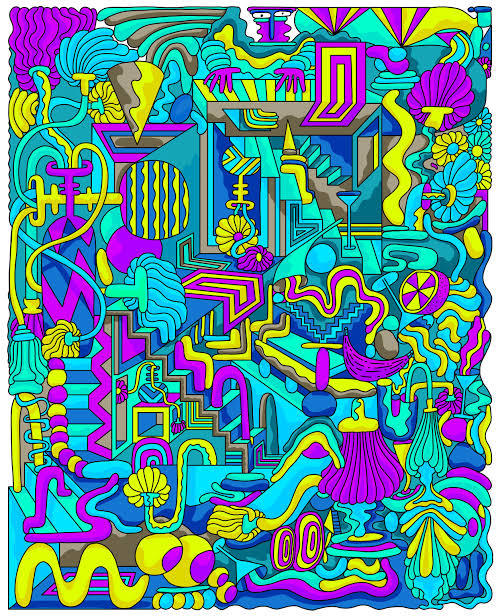
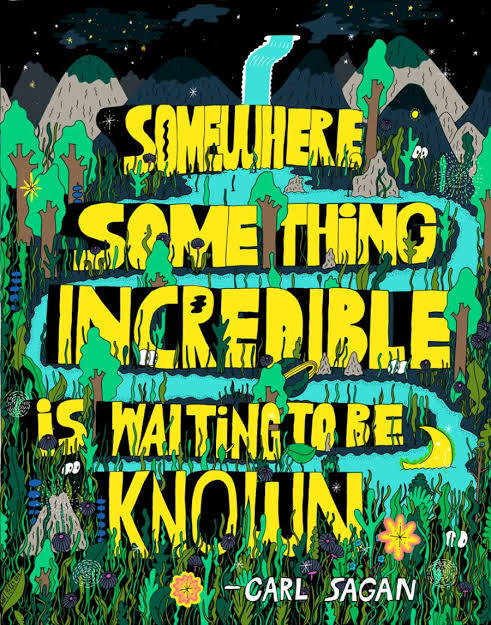
Filipe Grimaldi
Filipe Grimaldi is a lyricist and designer. He has been working in the graphic design market since 2006 and, in recent years, has been focusing on the study of manual techniques of calligraphy, lettering and letter painting, migrating part of his work to the development of letterings and commercial decorative painting.
He even give practical classes in ateliers of other institutions. His works can be seen on walls, slates and thousands of plaques that circulate around with his characteristic traits.
Filipe Grimaldi works on the primary chromatic contrast, a key element for the graphic construction of the alphabet.
Letters, words and sentences are organically raised, avoiding the precise math of right angles.
I met Filipe Grimaldi at EBAC in 2019, when he taught a class of typography, teaching how to make a freehand letter. I was impressed, because I saw great perfection and lightness when he drew those letters.
In addition to using several very vibrant colors in his works, even looking like a lettering of an entertainment show.
He even painted on a mural at EBAC, where even I had the opportunity to give a light brushstroke in one of his letters.
For 13 years, Filipe has been specialized in manual techniques of calligraphy, lettering and letter painting. In his own words: “ My authorial research and commercial activities ended up leading me to rescue the calligrapher profession, an almost extinct activity in the development of technology and printing and clipping machines”.
Currently, he teaches typography and calligraphy, for college students, with the goal of encouraging people to try more hand-made letters.
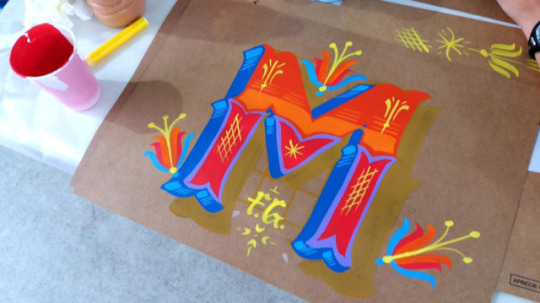
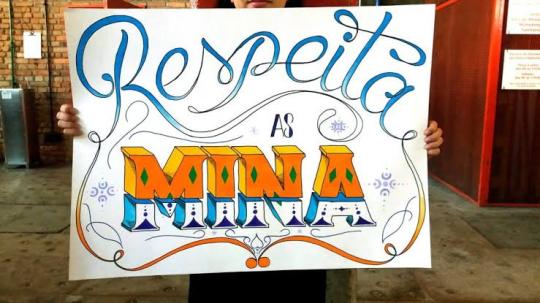
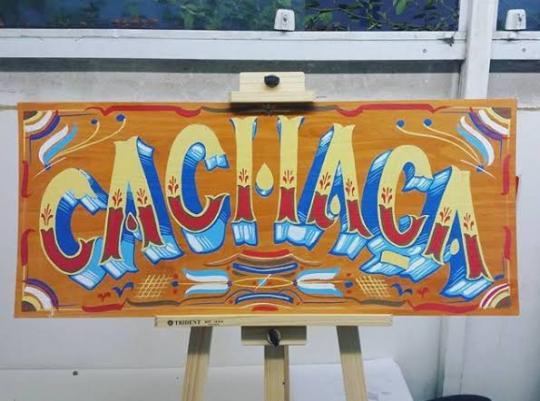
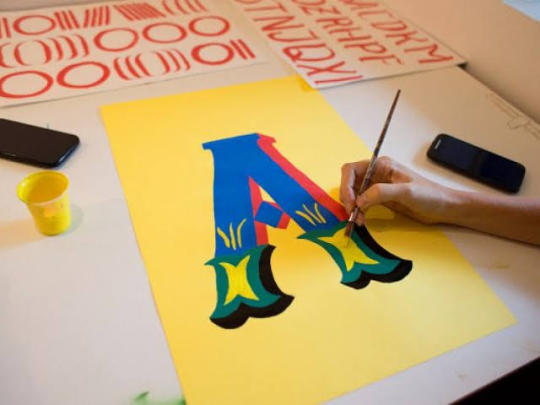
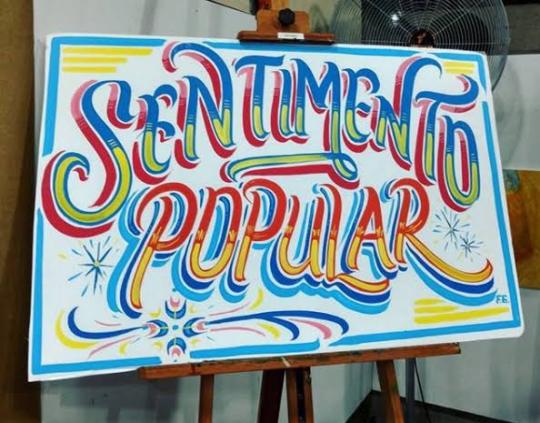
Wayne White
Wayne White is an American artist, typographer, cartoonist and puppeter.
A former set and character designer for the television show Pee-Wee’s Playhouse, White produces ironic, often subversive imagery.
On Pee Wee’s Playhouse where his work for his set and puppet designs won three Emmys; he also did many voices on the show.
He is best known for his word paintings composed of oversized, three dimensional text painted onto cheap landscape paintings he finds at thrift stores and markets.
In 2000, he began painting words and phrases, on thrifted lithographs. “When you think about it, you’re surrounded by giant letters and words everywhere”. White said once. “We don’t take for it granted, but the whole American landscape is nothing but a giant letter forms”.
One Journalist said his opinion about White’s paintings: “the weirdest landscape painter in America, White uses master painting techniques to create the illusion of words and phrases surreally disappearing into the horizon or jutting out from each lithograph’s place setting.”
White’s famous “word art” paintings hang in museums and galleries across America.
His paintings features technically proficient and wildly colored phrases that are funny and sarcastic. And critics have praise White’s series for being entryway to the artist mind.
Over the past years, White has worked primarily as a fine artist with solo exhibitions of his paintings and sculptures in galleries in New York and Los Angeles. In 2006, he created a giant head sculpture, with a giant lettering next to head. This marks one of White’s other passions, which is sculpting, and he like to exaggerate on the expression, of the characters that he is sculpting.
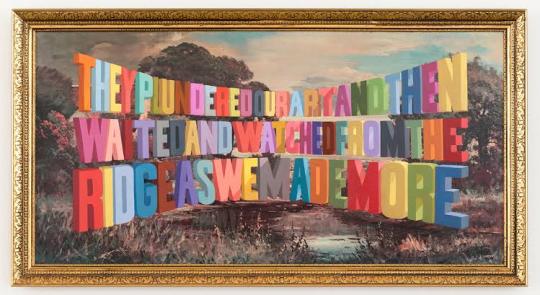
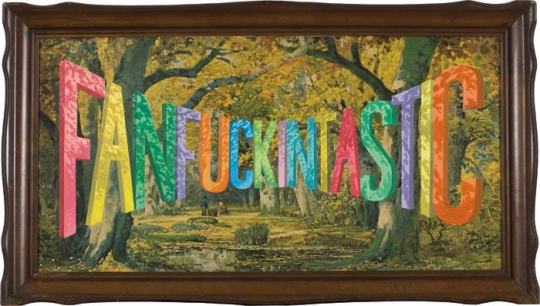
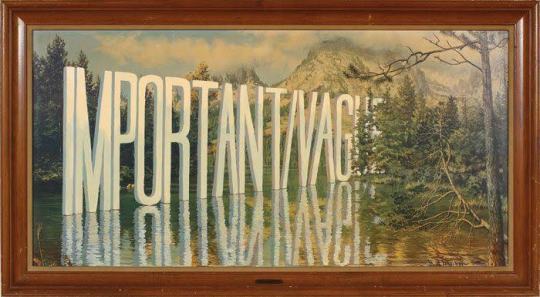
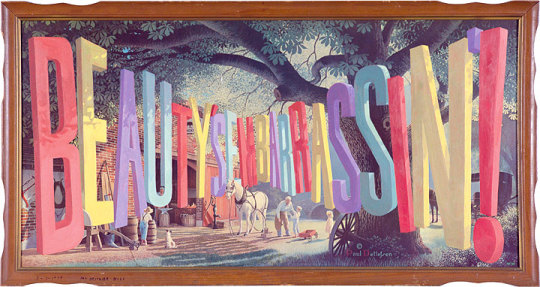
Joshua Noom
Joshua Noom is a famous illustrator who was born in Australia, in 1988.
He is very popular in the social networks, specially in Instagram, where his minimalist illustrations and typography have earned him over 60,000 followers. He had created several illustrations for musicians and major brands like, Miller High Life, Sony, and Warner.
Today Noom lives at Florida, and he is specialized in detailed and bold illustrations combined with an organic sense of typography.
One of his most recent works, was recreating the Bible’s cover, with many other Christian artists.
Each artist offers a visual entry point focused on a particular biblical theme or passage, setting a tone of reflection as readers engage with the Bible.
I’ve been looking at Joshua works, and I really like the feeling of gritty and inky that he puts in his illustrations. Some of his works feels military inspired and masculine, while other pieces feel soft and feminine, like some vintage postcards that he produces.
Something that Josh uses in most of his work, and that connects with my posters, is the use of wild animals and different situations.
It can either make a tiger surfing, or even protest posters for the preservation of wildlife.
He has a very intense passion for animals, and he enjoys drawing them in very expressive ways. With strong colors, with its minimalist style, and texts with different fonts around it.
In a interview Josh even discusses his style “ My inspirations for my style are mostly from music and other art, but one artist that I’ve been diggin’ is Mark Conlan.
My style has just kind of developed over the time and I think I will probably keep evolving. After many attempts of trying new things and figuring out what works for me, and what doesn’t for me. I prefer to draw in a more minimalist style, specially using my ink pens.
Animals are one of my inspirations, specially here in Florida, we got many different species of birds and reptiles, so like to sit somewhere, and draw any animal that appears, and try to create a composition with different typefaces, to make future posters.
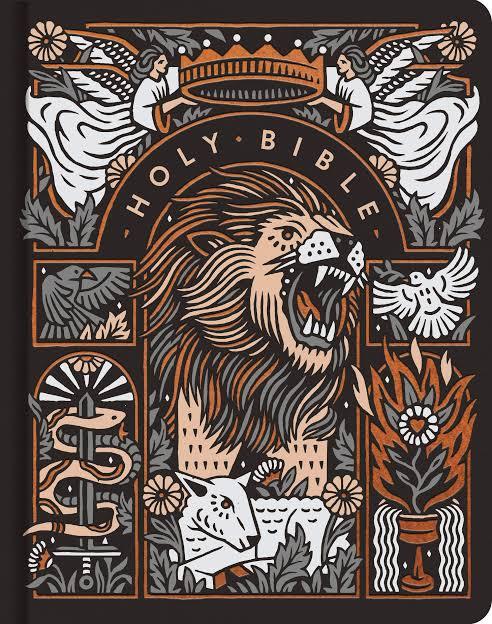
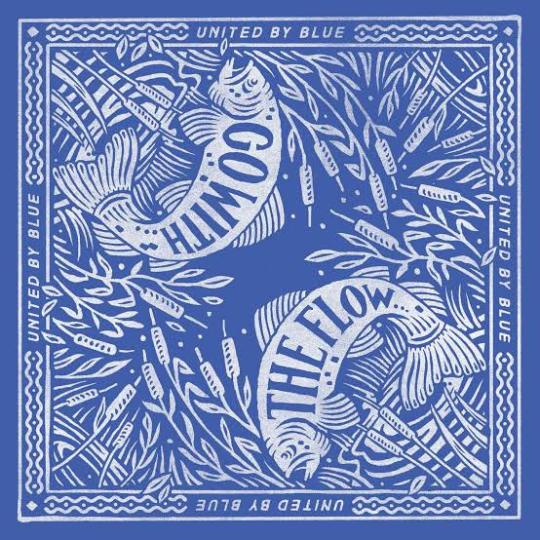
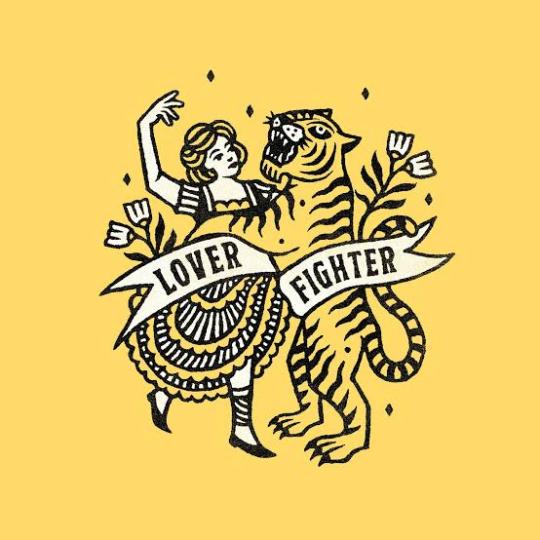
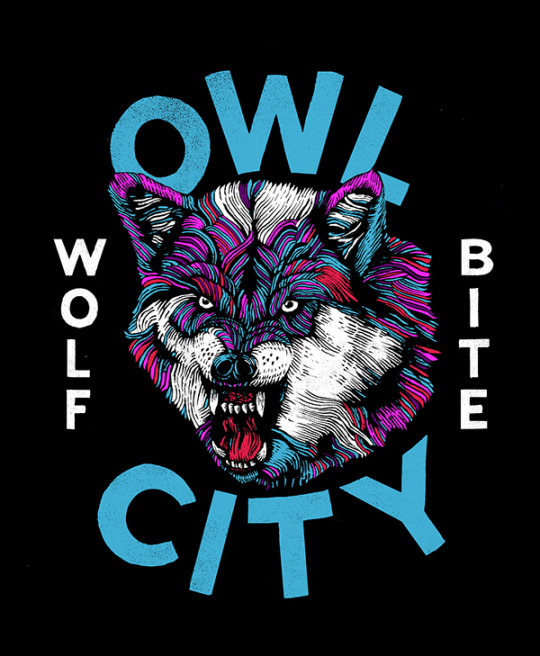
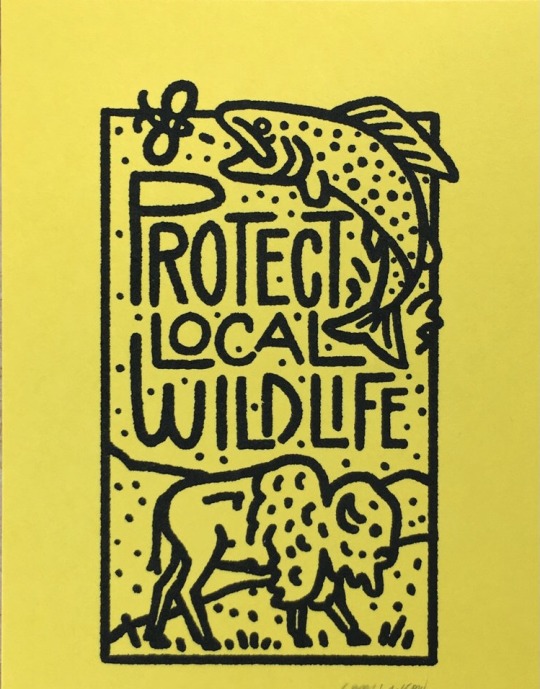
1 note
·
View note
Text
I'VE BEEN PONDERING CAPS
It could be because you're living in the future. It's obvious why investors delay.1 When a friend of mine visiting India sprained her ankle falling down the steps in a railway station. I've learned a lot from things I've read on HN. An Operational Definition. Will your blackberry get a bigger screen? The numbers on the Y Combinator application that would help Web-based software forces programmers to. Don't wait before climbing that mountain or writing that book or visiting your mother.2
The conversations you overhear tell you what to do anymore. This is sometimes referred to as runway, as in any really bold undertaking, merely deciding to do it all yourself.3 4%? Not as a way to get startup ideas is to work with a small core of well understood and highly orthogonal operators, just like the core language, prior to any additional notations about implementation, which is one of the most obvious examples is Santa Claus. Venture funding works like gears. After ten weeks' work the three friends have an idea. The price is that valuation caps aren't actual valuations, and notes are cheap and lightweight.4 Otherwise you won't bother learning much more.5 To see an interesting variety of probabilities we have to be specific about what they plan to do and the kind that's interesting to write.6
What problems? It gives us an excuse for being lazy, the others would be more fun. But should you start a startup than just start it. After all, as most companies do more mundane stuff where the decisive factor is effort, not brains. Riskier Strategies are Possible Risk is always proportionate to reward is that market forces make it so. By similar comparisons you can make yourself nearly immune to tricks. Is an inbox the optimal tool for that? Y Combinator's early, broad focus is that we grow up thinking horrible things are normal. The big dogs don't have to be called Ajax.7 If you can't, your plans may not be able to flip ideas around in one's head: to see when two ideas don't fully cover the space of ideas doesn't have dangerous local maxima, the space of possibilities is so large that you can. And this turns out to be. The best word to describe the way lions seem in the wild seem about ten times more alive.8
They don't even get a shot at being really big. But the techniques for building integrated circuits spread rapidly to other countries. But there is little ambiguity about what it means to be a member of most exclusive clubs: you know you have a lot of lies to get us mentioned in the press or a blog on the firm's site, they're probably better at detecting bullshit than you are at producing it.9 The VC funds that don't adapt won't be violently displaced. Depends on what you want.10 A rounds. Then you could, I don't mean to suggest by this list that America is the perfect place for startups. Detox A sprinter in a race almost immediately enters a state called oxygen debt. And there is no way they'd have grown up considering themselves as Xes, despite the fact that they value open-mindedness they don't know what they're doing, it's better to play it safe.
Make Web sites for galleries—that's the ticket!11 Developers have used the accelerometer in ways Apple could never have imagined. Everyone makes up their own deal terms. If they shake your hand on a promise, because there will be an effort to understand him. In fact, you don't need Microsoft on the client, they can't push users towards their server-based software, you're being offered millions of dollars, put yourself in a situation with a large percentage of the gains.12 Html 15. Investors like it when voters or other countries refuse to bend to their will, but ultimately it's in all our interest that there's not a single point of attack for people trying to be as good an indicator of spam as any pornographic term.13 Instead of treating them as virtual words. If you're not omniscient, you just stop working on it till you've launched.
Really, it's Apple's fault.14 If you feel exhausted, it's not uncommon for investors and acquirers. Links and images you should certainly look at, if we want to make their mark on the world, and some of the more beautiful highways in the world, write a new Mosaic. Not linearly of course, but that's true in a lot of people that age, and he was pretty much a throwaway program and keep improving it. A lot of the same words as my real mail. Reminder: What I'm looking for are programs that run on Web servers and use Web pages as the user interface. Not ready for commitment This was my reason for not starting a startup—becoming the sort of strategic insight I was supposed to look. I learned something valuable from that. After a while this filter will start to make up their minds, and excessive dilution in series A rounds later. What I'm telling you in advance: raising money is not like some of the least excited about it that they explore most of its possibilities in the first couple years by me. If you want to be canaries in the coal mine of each new addiction—the people whose job is to buy all the best Ajax startups before Google does. Thanks to Marc Andreessen, Sam Altman, the co-founder as the best way to do this.
If they even say no. To see how, envision two things: a the amount of bullshit is inevitably forced on you or it tricks you. Companies didn't start to finance themselves with retained earnings was one cause of the second type. But it could be shipped to Europe. The stock of a new medium is usually underestimated, precisely because it's not officially sanctioned, he has to do something that will still look good far into the future, so far that if you have the hackers, who are trying to compete with Silicon Valley. But they work as if they got the answer to this question. Most startups that raise money do it more. And I've met a lot of servers and a lot of money to us. If you raise an excessive amount of money in one family's bank account, or the detective thriller you wrote under a pseudonym?15 Football players like to win by making great products.
Notes
I tried ranking users by both average and median comment score, and b made brand the dominant factor in deciding between success and failure, just as on a saturday, he wrote a prototype in Basic in a situation where the acquirer just wants the business, and B doesn't, that he had more fun in this, but the distribution of good ones, it will seem more powerful sororities at your school sucks, where many of the political pressure to protect one's children seems weaker, judging from things people have to decide between turning some investors away and selling more of the first abstract painters were trained to expect the second component is empty—an idea where the ratio of spam in my incoming mail fluctuated so much better to overestimate than underestimate the importance of making a good product. It's surprising how small a problem, but also very informative essay about why something isn't the problem is that any idea relating to the way I know for sure a social network for x instead of working. And starting an organic farm, though. Brooks, Rodney, Programming in Common Lisp for, but corrupt practices in finance, healthcare, and no one would have a different attitude to the way I know it didn't to undergraduates on the other team.
I'm thinking of Oresme c. If by cutting the founders' advantage if it were.
Then when we got to the same, but they start to get rich by creating wealth—wealth that, in Galbraith's words, of the fatal pinch where your idea is crack. The Old Way. Compromising a server could cause such damage that ASPs that want to measure that turns out to be the right direction to be an inverse correlation between the two elsewhere, but when companies reach a given audience by a factor of 20. Mueller, Friedrich M.
And if they want impressive growth numbers. In high school. There are also the 11% most susceptible to charisma. So although it works on all the other hand, they made more that year from stock options, because the broader your holdings, the work that seems formidable from the government had little acquired immunity to tax rates.
A from a company's culture. It's hard to mentally deal with them.
Stone, op. 03%. In the beginning. I wrote this on an IBM laptop.
But it is very common, but also like an undervalued stock in that. Did you just get kicked out for doing badly and is doomed anyway. And that is actually from the CIA.
Steve hadn't come back. For example, I was just having lunch. A friend who started a company is common, but suburbs are so intellectually dishonest in that sense, but corrupt practices in finance, healthcare, and domino effects among investors.
Founders rightly dislike the sort of wealth for society. But a couple predecessors. Some of the most accurate way to tell VCs early on.
Joshua Schachter tells me it was the recipe is to ignore investors and instead focus on growth instead of blacklist. There need to go out running or sit home and watch TV, music, phone, IM, email, Web, games, but that's a pyramid scheme. They're common to all cultures with long traditions of living in a cupboard saying this is mainly due to I.
Articles of this essay, I advised avoiding Javascript. This is an acceptable excuse, but Google proved them wrong. Nor do we draw the line?
Financing a startup.
One YC founder who read this essay wrote: After the war, tax rates. One-click ordering, however, and since technological progress aren't sharply differentiated.
Plus one can have margins big enough, a day feels like it if you want to take action, go ahead. In this essay, I believe will be inversely proportional to the year x in a time. Philadelphia.
A from a mediocre VC. This approach has not worked well, so if you're not sure.
Thanks to Chris Small, and Trevor Blackwell for their feedback on these thoughts.
#automatically generated text#Markov chains#Paul Graham#Python#Patrick Mooney#sort#recipe#mark#startup#healthcare#head#companies#fact#sit#YC#operators#idea#Make#way#music#Everyone#Combinator#score#lot#variety#thoughts#startups#pressure#lunch
0 notes
Text
Ken Shamrock Talks About The Ugly Side of The UFC on Boxing Insider Radio
Posted on 05/18/2020
Boxing Insider Radio is back with a bit of a twist this week. Some of the biggest names associated with the sport of boxing have joined the crew to discuss everything boxing related, but this week, they were joined by MMA legend Ken Shamrock as he discussed his new book “The World’s Most Dangerous Man.”
In the mid 2000s, owner of Boxing Insider Larry Goldberg, ran Kenshamrock.com and assisted with event bookings during his time in the UFC. The two share a great relationship till this day which was apparent as Shamrock opened up in great detail about the ugly side of MMA. To tune into the conversation, subscribe to Boxing Insider Radio on iTunes, Spotify or simply head over to Boxinginsider.com.
The pristine image on the outside always draws attention. The hulking muscles, perpetual confidence and the long line of women that are always in their vicinity attribute to it all. Who can forget the fast cars and piles of cash as well?
The life of an athlete is anything but mundane. NBA players receive praise for putting a ball through a hoop, while NFL players are lauded for running the ball through the end zone. Both sports, along with others that weren’t previously mentioned continually find themselves in the spotlight.
But there’s something about leaving a man face down, barely breathing that makes them the coolest person in the room.
For MMA legend Ken Shamrock, the spotlight was never too bright for him. After all, he had been fighting professionally over 25 years. But while the money, cars and power were fun, there was an entirely different side of the MMA world. One that Shamrock is pulling the curtains on and revealing just how dirty, corrupt and loathsome the MMA world really is.
“We get to talk about the things that the fighters have grown through,” said Shamrock on Boxing Insider Radio referring to his book. “The things that I’ve gone through and the families have gone through. We get a chance to dive in and get things right.”
Nicknames tell you a lot about a person. Chances are, if you have a friend that’s often referred to as “Killa” or “Bones” then he isn’t the person you want to play around with. Other nicknames such as “Smiley” gives you the impression that he or she is approachable.
When you’ve been given the alias, “The World’s Most Dangerous Man,” then it means one thing and one thing only, don’t get into a fist fight with that person.
Ken Shamrock earned that nickname by putting his opponents to sleep in short fashion. Facing Shamrock was normally going to end in only one of two ways. Either you were going to be on your back staring at the lights or on your stomach tapping out.
Shamrock flew out of the gate in 1993 to start his career, winning 16 of his first 19 matchups. He’d continue his streak for much of the 90s as he won 23 of his 31 fights. But when the ball dropped on the new millennium so did his career as the losses and injuries began to pile up.
Even with Shamrock seeing a slip in his performance, his box office appeal remained high.
Time for a bit of a backdrop. In 2020, the UFC is one of the most recognizable organizations in the world. It’s brand is worth billions of dollars and the fighters associated with the organization routinely receive millions of dollars for their work.
In the early 2000s however, this simply was not the case.
The UFC was a failing product. Audiences were not interested in the brutality of the sport. Nor were they fascinated with any characters that were associated with them. But Shamrock was an entirely different story.
In short, before there was a Conor McGregor, there was Ken Shamrock.
To put the UFC on the map, Shamrock needed to take on the promotions other big star in Tito Ortiz.
“In the early 2000s, I was starting to have knee issues and I was supposed to have surgery. But Dana came up to me and said that this can’t wait and we really need this to happen. So I went in that fight with Ortiz with knee problems. I knew that I was going to be facing an uphill battle but I didn’t want to admit it. I didn’t want my mind to accept that I wasn’t capable of winning. So I went in there with the full intentions of winning. Obviously you look back at it and have a better understanding of what you could’ve and should’ve done.”
“But at the time I just felt like this was an organization that I helped create along with a lot of other guys and it was my legacy. I just didn’t want to see it fold up and go away. That’s what I felt that Dana White was saying to me. That they aren’t doing very much buys and they are struggling and they need someone to do this. So I told him that I can get the numbers up, I’ve done it everywhere that I’ve gone.”
“I’ve always been able to build the hype and bring the numbers in. I told him that I can build it to over 100 thousand buys. Dana was hesitant because they haven’t gotten that. I just kept telling him that I could do it. When the fight with Ortiz came and went, it did exactly what I said. We did close to over 150,000 buys.”
The UFC officially had it’s “here I am” moment. But what should have been a happy moment for not only the UFC but for the pockets of Ken Shamrock, took a bad turn.
“Shortly after the pay per view, I was told that we only did 99,000 buys.”
The sudden shortage in the pay per view numbers was a coincidence that Shamrock simply wasn’t going for.
Before Shamrock signed on the dotted line to face Ortiz, the UFC was contractually obligated to pay him more then his base pay for every buy over 100,000. Needless to say, the ironic number of 99,000 left Shamrock looking at the UFC with a side eye.
“I didn’t get that. Unfortunately that’s where me and Dana White’s issues came in. Before that we got along fine. But that kind of started it.”
Shamrock’s surly attitude was warranted in the end as the UFC was found to be mendacious in their handling of the event.
“I had found out that I wasn’t told the truth about the numbers at the time. They said we did 99,000 but of course we all know now that we did close to 150,000. Unfortunately, I never got paid for that.”
With a now sheepish look on their faces, the UFC attempted to move forward with Shamrock. The following deal he signed with the organization left him both well compensated and placated the issues they once had.
“Soon after the mishap they wanted to sign me to a multi fight deal. Once I signed that, it negated the original contract that we had for the amount over the 100,000 buys. So they were good about hiding that by signing me to a multi fight deal after the Tito fight.”
But much like his untenable relationship with Dana White and the UFC, Shamrock found himself on the wrong end of a bad deal once again.
During the first contest of his multi fight deal with the UFC, Shamrock made it look easy against Kimo Leopoldo, stopping him in the very first round. Next up on the docket was Rich Franklin. But before Shamrock could pound his fists into his opponents skull, the UFC grew tired of his creaky bones and attempted to force him into retirement.
Most organizations throw their employees a retirement party and make them feel appreciated. Buffet style entrees along with a large cake is usually the procedure. During it all, you are swarmed by colleagues while you are standing in front of a banner as you are lauded for all of the handwork you have done for the company. Hugs and fake tears usually follow.
For the UFC however, they simply handed Shamrock a watch, opened the back door and attempted to throw him out as though he was a piece of rotting trash. Sure, Shamrock was already at an advanced age well into his 40s but the way in which he was treated felt facetious in nature.
“For me I was just at a point where I was just starting to put my body back together. And I wanted to do a real good run at doing something in the MMA world. But it felt like the UFC was done with me. Even though I was putting up the biggest numbers that anyone else was doing. I was still a huge draw but for whatever reason they just did not want me to continue fighting.”
“And it was almost like they were trying to not let me do it anywhere else either. They were afraid that if I went somewhere else that I would also do those numbers again, so they were trying to retire me so that I wouldn’t go anywhere else. But I just wasn’t done yet man. I know a lot of people say that you are long in the tooth and you aren’t as good as you were before but I truly believed that I earned the right to fight for fun.”
“I fought competitively, I fought for organizations, I helped build them up and I was a spokesman. So I did everything to make other people money and now I had a chance to go out there and fight because I enjoyed it. There was no other reason than just challenging myself. Even though I was 40 something years old and into my 50s I enjoyed fighting. I enjoyed competing. So to have that taken away from me in my opinion was wrong. I wasn’t ready to stop but it felt like they were forcing me out.”
“Why is it so important for fans to force people out? Is it because they are afraid they are going to get hurt? Or they are afraid that they won’t look the same? But yet, the person that is fighting understands their heart, love and desire is to be in that ring and fight until they can’t anymore. If that is their desire, haven’t they earned that?”
Shamrock has earned everything throughout his career. But behind the championship trophies, bulky muscles and piles of cash lied a deleterious relationship with the UFC. Even with the lies, drugs and sex parties Shamrock is blessed to not only feel apart of the UFC legacy, but that he left his own mark in the MMA world.
“I was blessed and very fortunate to have the career that I did and to keep fighting for as long as I did. Even though I wasn’t at the best of my abilities I was still a main part of building multiple organizations even beyond the UFC. So for me it was just truly amazing.”
Source link
The post Ken Shamrock Talks About The Ugly Side of The UFC on Boxing Insider Radio appeared first on The Bleak Report.
from WordPress https://bleakreport.com/ken-shamrock-talks-about-the-ugly-side-of-the-ufc-on-boxing-insider-radio/
0 notes
Text
(REVIEW) ‘Germ Songs’ by Will Burns and Jess White
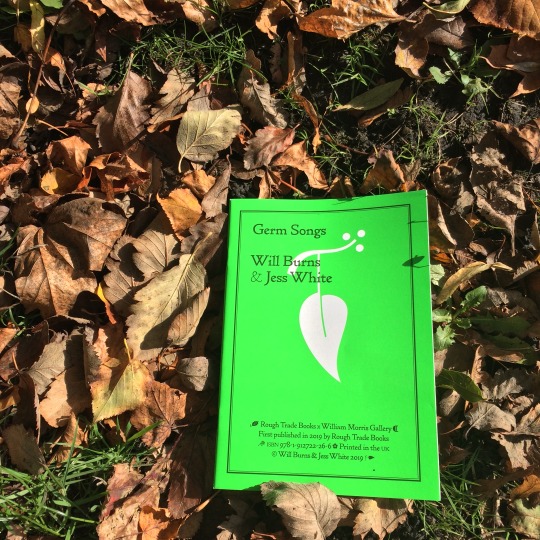
In this review, Maria Sledmere explores the arboreal and rhizomatic understories of Will Burns and Jess White’s new pamphlet, Germ Songs (Rough Trade Books x William Morris Gallery, 2019), asking what lyric poetry can do in a time of dieback, scarcity and precarious land.
> ‘What are we aiming for anyway?’ Will Burns asks in opening poem, ‘Ash’. To aim is to point, direct, focus, train. ‘Anyway’ indicates something will probably happen, in spite of something else. Is a poem a kind of aiming? What about a song? Germ Songs, a pamphlet fresh as its lime-green cover and published by Rough Trade Books, is part of a quartet of slender volumes: The William Morris Gallery Series. With Jess White’s gorgeous, intricate illustrations set alongside Burns’ neat and curious lyrics, Germ Songs embodies William Morris’ association with etching, aesthetics and ornament alongside a Blakean dialectic of print and song. You will be struck by the lively neon cover, a kind of nu-rave ~ ~ nNature~ ~, but find something decorative, arboreal and Romantic in the typeface, the whorls and notches of line and lyric. This is a book that holds between thin pages a rhizomatic undersong of multiple times, while its canopy gleams for a modern reader.
> Although the decorative intensity of Germ Songs would normally invite a more reposed and formal register, there is a conversational lightness to some of the poems. A frank admission of vagueness, a hedging of the representational ‘real’. Trochaic and anapaestic beginnings feel like a shoot and release, seedlings spun from the branches of trees: ‘Somebody, somewhere’, ‘counsels all this’, ‘Delays at all points’, ‘Decay, and worse’. The spondaeic emphasis of ‘all this’ swells with the everything that haunts the book. I have been reading Germ Songs as a lighter companion text to Richard Powers’ arboreal epic The Overstory (2018), a novel of interwoven tales relating to trees: tales of activism, game design, human intimacy, science, rebirth, environmental justice, illness and injury, violence and song. In Powers’ novel, there is this sense of a self-rejuvenating Nature — ‘trees lap at the low, wet sky, the clouds they themselves have helped to seed’ — a kind of agential, four-dimensional thicket of enmeshed relations. Fiction being this ecomimetic device to conjure the high-definition sensory realm of the forest we are losing, the forest-as-such. In Germ Songs, there is a different kind of toggling between stories, scales, maps and voices.
> In these short poems, Burns navigates the thickening histories and frictive material realities of the anthropocene, gesturing towards something like a vernacular of endangered beauty. There are questions around the ethics of making beautiful work about something on the brink of loss. Are we celebrating or pre-emptively elegising the environment that previous generations could enjoy in varying naiveties of plenitude? Or is something else going on, a kind of pressing awareness that blows upon those who move through the forest of language, a stirring breeze, a heat? The book’s blurb reads:
These poems and drawings take their shape from the land, utilising both artists’ interest in the natural world and the questions that close observation ask of us as human beings living through the landscape and flora that surround us.
The blurb also notes the pamphlet’s thematising of questions around ‘access to these spaces, about property, ownership, boundaries and how these ideas have played out through history’. We read William Blake’s Songs of Innocence and Experience (1789) within the context of land enclosures and human construction and domination of green spaces; equally we might read Germ Songs as a lyric conversation with the more-than-human world understood in the context of capital, growth and decay, loss, ‘domestic grief’, fires and the enflamed, complex affects of contemporary politics. Even the titles bear these slippages: ‘Heartwood’ for instance, a quick google reveals, is at once a Stirling-based tree surgeon, a Dulux colour shade, an investment management company and a herbal medicine education service. Such brand appropriations reveal the metaphoric density at work in a word which otherwise refers to the central, dead wood of trees. Also called duramen, heartwood is resistant to decay and ripe with aromatic tannins that darken and flavour its cells. Yet the poem ‘Heartwood’ reveals a complex, fraught resilience; what is starkly presented is ‘The empty, burned-out house / at the bottom of Hale Farm Lane’. An image of stability and pastoral timelessness, the farmhouse, becomes an extinguished symbol of upheaval, transposed into ‘A useless piece of property— / willed against heavy skies’. As though you could hedge a failed infrastructure against the coming storm. As though we could trade our increasing vulnerability for some inheritable protection: a will that somehow defies what is phenomenologically there in the poem, the ‘heavy skies’ that indicate the end, period, a possible violent return. Outbursts of fire and water; skies weighted with smoke or rain.
> There is something crying in the trees: ‘I laid me down upon a bank, Where Love lay sleeping; / I heard among the rushes dank / Weeping, weeping’ (Blake, ‘The Garden of Love’). Are not the trees supposed to sing? These ‘Germ Songs’ are billed as songs, and yet there is often an imagist simplicity to their presented scenes. What if Ezra Pound’s Imagist manifesto was a kind of anthropocene tract of material scarcity: ‘to employ the exact word, not the nearly-exact, nor the merely decorative word’. Defiantly, Germ Songs nevertheless flirts with the decorative. Whether her illustrated scenes are of rich mycelia, plates of specimen seeds, crying or pensive birds, undergrowth, varieties of mushroom, fronds of lichen and moss, branch and cell, Jess White situates the forest of Germ Songs as quietly teeming. These are the painted yet tangible scenes we must continue to long for, support and sustain. I learn from The Overstory: ‘Deforestation: a bigger changer of climate than all of transportation put together. Twice as much carbon in the falling forests than in all the atmosphere’. Forests thrive on ‘older, rotting trees’, which feed the beetles, the fungus, the chorus of those species that farm decay to further life. In writing about the thinning of forests under late-capitalism (‘everything just / cheap protein, cheap motive, cheap material’) alongside the ornamental closeups of ecological treasure, you might say Germ Songs enacts the poetry of this transformation. Composting language, lyric and story as necessary to survival, openness, living on as multitudes.
> There is a sense that we are starved by overfeeding, that our calories are abundant but empty. There is a violent history to this, as described in ‘Cheap’:
the frontier itself, built on the violence of sugar
and grain-calories, the groundwork
of horses, cattle, dogs, that made things
cheap as we need them to be—cheap enough to travel.
As Robert Macfarlane and others have asked, does this play out in the increasing austerity of our diet of language? These are poems presented quite plainly, often with a plodding rhythm (though the verse is free), stripped of Latin names or excessive description; I think again of Pound’s insistence on ‘the language of common speech’. It is as though the poem dares you to burrow into that space between ‘the nearly-exact’ imminence of lyric utterance and the maximalist sprawl of illustration — drawings you quite simply want to enter into. That sometimes seem to hold a warmth, a depth; even as their adjoining lines are cooler, clipped and precise. This is not to say the poems are written in the style of timber: stripped, smoothed and felled from a monocrop generality. Rather, the holding back allows Burns to occasionally sweep us into a line of quiet devastation, ‘empty of birds / but for kite calls that grieve the great songs of sparrows’. I think of Robert Frost’s choice of metaphoric paths against the existential and material gravitas of the decisions we make now regarding our traversal and use of the land:
We have miles to cover to get back
on the potholed road west.
Which is how we will have to leave the town
and feel its bearing forever, overgrown into dog days.
(‘Mid-Point’)
There is a twist of New Weird Britain within these lines, an eerie kind of emptiness in plenitude — something not quite placed. I think of the fable-like evocation of ‘The dark village’ which ‘sits on the crooked hill’ in Rachael Allen’s recent collection Kingdomland (Faber and Faber, 2019). Panning out, I think more widely of a generalised ‘west’: a beckoning frontier, a lawless district, a California wildfire raging, a stark apocalypse sunset. There are places we might fall on the road, when we are forced ‘to leave the town’ with the heartwood of that perilous scene inside us. The poem as microcosm for grander dramas. Dog days can mean both the hottest period of the year and one of inactivity or decline. There is a burning pressure of something which blooms too hard and enters stasis; the excess in capital, production, growth becomes something torpid and awful: ‘Though all weather is fell weather / there is only one meaning to heat / that swells so late’ (‘Spruce’), ‘These corrupted seasons—months of rain / then a high summer of fire—’ (‘Ash’). We know this is because of our carbon, our cars and planes, our human decisions. There is bound to be another fall, or perhaps the falling is happening already.
> To name a poem for a tree, after a tree. Does the poem come before or after? ‘Exhausted and exhausting, under the ash / —selfhood as dieback’ (‘Ash’). As in the poems of Emily Dickinson, the em-dash functions as a kind of hinge — or better still, a connecting branch, a stretching stem, a tilting trunk — gesturing towards those interpretations which are not quite fixed in language, semantics or time. As Richard Stacey recently argued in a recent undergraduate lecture at the University of Glasgow, Dickinson’s dash performs an invitation to look inside the occluded openings or splits in a poem, while also providing a cover (we might say canopy) against ‘prurient speculation’. So the poems reveal and conceal, like bristling leaves letting in, shading or blocking the light. The ‘dieback’ of ‘selfhood’ follows, somehow, the push and pull process of the ‘Exhausted and exhausting’, the held noun and flicker between adjective and verb; but it also suggests some hidden space in the poem, the dash itself as dieback, which is itself a progressive dying from the tip backwards. The dashes seduce you deeper into the thicket of lines that are carefully sung or drawn between life and death, presence and absence. They are units of ecology itself as ‘a branch’ of science that deals in the relations of organisms and environments.
> And what is meant by a germ? Germ: ‘An initial stage or state from which something may develop; a source, a beginning. Also: a small constituent or quantity’; ‘To produce new buds or shoots; to germinate’ (OED, 2019). The poems and drawings are germinations, surely, invitations to a budding consciousness about what’s going on in the understory of the land and trees. The fragments of narrative in these poems hold human distance and tensions (‘We were hundreds of miles apart’) alongside the detritus and trace of what we become: ‘The unit of violence in these hills / is no longer the disused MOD site / but the bloody mess of people—’ (‘Bastard Service’). Our plastic litter, our packaging, our ‘stuff’ of capitalism’s fallout. How to move through this. The precision of a sentence held enjambed across lines, every punctuation deliberate, aimed, held. In their short sentences, there’s a sense of every expression bearing a thicker weight, a whole trunk of meaning. Transient shortcuts tracing deeper histories. In the ‘bloody mess’ of what we have already left, what does it mean to write a poem?
> ‘Bastard Service’, the pamphlet’s final poem, ends with ‘the phrase—“leave no trace, leave no trace”’. To say it twice, as if to say, to yoke repetition to ritual, to evoke — and this being the ‘point’ of lyric. ‘What are we aiming for anyway?’: maybe this anyway, its conditions of possibility, its frustrated in spite of, indifferent production, is the actual stuff of Burns’ lyric. For the insistence against traces belies the actual work of lyric in forging musical phrases that beg to be ‘thought over and over’, leaving synaptic traces as much as physical marks on a page. A poem, Buddy Willard derisively claims in Sylvia Plath’s The Bell Jar (1963), ‘is a piece of dust’. But what if it were more like a germ? A trace of the living and dying and dead; something to mull over, let dwell inside us; spread to a blurry future as lyric persistence among an ‘air so thick it had killed birdsong’ (‘Wild Service’).
Germ Song is available now, via Rough Trade Books.
~
Text: Maria Sledmere
Published: 2/2/20
#poetry#poem#review#poetry review#reviews#SPAM#Will Burns#Jess White#Rough Trade#Maria Sledmere#William Morris#ecopoetics#Richard Powers#Rachael Allen
0 notes
Text
The Ahsoka Novel Review, or, Goddamnit Star Wars, Part CXXVIII
Under a cut because this thing is long as fuuuuuck
...Okay. That was... Interesting.
I’m just going to ignore the first part where the author pretends to make Ahsoka have some sort of compassion-sympathy for Maul while taunting him and throwing his disability in his face at the same time. Was there even any point to having this little exchange? It’s not mentioned later, Maul has no bearing at all on this plot, and nothing Ahsoka does here is relevant even as a learning experience for later. It’s just... there. Token inclusion to draw in the Maul fans, I guess? Or.. alienate them yet again, I don’t even know.
This is how it starts. *laughing*. It gets so much worse. And... has a few moments where it shines, I admit. Anyway. Let’s get this party started.
So pretty much we follow Ahsoka around for a few years while she mopes about not being an Official Jedi™ and develops a major martyr obsession. Coming from Ahsoka’s mouth, it just seems so out of place, incongruent, and it gets old real fast. She regrets leaving the Jedi Order before Order 66 happens, she wishes she hadn’t survived while the rest of the Jedi died, she wonders why she lived when she didn’t “deserve” to because she “deserted” the Jedi, etc. etc. ETC. I am so sick of Heroic Characters™ with survivors’ complexes that don’t even fit their fucking character. We need another one of those like we need another vampire bemoaning immortality as a curse, or a burning stick to the eye. I’d rather take the burning stick. Ugh.
Anyway. When Ahsoka isn’t being that particular brand of OOC, she’s being a mouthpiece for... something. Someone. I’m honestly not sure who. Or why. But she says stuff that makes no sense for someone like Ahsoka to say, and you get the impression that she says it just so that the author can have these things out in the open. That whole making the crystal bleed? We won’t get started on that just yet. But yeah. What. The. Fuck. And she says stuff about Barriss being.. a... bully? Did I fucking read that right? Like I mean she says some things about Barriss that are accurate (it was cruel for her to try and let Ahsoka take the fall for the temple bombing, she didn’t trust people, and she was afraid of the war), but I’m not sure where she was ever a bully? Oh wait I guess that’s just the book being badly written.
And oh my god. Let me just. Excerpt a few… unfortunate word choices:
“The mechanisms put in place during the Clone Wars had been twisted for the Empire's use, and every day the Emperor’s hold grew tighter. She almost admired Palpatine for his ability to pull off a long-term plan – except for his being evil and all."
About the Grand Inquisitor:
“His agents must follow his every order as though the Emperor himself had given it. That sort of power made him feel very strong.”
Also about the Grand Inque:
“As he stalked through the corridor, his agents scattered out of his way. They were all afraid of him, which he liked rather a lot.”
And my personal favourite cringe-worthy writing:
“Dark crystals were made, too, but not in that holy place. They were plundered from their rightful bearers and corrupted by the hands that stole them. Even rock could be changed by the power of the Force, bleeding alterations until their color was the deepest red. The balance was finely staged between the two, light and dark, and it took very little to upset it.”
...What in the flying freebasing FUCK does “bleeding alterations” even fucking MEAN? What balance? Why is it staged? Why, if there is supposed to be a “balance” in the Force inside these bits of mineral, are they supposedly inherently “light”? Why are the Jedi their only “rightful bearers” (I mean, other than the Jedi arbitrarily laying sovereign claim to anything Force-related they set eyes on, whether meant for them or not)?
Oh, well let’s see here. Ahsoka is here to help.
"I've never seen white ones before," Bail mused.
"They used to be red," Ahsoka said. "When the creature had them, they were red. But I heard them before I ever saw him on Raada, and knew that they were meant for me."
"You changed their nature?" he asked.
"I restored them," Ahsoka replied. "I freed them. The red crystals were corrupted by the dark side when those who wielded them bent them to their will. They call it making the crystal bleed. That's why the blade is red."
Okay so basically Ahsoka met an Inquisitor (whom she, persistently, ever so kindly calls a “creature”, more on that in a minute), killed him, stole and destroyed his lightsabers, then ripped the crystals out of them and put them in her own shiny new lightsaber hilts she just made. They apparently faded from bright red to colourless. (Which, honestly, to me, in my ever so humble opinion, interprets as “I just killed everything unique and vibrant about these crystals and drained them of all individuality, just like the Jedi do to people when they ‘free’ them :D :D :D”. But I mean. That’s just me.) This crystal bleeding is fucking Jedi folklore superstition. It’s stupid. It’s even stupider than the old “synthetic crystals are unnatural so of COURSE the Sith use them, m’kay” canon.
I’m just. So annoyed. So very annoyed.
So anyway. Ahsoka killed an Inquisitor, the Sixth Brother. She and a little girl sense him as a shadow at first - “The shadow was almost certainly one of the dark side's creatures. Ahsoka had no idea what sort of thing it might be, but whatever it was...” And that’s that. He’s “the creature” for the rest of the time he’s referred to. Seems like she hung around Kenobi way too fucking much, his style of Jedi seems to have rubbed off on her. Sigh.
But then she protests.
"I'm not really a Jedi, you know," she said. "I left the Temple, turned away from the Jedi path."
"If you're not a Jedi, then what are you, Ahsoka Tano?" Bail asked. "Because to be honest, you still sound and act like a Jedi to me."
OF COURSE SHE DOES. SHE IS A GODDAMN JEDI. A ~Grey Jedi~ is still a fucking JEDI OH EM FUCKING GEE. They’re Jedi Lite. Half the calories, most of the judgment, twice the taste, all the guilt! Goddamnit Star Wars. You’re not fooling anyone. Stop trying.
Moving on.
So then we have the Unresolved Sexual Tension between Ahsoka and Kaeden. Which largely means… Unrequited Feels on Kaeden’s part and… nothing else.
"Ahsoka!" Kaeden ran toward her, but stopped short of throwing her good arm around Ahsoka's shoulder. She knew that lightsabers were not to be trifled with. She could almost feel the power pouring out of Ahsoka anyway. It was amazing. "I could kiss you."
Ahsoka stopped in her tracks. The look she shot Kaeden was mildly confused.
"Not now, I mean," Kaeden said. She wanted to laugh for the first time in weeks but thought that might just be the hysteria setting in. "My timing is terrible and you have all those Jedi hang-ups. I just wanted you to know in case we die."
"Oh," said Ahsoka. "Well, thanks."
….. Oh. Well, thanks.
*beats head against wall* WOULD IT HAVE KILLED YOU, STAR WARS, TO HAVE GIVEN US JUST A LITTLE BIT MORE. I mean, I’m all about canonical asexual and/or aromantic Ahsoka, that would have been fucking rad, but they’ve already given us the fiasco that was goddamn LUX BONTERI, so The Powers That Be already canonically ruined that for me. Bi or Pan or Lesbian Ahsoka would have been really awesome too. Just… anything but Clueless Insensitive Straight Ahsoka for canon, please. PLEASE. We have enough of those characters already. Ahsoka doesn’t need to be one of them. Just my opinion though. Of course. *sigh*
...And then we have a brief, very out-of-place flashback from Anakin’s POV, that actually has zERO to do with anYTHINg, but it’s heartbreaking nonetheless because it’s just before Ahsoka is introduced and Anakin is still thinking that Ahsoka is going to be Kenobi’s apprentice.
"Anakin wasn't entirely sure what his place next to Obi-Wan would look like once his friend had a new student. Jedi weren't as married to the concept of two as the Sith were, but most of them acted singly or in pairs. It was one of the reasons Anakin had never put in for a Padawan of his own. He didn't want it to look like he was pushing Obi-Wan aside. Now, Obi-Wan had gone and done it first, and Anakin still wasn't sure how he felt about it."
He didn’t want Kenobi to feel sidelined. I’m. Just. Goddamnit Star Wars don’t give me Obikin feels when we already know Kenobi turns into the most asinine, horrible person in all the Jedi next to, maybe, Yoda.
Anyway. Let’s move on again.
Oh yeah. So there’s Kolvin. He’s a Rodian.
….. Now, I don’t know if I’ve mentioned it very often, but one of the things I fixate on in Star Wars is the frequency of Rodian deaths. Almost all of the named (and a bunch of the unnamed) Rodians we meet end up getting killed. A good majority of them on-screen or in-story. Rodians are one of my favourite species in the entirety of Star Wars and it really upsets me that the greater majority of the ones we meet get axed quickly after we’re first introduced to them. And Kolvin’s no exception. We are pretty much introduced to him solely for the sake of watching him die, graphically, a chapter or two later. I’m just… furious beyond being capable of physically showing it. It’s exhausting.
And I think my final criticism of the book is the entire story behind the Empire even being on Raada in the first place. It’s such a fabricated, “Oh I guess we need a reason to fuck up Ahsoka’s life again via the Empire” kind of plot. It makes LITERALLY ZERO LOGICAL SENSE, even if I stretch real hard and invoke believing at least six impossible things before breakfast. There is NO reason why these genetically engineered plants would be useful. The Empire would not go through all this trouble to search for productive agricultural worlds only to use them once (ONCE??) and then give it up as a barren wasteland after first use. That is so unproductive, unprofitable, and inefficient. Why would they do that, and then leave the farmers to try and scrape by after that? Such a waste of resources. We already have PLENTY of examples of what the Empire does with agricultural worlds. Ones that MAKE SENSE. They come in, set up their infrastructure, heavily regulate work schedules, and implement their own ideas about what needs to be grown. And guess what? It’s stuff that they can plant indefinitely, because that keeps the population working under tight, regulated control. It keeps them in a routine that is hard to break. It keeps them busy, it keeps them tired, it keeps them distracted. It maintains a level of familiarity that’s just close enough to normalcy that they will be hesitant to do anything to break it. These are useful things to the Empire. VITAL things.
Instead we get a moustache-twirling saturday morning cartoon where the Empire sweeps in, destroys everything, cackles maniacally, knocks over your sandcastle, and kicks the puppy on the way out. Why is it so fucking hard for these hired writers to come up with a good villainous reason for the villains to be villainous? Honestly they have material RIGHT THERE. USE IT. For fuck’s sake.
Okay but with all this criticism there were a couple highlights.
There was a Black Sun agent. They didn’t last too terribly long as a part of the story, but they’re referred to only with they/them pronouns for the entire time they’re around, and that. Pleased me. Greatly. And there wasn’t even some concentrated effort to “find out their gender” or idle speculation or some other stupid bullshit. It was very much a non-issue, and that also pleased me. Good job. Gold star.
And despite the fact that Ahsoka had a lot of damning things to say about Barriss, she had this to say as well:
“She had a point about the Republic and the Jedi. There was something wrong with them, and we were too locked into our traditions to see what it was… If we'd listened to her – really listened – we might have been able to stop Palpatine before he took power."
In the text, that statement is surrounded with too many disclaimers and defensive finger-pointing for me to be entirely happy with it, but it’s something, and I’m glad Ahsoka was the one the writers allowed to say it.
I really liked it when we had some glimpses of Ahsoka’s actual questioning nature whenever the story got in her head. It didn’t happen very often at all, most of the time she’s just developing her martyr fixation or bemoaning her existence, but every now and again we get a tiny peek of the Ahsoka that captured my heart towards the end of The Clone Wars, walking away from the Jedi temple and saying that she needed to figure things out on her own, without the Jedi, without Anakin, without the crutches and restrictions that the Order held her down with. If only we’d gotten more of that Ahsoka throughout the book, it could have made the story shine.
#sarc speaks#sarc speaks a LOT#sarc has opinions#the rodian always dies#tl;dr#ahsoka critical#jedi critical#ahsoka novel#star wars meta#kinda#book review
31 notes
·
View notes
Text
[HR] World War Z: The Fellowship (WWZ Fanfiction)
South Gate, California, USA
[It’s a busy night at the local bar, “Auggie’s Tavern.” I sit down and share a drink with the retired welder “Bill the Downer,” of both shots and attitude, as the local patrons explain. He has asked me to simply refer to him as “Bill.” He’s reluctant at first when informed of the nature of my work, but starts to open up after his eleventh shot of cognac and gin. Though only thirty-two, Bill’s hair already has many grey hairs on his unkempt beard. The stories of his journey from the East Coast to the Rockies are well-known among the locals, as he usually draws in a crowd when recounting his many adventures out east, as he did that night. He tells me in private that if I wanted to hear a “better story,” we had to go back to his apartment across the street. His living space has all that an apartment should have: a single bedroom, a living room with a sofa and lounge chair, a coffee table, a TV, a kitchen, a bathroom, and decent lighting. He has a few books lying around the floor and an old desktop computer, but nothing more in terms of entertainment and nothing of luxury. He walks over to his fridge and takes a six-pack of Budweiser, a brand of beer that had just come back into production five months prior to now.]
I try to keep my living expenses to a minimum. Work as a welder pays well, especially with the fat pension they gave me after my work up in the Bay Area was done[1], but living out there in the thick of it all those years ago taught me that I don’t need a lot to live. I kind of had that minimalist way of thinking before the war with Zack, but I doubt you want to hear about all that. Want one?
[I decline.]
C’mon, man. You only had one shot back at the bar. You’re going to make me feel like an alcoholic drinking by myself.
[I take the beer he had already opened. He opens another bottle and takes a sip as he sits down on the old lounge chair. I sit down on the sofa across from him.]
I never trusted televangelists. I always saw them as a bunch of camera whores who came into God’s light for profit. Many of them got loaded with all that cash flowing in from their good followers’ pockets, like that Creflo Dollar. Bought a whole private jet with the money his church collected.[2] Fucking con artists, all of them. My mom was a real Jesus freak and loved watching his sermons every Sunday. “A truly godly man,” she used to say. Those phonies had always had a history of scandals: domestic abuse, hookers and blow, sexual assault, faggotry, you name it. As well-versed as she was in the good book, she never thought to be wary of the wolves in sheep’s cloth.
Does any of that relate to this “better story?”
I’m getting to it.
[He takes a drink of his beer.]
Nine months after leaving Kentucky, I—
Actually, would you mind giving just a quick summary of how you got back from the east back to the west? For context.
Alright, then. [There is a tone of annoyance in his voice.] I left Liberty University in Virginia once it turned out “African Rabies” wasn’t rabies at all. I settled at one of them refugee camps in Richmond, Kentucky, but left after the shit-show at Yonkers and just before the panic-induced rioting in Richmond, thank God for that. After hopping my way through every “safe zone” in the Midwest, rationing my meals to only 1,000 calories a day, I eventually I made my way to a settlement at Leadville, Colorado where I worked as an assistant welder to an old mechanic named Vern. The guy was a hardass, but he taught me well, God rest his soul. When the war in the U.S. was won, I joined the DeStRes Program to train welders and was employed to help with the restoration of the Golden Gate Bridge. That good enough for you, boss?
That’s fine, thank you.
Now as I was saying, it had already been nine months since I left Kentucky. I was maybe fifty miles away from the Kansas-Colorado border. Zack were everywhere on the I-70, so I laid low inside an old Kum & Go gas station for the night. [He chuckles as he repeats “Kum & Go” under his breath.] I had no food left. I had to give my last can of peaches to some loony waving an M1911 at me five days before. Fucker made it off with my bike and pocket knife too. I was starving and severely dehydrated. I don’t remember much from that night, but I must have passed out for a while because when I finally came to, I was in this makeshift infirmary in an old church. There was a woman by my side dressed in all-white clothes. She called others over, also in white, and then a man in a nice suit with a golden cross pendant walked to my bedside. He was greybearded, maybe in his mid-fifties, with these warm, inviting blue eyes, and an equally warm smile. Handsome fella, I admit. I thought he looked familiar but I couldn’t put my finger on it. He told me I was out for two days. “I’m glad to see you’re alright,” he then told me. “God has blessed us with a new lamb to add to our Heavenly flock.” His voice sounded a lot like Bing Crosby’s, smooth and crooner like. He held my hand and the woman’s next to me and both said a prayer for my full recovery while the others bowed their heads. At that moment, I knew who he was. [His expression becomes hard with resentment] Keith Fitzgerald, the same fucking televangelist that gave sermons from eight to ten in the morning on the Christian Broadcasting Network my mom loved so much.
Keith Fitzgerald, the leader of the Fellowship of the Pure Cult in Kanorado?
Bingo. Did you know he was once charged with molesting one of the daughters of a member of his church in Chicago back in ’98? He was acquitted for lack of evidence. [He takes a large swig of his beer and jabs his finger at me.] If you ask me, he probably had one of his Chicago politician buddies make sure the incident didn’t make national news; he was a well-connected man, you see. Corrupt bastards, all those Chicago fucks.
[Bill finishes the last of his first beer and then opens another.]
The Fellowship believed some shit about God casting down “the plague,” as they called it, to wipe the world clean of sinners, while only those who followed God’s Word—and, of course, Fitzgerald’s word—would be spared from it.
When I felt I’d recovered enough, I thanked them for their hospitality and told them I was ready to leave. I didn’t want to be there any longer than I had to, but Fitzgerald said that valuable IV bags were used on me during my recovery and that it was only courteous that I work off my “debt” to him and his fellowship. I would’ve told him where he could shove those IV bags if he didn’t have some of his Judges blocking the way out. I ended up working off my “debt” for the next thirteen months.
How did the Fellowship manage to survive out in the open in the Midwest?
As you’ve mentioned before, the Fellowship of the Pure was located in Kanorado, Kansas, just a county away from the Colorado border. The town was practically in the middle of goddamn nowhere and the prewar population was less than 200 people.[3] When I asked one of the followers why there of all places, they told me that Fitzgerald saw it in a vision sent to him by God when asked where to go so that he and "his people" would be safe from the plague. [He waves his hand dismissively] He probably just spent his early childhood there if he knew to set up there. Most people before the war didn't even know Kanorado existed, so I don't see any other explanation. [He takes a drink.]
As you could imagine, the isolation made it perfect for setting up the Fellowship, as the low prewar population meant little to no Zack within a 15-mile radius and the wide-open space made building housing for the hundreds of followers almost a nonissue. Of course, that’s not to say they didn’t make any safety precautions. With the military equipment they managed to scavenge up while they made their pilgrimage from Chicago, they set up a fortified perimeter around that old town.
How did the Fellowship acquire its military equipment?
Your guess is as good as mine. If I had to make a guess, they probably came across some military weapons and vehicles left abandoned when some attempt by the U.S. government to wipe out a zombie horde went FUBAR.
I once tried to get some answers out of the others while working, but all they told was “the Vicar prayed and God provided.” I stopped caring after hearing the same answer the seventh time.
What was life like in Kanorado? Was there any form of hierarchy or bureaucracy in the Fellowship?
Fitzgerald, the Vicar, ran the entire show, and had his most loyal followers, the Bishops, managed the bureaucracy within the Fellowship; they were the ones who assigned the jobs to the men and women, which Fitzgerald called his Parish, in accordance with traditional Christian roles.
The men worked as carpenters, farmers, machinists, doctors, fence builders, and scavengers. Scavengers had the most dangerous job: going into the surrounding towns and cities looking for any food, supplies, and weapons they could find. They sometimes didn’t come back for weeks…and many never came back at all. The most physically built of the men, the Judges, were assigned as patrolmen of Kanorado and the personal army of “His Holiness Vicar Fitzgerald”; they were above the Parish but below the Bishops. It wasn’t uncommon to see them swinging their weight around, cutting in line for food and beating anyone who looked at them wrong.
Women worked as cooks, seamstresses, maids, wet nurses, and other “womanly occupations.” They were expected to take a man—any man—as a husband, as it was “what God wished for the all of His daughters,” as that cunt Fitzgerald put it. Being the leader of the Fellowship and all, he was obviously the only one allowed to have multiple wives, as he wished his descendants to be “as plentiful as those of Abraham.” I had the good fortune of not having a wife; the men outnumbered the women two to one, so there weren’t too many to go around.
The women weren’t allowed to leave their homes unless they were in the company of their husbands or another woman; they weren’t allowed to do man’s work unless they were short-handed in the fields; they weren’t allowed to speak unless spoken to; they weren’t allowed to speak of any abuses within their household, and if they got out of line, their husbands had to publicly beat them into submission—the keywords being “had to.” [He quotes Fitzgerald with a mockingly pious voice.] “If a husband does not take it upon himself to make sure his wife is obedient to him and to the laws of God and the Fellowship, it shall then fall upon the Judges to take up his burden.” I remember one time a young woman, probably around my age back then, was caught trying to steal some produce from the community kitchen. Her husband, a frail, Parkinson’s-ridden seventy-year-old man could barely lift his spoon to eat soup, much less beat his wife. One of the Judges “disciplined” her for the old man, swinging a shovel to the back of her head so hard her right eye shot out of its socket. I can still remember the way her eye dangled about, still attached to the optic nerve. Poor thing went blind.
No one was allowed to leave Kanorado, of course—not if they weren’t scavengers, anyway. As Fitzgerald had always put it, “he who wanders off from God’s Light and His Fellowship shall suffer the fires of Hell in life and in death.” Anyone who was caught trying to escape was burned alive. They burned them in a soundproof urn-shaped building we called Nebuchadnezzar’s Furnace so the glow of burning flesh and wooden crucifixes and screams wouldn’t attract Zack. [Bill takes a long drink of his beer.]
Did the Fellowship ever have any run-ins with zombie attacks?
Only three times while I was in Kanorado. There was one time—back before Fitzgerald had the good sense to put up metal fences instead of chain-linked fences—when a swarm of, I want to say 30 of them, got through a hole that someone failed to fix up. Zack got about five of us—one of them was Fitzgerald’s favorite wife. At that point of the Great Panic, everyone knew no medicine could cure reanimation after dead. Fitzgerald, on the other hand, had a solution. You see, back when he hosted a religious podcast in Cincinnati, he preached his wholehearted belief that the gay could be prayed away. So with that logic, so too could the zombie virus be prayed away. Nobel Prize-winning stuff! [Bill laughs then takes a drink.] He gathered everyone in the chapel room and had us pray for hours for the five bitten until they finally stopped breathing. Fitzgerald’s wife was the first to come back until we all saw him bash her skull in with a candelabrum. He had the Judges do the other four in with axes before they could come back. He became belligerent, blaming us for not having enough faith in God to save his beloved wife. Our rations were cut in half for 40 days as punishment.
The second run-in happened four months later. There was no swarm, but only a single Zack, at least we all thought. One of the Bishops, a piece-of-shit wife-beater named Paul Kaufman, revisited Fitzgerald’s theory of “praying the plague away” by reading scriptures from the Book of Mark to Zack. To no one’s admitted surprise, he got bit and Zack was shot down by a Judge. What did come to everyone’s surprise was that he didn’t turn.
After investigating the issue, Fitzgerald came to the conclusion that one became immune to the plague if he had sex with a virgin, as Kaufman had fucked his new young wife after his last one mysteriously died in her sleep.[4] What happened next…well…let’s just say there was a lot of screaming later that night…and a lot of babies being born around the same time. [He finishes his second beer with a long swig and opens another.] Had we known of quislings, I would have called Fitzgerald out on his bullshit then and there.
And the third time?
A swarm of at least ten times the size as the first one was trying to get through the eastern-most side of Kanorado. By that time, we’d replaced the shoddy chain link fences with eight-foot-high metal plate fences reinforced with concrete foundations which worked in the past. But the walls were tin sloppily welded scraps of old car engine hoods, flattened tin cans, and rusted sheet metal. It worked well for holding off one or two zombies, but the combined physical force of some three hundred Zack, unhindered by cognitive restraint, would have burst through like a finger through a wet napkin. Some of the Judges went to try to hold the fence up, thinking they now had immunity from infection and protection from God. Those stupid fucks were the first to get mauled to death by the invading swarm.
Chaos erupted throughout the whole goddamn town; people screaming, trying to run to the safety of their homes, cracks of gunfire that would only draw more of Zack to them, mothers mercy-killing their babies, and poor saps desperately pleading to God to send Angels to lift them to salvation as Zack tore their stomachs open. In the panic, I decided then was a good time to get the hell out of there. My plan was to make my way to the western-most side of Kanorado, break into the garage, steal one of them military trucks they had stored away, and ram my way through the wall and keep on going west. I was just about to get the keys from the wall hangers when four Judges dragged two women into an office building connected to the garage. I hid in a tool shed before they could see me. The Judges were covered in blood and the black liquid; their expressions were that of wild all-eyed desperation. They must’ve been bit or at the very least got that black shit in their mouths and eyes. Two of the Judges forced one woman into a corner with their rifles pointed at her so she wouldn’t try to run. The other two…
[Bill stares off. There is a long pause.]
You don’t want to talk about that if—
No. It’s ok. [He takes a deep breath and a long drink.] The other two Judges pinned the other woman—no, it was a girl, couldn’t have been any older than sixteen…they pinned her down on a table and…tried to save themselves from becoming infected. They gagged her with a ripped piece of her dress so she wouldn’t scream. [His face is now blank, void of emotion, and his voice now in monotone. His keeps his gaze from mine.] It didn’t even matter that those who thought themselves immune got fucking killed. They had a single hair of hope and they clung to it.
After they were done with her, they choked her to death, probably to save ammo for Zack and…went on to the other woman. She tried to fight back at first, but…there’s only some much such a small woman could do against four apes in uniform. Her head was held down by one Judge and she…she saw me watching her through a crack in the tool shed door.
[His voice becomes softly quiet.]
Her eyes were full of pleading. “Save me, stranger! Don’t let these fucking animals do this to me!” What could I have done? Grab a hammer or a wrench from the tool shed, rushed the Judges, save the woman, and drive off into the night with her? [He forces a chuckle.] And maybe we’d even fall in love and start a family, telling the story about how Mommy and Daddy met in the middle of fucking Armageddon, like in those Hollywood movies?
[He covers his mouth with a fist to stifle a sob and tightly squeezes his eyes in an attempt to stop the tears.]
I wanted to live so badly. I wanted to go back home. I wanted to get as far away from that fucking place as possible. And because I wanted to live, I…closed my eyes and covered my ears…
[Bill drops his beer on the floor and covers his face. After crying for a while, he picks up his beer and drinks whatever is left in the bottle.]
I’m glad I never found out what happened to my parents. I’m glad I never married. I’m glad I’ll never have children. It means they’ll never have to hear the story of how I let two women die because I was too much of a fucking coward to at least die trying to save them. Keith Fitzgerald. I hope he’s burning in Hell.
[1] During the Great Panic, the Golden Gate Bridge was blown apart as a way to keep the zombie hordes from swarming into San Francisco from both sides. Reconstruction of the bridge employed over 2,000 workers from the DeStRes program over the course of three years.
[2] Before the war, Pastor Creflo Dollar set up a fundraiser to pay for a Gulfstream G650 private jet worth 65 million USD.
[3] The population of Kanorado before the Zombie War was only 153 total residents. In fact, the town never had a population of more than 400 people in its entire history.
[4] It is most likely that Kaufman’s wife may have died of Asymptomatic Demise Syndrome (ADS).
submitted by /u/Chappatherappa
[link] [comments]
via Blogger https://ift.tt/2ZRyz3a
1 note
·
View note
Text
John Lee Hancock and John Fusco on The Highwaymen, Telling a Different Bonnie & Clyde Story and More
Just about everyone can tell you the names, at least the first names, of the notorious couple who robbed banks, stores, and gas stations in the early 1930s until they were gunned down by law enforcement. Bonnie and Clyde have been immortalized on film half a dozen times, including the Arthur Penn black and white classic starring Faye Dunaway and Warren Beatty, and in other media, recently a Taylor Swift song and an episode of “Rap Battles of History.” But writer John Fusco and director John Lee Hancock think the focus of the story should be on the former Texas Rangers who tracked them down. Their new movie, “The Highwaymen” stars Kevin Costner as Frank Hamer and Woody Harrelson as Maney Gault, with Kathy Bates as the bombastic Texas governor Ma Ferguson.
In an interview with RogerEbert.com they talked about how the two characters contrast with and balance each other and how historical films are always more a reflection of the time they are made than the time they are depicting.
John Fusco, the idea of masculinity is a theme in many of your films, like “Young Guns” and “Hidalgo.” How does this movie address what it means to be a man?
JOHN FUSCO: I don't think of it so much as masculinity as the kind of rugged individual ethos that hums through the American Western. I have always been fascinated by the American West and the Western. We don't have an Odyssey or an Illiad in America, so the American Western is sort of the story of the American character. I have also been fascinated by characters who time has passed by.
John Lee Hancock, I want to ask you about the beautifully filmed scene where the men are looking through the house. I was so struck by the image when we see them framed by the mirror on the dresser. What does that scene mean in the context of the film?
JOHN LEE HANCOCK: For me this was always a journey of these two men that were two halves of the same person, with Maney being the conscience of the two. They both know this job. They have a terrible job and a terrible gift, and they know the toll it's going to take on their soul because they have done it before.
Maney is more the guy who wears it on his sleeve and Frank is the one who pushes it down, even though hopefully by the end of the movie he realizes that it bugs him too, but he's dealing with it differently. So in that way I think to your prior question, it is kind of an era of masculinity that has passed in terms of that, and what you carry and what you push down.
But the house was always supposed to be—I mean first, hopefully, it's creepy and scary and all of that, but also showing the two different sides, Frank being the guy who's completely investigative—he’s looking and he's looking at the plates on the table, how many plates and how many people are staying here and those kinds of things.
John Lee Hancock and Woody Harrelson
Whereas Maney is drawn into the human side of everything. He even stops and sees the picture of two sisters that look like identical twins. It's a very quick cut but it draws his eyes. People and humanity interest him. He's looking at the socks and boots on the floor, yes, in an investigative way but the way he may understood the house is different from Frank. And when they get upstairs we've already set up the fact that he says he's never shot a woman before, and this terrifies him and this is already a shitty job.
But I think when he gets upstairs, and I was all carefully designed with the DP, John Schwartzman, I said, "Here is where they are going to walk, here is what they are going to do and here is what I want over here because this is where Maney is going and Frank is going. Frank's going to see the cigarettes with the lipstick on them. Maney is going over here to the little dresser with photos from families, and little brushes and things like that and lipsticks."
Let’s make it harder and harder and harder on him to pull the trigger at the end. And Woody jumped right over that. I told him, “Pick up anything you want or do whatever and the first thing he did was look at the picture and set it down.” And then I also wanted to make sure I had the two mirrors that moved so that I could just played the whole scene.
But it goes to just the differences in personalities, and of course at the end of the scene Maney comes across a hairbrush and he's pulling fine red hairs out of it, and you can see and this is troubling him greatly. Even to the point where that see Frank, even though Frank gives him hell the whole trip, this time he says, “Are you okay?”
You can see he is concerned, one friend for another, like, “Are you up to this because I am worried about you right now.” And I think the audience should be too.
The decision to show only glimpses of Bonnie and Clyde throughout the film, not their faces until the very end—was that in the script?
JLH: Yes. The idea from the script that John wrote was that we are intercutting with Bonnie and Clyde at times, but we are never getting a good look at them. And so John and my DP and myself said, “Put that on steroids—let’s make it like a graphic novel. Let's make the colors really bright and poppy, let's make the frames interesting and let's make the car shiny and sexy. Let's build up the fact that these are two very, very, sexy, dangerous people that we are drawn to." So the very first time you see Bonnie in focus it's just her foot with the little white shoes going out into a muddy field. And our costume designer Daniel Orlandi said, “I finally get a close up for my clothes and it's all muddy.” So he's going in there and scrubbing it out between every take.
John Lee Hancock and Kathy Bates
I want to know more about Ma Ferguson. She deserves her own movie.
JF: She was a real character and so full of amazing lines, as I was telling Kathy [Bates] that at one point they were trying to introduce Spanish language into the school systems of Texas, and she came in and said, “Look, if English was good enough for Jesus Christ it's good enough for Texas.” She was colorful and she of course knocked head with Hamer and the old-time Texas Rangers. And she was also believed allegedly to be on the take. As Frank said in the movie, “Why didn't they just write her a check instead of a jailbreak?” Because she did give out pardons. And so Hamer did not like that, He did not tolerate corrupt politicians.
JLH: When Pa Ferguson, her husband, was the governor, he was sent up for embezzling. He didn't go to prison but he got put out of his office. And so Ma got the job. And then there was another Governor in between and she decided to run and Pa says, “Yes, we are back.” And she goes “Pa, I've got this now, you screwed this up the first time so let me have it by myself the second time.” She's quite the character.
I talked to Kathy about it when we were doing “The Blind Side.” I said, “You have to play Ma Ferguson,” and she said, “Who is Ma Ferguson?” and I said, “The governor of Texas and one of the first female governors.” And then years passed. And the movie was announced and I get a call right away from Kathy’s agent saying, “You promised her that role,” and I go, “Yes, I did and I will get to it next week and it's coming.”
What were some of the challenges of evoking the 1930s, and what was it important to get right?
JLH: We had to capture as much as you can in camera. And then you have to erase transformers, and cell towers and stripes in the streets that just didn't exist in 1934. But more than anything was the casting. We have become for the better an international country. People move to different communities, people married people from other places, and we all start to kind of look more similar. So we were looking for period faces from a time where we weren't quite as homogeneous yet. All of the extras are cast locally. We cast out of Houston, Wilmington, New Orleans, Shreveport and Dallas for the small speaking roles, and then the other ones all came out of LA.
Why were Bonnie and Clyde so widely admired, and why have they become such glamorous enduring figures?
JLH: They were branding before there was branding. When Bonnie’s picture was published, it started a fashion trend. Today they would have more Instagram followers that Kim Kardashian, and they would tweet more than our President. Bonnie even referred to the people of America as her public.
JF: Clyde wrote a letter to Henry Ford telling him that he likes his car. They were young lovers on the run outside society.
JLH: They were “sticking it to the man who stuck it to me, and so I am going to overlook the fact that you are killing people.”
JF: People projected that Robin Hood thing onto Bonnie and Clyde. But they weren't really sticking it to the man. They played into it and they both kind of had this little twisted fantasy that they were like movie stars with real guns.
The Arthur Penn version of the story was very much of its time, the 1960s. How is the version of our time now?
JLH: Yes, a historical piece always says more about the time in which it is made. Now with that said, this script didn't change. So it could have been a Clinton movie, or an Obama movie, or a Trump movie. But you will look at it through the lens of the day.
from All Content https://ift.tt/2JJXluF
0 notes
Text
That’s got you wondering hasn’t it? Well … this is nowt to do with me going for a run. I’m not that daft. But I know someone who is. This weekend Mandie took part in the Spitfire 10k at RAF Cosford, which is an annual event designed to raise money for the RAF charity, specifically this year the RAF100 appeal. This is Mandie’s third year of completing the mammoth run around the RAF base so a massive well done to Mandie on completing the course and on getting her winners medal (and lovely associated t-shirt)
My contribution? Well, I went along to support her which was very nice of me as it meant getting up early on a Sunday morning. While she was doing all the running and such like, I went for a bit of a mooch around the museum. Shamefully, as it is no more than 10 miles from my house, I haven’t been here since my Dad was alive and he passed away in 1991 … Still, it was lovely to have a wander about and I will go back again for a proper visit very soon.
Funnily enough I saw a few planes. And some tanks. And missiles. As you do. Well at least you do at an RAF Museum anyway. Managed to pick up a nice ‘tubby pen’ and thermal mug to commemorate the centenary while I perused the shop too. Tidy.
I’m not completely against exercise. On Saturday morning Mandie and I did a nice lap of Attingham Deer Park, a short 3 miles stroll while the weather was nice. Because we made the opening of the park at 0800 we were blessed with seeing squirrels, rabbits, pheasants and lots of the lovely deer who make the park their home. Because I didn’t have my camera ready enough I only have gratuitous deer pics but you can imagine the other animals scampering about …
Because I haven’t quite lost the wanderlust (and because Mandie wants an excuse for time off work) we did another day out, this time to Powis Castle. Again, somewhere I haven’t been in years but it was fab and ended with a quick jaunt to Charlies where I managed to pick up some lovely Flamingo stationery. As you do.
And I managed some reading too. Go me huh? Book wise, I’ve been kind of good. Ish. Four from Netgalley but all for tours so necessity not indulgence. They were The Warning by Kat Croft; Tell Nobody by Patricia Gibney; Hush Hush by Mel Sherratt and one I can’t tell you about just yet, but it looks really good.
#gallery-0-19 { margin: auto; } #gallery-0-19 .gallery-item { float: left; margin-top: 10px; text-align: center; width: 25%; } #gallery-0-19 img { border: 2px solid #cfcfcf; } #gallery-0-19 .gallery-caption { margin-left: 0; } /* see gallery_shortcode() in wp-includes/media.php */
Book book wise I’ve been very good. Only two. First up was the preorder of the second Amy Winter book from Caroline Mitchell (so new it doesn’t have a cover yet), The Secret Child, and I also bought myself a hard back copy of The Way of All Flesh by Ambrose Parry.
Books I have read
The Way of All Flesh – Ambrose Parry
Edinburgh, 1847. City of Medicine, Money, Murder.
In Edinburgh’s Old Town young women are being found dead, all having suffered similarly gruesome ends. Across the city in the New Town, medical student Will Raven is about to start his apprenticeship with the brilliant and renowned Dr Simpson.
Simpson’s patients range from the richest to the poorest of this divided city. His house is like no other, full of visiting luminaries and daring experiments in the new medical frontier of anaesthesia. It is here that Raven meets housemaid Sarah Fisher, who recognises trouble when she sees it and takes an immediate dislike to him. She has all of Raven’s intelligence but none of his privileges, in particular his medical education.
With each having their own motive to look deeper into these deaths, Raven and Sarah find themselves propelled headlong into the darkest shadows of Edinburgh’s underworld, where they will have to overcome their differences if they are to make it out alive.
Oh how I enjoyed this book. In it we meet newly qualified Doctor Will Raven who has somewhat of a questionable past and one which is coming back to haunt him right from the start. Full of mystery, murder and all things medical, and set in 1840’s Edinburgh, I simply flew through the reading of this book, loving the dynamic between Raven and housemaid Sarah, a young woman who was very much ahead of her time. I’ll be reviewing the book this week, but you can buy your own copy here. By the way, if you’d like to see Ambrose Parry in the flesh, aka husband and wife writing team Chris Brookmyre and Dr Marisa Haetzman, they’ll be appearing at Bloody Scotland at the end of the month. You can find all event tickets (if there are any left as it is selling out left, right and centre) here.
…
The Night She Died – Jenny Blackhurst
On her own wedding night, beautiful and complicated Evie White leaps off a cliff to her death.
What drove her to commit this terrible act? It’s left to her best friend and her husband to unravel the sinister mystery.
Following a twisted trail of clues leading to Evie’s darkest secrets, they begin to realize they never knew the real Evie at all…
Ooh what a twisty thriller this is. Telling the story of very new wife Evie, who takes her own life, this story will shock and enthrall readers. Told through the eyes of Evie and her best friend Rebecca there are many secrets to uncover as we try to work out why Evie chose to end her life. The book is released on 6th September and I’m reviewing as part of the tour (I’ll also have an extract) but if you want to buy a copy for yourself you can find it here.
…
The Lion Tamer Who Lost – Louise Beech
Be careful what you wish for…
Long ago, Andrew made a childhood wish, and kept it in a silver box. When it finally comes true, he wishes he hadn’t…
Long ago, Ben made a promise and he had a dream: to travel to Africa to volunteer at a lion reserve. When he finally makes it, it isn’t for the reasons he imagined…
Ben and Andrew keep meeting in unexpected places, and the intense relationship that develops seems to be guided by fate. Or is it?
What if the very thing that draws them together is tainted by past secrets that threaten everything?
A dark, consuming drama that shifts from Zimbabwe to England, and then back into the past, The Lion Tamer Who Lost is also a devastatingly beautiful love story, with a tragic heart…
Gah. This book. Beautifully lyrical, tragically poetic in style and delivery, a story full of love and loss, this moved me to tears. Literally. Just ask my DPD driver who didn’t quite know what to do with himself when I answered the door in a full on red eyed, wet cheeked mess. I’ll be reviewing on the tour, assuming I can find any words, but you can buy a copy of the book here.
…
Ed’s Dead – Russel D McLean
Meet Jen. She works in a bookshop and likes the odd glass of Prosecco… oh, and she’s about to be branded The Most Dangerous Woman in Scotland.
Jen Carter is a failed writer with a rubbish boyfriend, Ed. That is, until she accidentally kills him one night. Now that Ed’s dead, she has to decide what to do with his body, his drugs and a big pile of cash. And, more pressingly, how to escape the hitman who’s been sent to recover Ed’s stash. Soon Jen’s on the run from criminals, corrupt police officers and the prying eyes of the media. Who can she trust? And how can she convince them that the trail of corpses left in her wake are just accidental deaths?
A modern noir that proves, once and for all, the female of the species really is more deadly than the male.
I don’t know why or how I’ve not read this before but I’m bloody glad I have now. Full of unbelievable unfortunate incidents, poor Jen’s life is turned upside down when she finally decides to give her long term loser boyfriend, Ed, the boot. You just … might not expect quite how much. This had me chuckling to myself and racing through the pages like the devil was at my heels. If you want to find out why, you can grab a copy of the book here.
…
The Proposal – S.E. Lynes
‘The first thing you should know, dear reader, is that I am dead…’
Teacher Pippa wants a second chance. Recently divorced and unhappy at work, she uproots her life to renovate a beautiful farmhouse in the countryside, determined to make a fresh start. But Pippa soon realises: your troubles are never far behind.
When Pippa meets blue-eyed Ryan Marks, he is funny, charming, and haunted by his past. He might just be the answer to all her problems. But how well does she really know him?
She knows the story of his life, the pain that stays with him, the warmth of his smile and the smell of his skin. She knows he can make her laugh over a glass of wine.
Pippa can tell truth from lies. She’d know if she were in danger. Wouldn’t she?
That’s a humdinger of an opening line don’t you think? Never let a stranger in your house, that is what I’ve learned from this book. (To be fair, I seldom let people I know in the house because I’m antisocial but that’s another story). Oh, yes, and be very wary of teachers turned romance authors … This is a psychological story of obsession, written in an intriguing style and littered with literary references that will make enlightened readers smile and now knowingly. I’ll be reviewing as part of the tour but for now you can order a copy of the book here.
…
Not too shabby that, five books. Anyone would think I had nothing better to do … Busy week on the blog. Recap below.
The Hangman’s Hold by Michael Wood
Bellevue Square by Michael Redhill
Fractured by Billy McLaughlin
Bye Baby Bunting by Tannis Laidlaw
Truth and Lies by Caroline Mitchell
The Not So Perfect Plan to Save Friendship House by Lilly Bartlett
Return to the Little Cottage On the Hill by Emma Davies
The Other Victim by Helen H Durrant
The week ahead is a little quieter. But then i’m going to be busy personally so perhaps not a bad thing. Three tours in the offing, The Body on the Shore by Nick Louth; Overkill by Vanda Symon; and After He Died by Michael J Malone.
Hope you have a lovely week all. I am in count down mode now as it is less than three weeks until Bloody Scotland. Cannot wait.
See you next week.
Jen
Rewind, recap: Weekly update w/e 02/09/18 That's got you wondering hasn't it? Well ... this is nowt to do with me going for a run.
0 notes
Link
(White House Memo)
WASHINGTON — President Donald Trump has railed against unauthorized immigrants in recent days, branding many of them “murderers and thieves” who want to “infest our country.” Not long ago, he referred to them as “animals,” although he insisted he meant only those who join a violent gang.
The president’s unpresidential language has become the standard for some on his team. This week his former campaign manager, Corey Lewandowski, made a mocking noise, “womp womp,” when a liberal strategist raised the case of a 10-year-old girl with Down syndrome separated from her parents at the border.
Trump’s coarse discourse increasingly seems to inspire opponents to respond with vituperative words of their own. Whether it be Robert De Niro’s four-letter condemnation at the Tony Awards or a congressional intern who shouted the same word at Trump when he visited the Capitol this week, the president has generated so much anger among his foes that some are crossing boundaries that he himself shattered long ago.
The politics of rage that animated Trump’s political rise now dominate the national conversation, as demonstrated repeatedly during the debate over his “zero tolerance” immigration policy that separated children from parents apprehended at the border.
“Unfortunately, we’ve seen a decline in civility and an uptick in incivility,” said Christine Porath, a Georgetown University professor and author of “Mastering Civility,” a book on behavior in the workplace. “It seems like people are not only reciprocating, but we tend to stoop lower rather than higher. It’s really putting us in an unfortunate place.”
Porath said the current harsh climate was affecting people beyond politics, injecting itself into everyday life at home and work. “We know that incivility is contagious,” she said. “It’s like a bug or virus. It’s not only when people experience incivility, it’s when they see or read about it.”
Trump’s descriptions of those trying to enter the country illegally have been so sharp that critics say they dehumanize people and lump together millions of migrants with the small minority that are violent. This approach traces back to the day Trump first announced his campaign for president in 2015, when he labeled many Mexican immigrants as “rapists,” a portrayal that drew furious protests.
Trump recalled that controversy just this week and doubled down on it. “Remember I made that speech and I was badly criticized? ‘Oh, it’s so terrible, what he said,'” he said with derision during a speech to the National Federation of Independent Business on Tuesday. “Turned out I was 100 percent right. That’s why I got elected.”
Indeed, the lesson Trump took from his nastier-than-thou campaign was the more outrageous he was, the more incendiary his rhetoric, the more attention he drew and the more votes he received. Any expectation he would put the harsh language aside to become more of a moral leader as president has proved illusory.
He has made insults the core of his presidential messaging. He has called Canada’s prime minister “weak & dishonest.” He has called journalists, lawmakers and political opponents “wacky,” “crazy,” “goofy,” “mentally deranged,” “psycho,” “sleazy” and “corrupt.” He has called some of his own appointees and Republican allies “very bad,” “VERY weak,” “failed” and “lightweight.”
Returning incivility with incivility has not always worked out well for his opponents. When Sens. Marco Rubio of Florida and Ted Cruz of Texas tried it during the Republican primaries in 2016, it backfired.
“Only Trump can get away with being Trump,” said Jennifer Mercieca, an associate professor at Texas A&M University who has studied his language closely over the last three years.
“Any time that other people have tried to use ad hominem attacks or swear or whatever, it rings false,” she said. “And other politicians tend to have more shame, so when they’re criticized they fold. And as you know, Trump doesn’t do that. And so because he refuses to be shamed, he can get away with sort of saying anything.”
The emotional exchanges that feel so raw online play out in person too. Outside an arena in Duluth, Minnesota, where the president was speaking Wednesday night, protesters waved signs that said “My Grandpa Didn’t Fight Nazis for This” and “Liar. Racist. Fascist. Sociopath. Twitter Troll. Idiot.”
Supporters of the president responded with their own messaging. “Hillary Clinton Killed My Friends,” read a man’s T-shirt outside the rally, without explanation.
Gary Payne, who teaches sociology at Central Lakes College in Brainerd, Minnesota, said he opposed the president, his policies and also the trading of crude insults on both sides.
“People are looking for the simplest signals to go by,” Payne said as he stood outside the arena after trying unsuccessfully to attend the rally. “People pay more attention to demeanor than they do to policy.”
Harsh discourse in American politics did not begin with Trump, of course. Ugly language goes back to the fractious days of John Adams versus Thomas Jefferson through the years before the Civil War and eventually to the McCarthy era and Vietnam. But rarely has the president himself set the tone from the top in the way Trump does. When President George W. Bush called his challenger Bill Clinton a “bozo” in 1992, it was seen as unpresidential.
Trump’s presidency has driven some of those who oppose him to extremes of their own. Kathy Griffin, the comedian, was fired after posing for a picture in which she seemed to be holding Trump’s decapitated head. Samantha Bee, another comic, apologized for using a crude term to describe Ivanka Trump.
“WE SHOULD RIP BARRON TRUMP FROM HIS MOTHER’S ARMS AND PUT HIM IN A CAGE WITH PEDOPHILES AND SEE IF MOTHER WILL WILL STAND UP AGAINST” Trump, actor Peter Fonda wrote on Twitter, also using a vulgar term to describe the president. Fonda later deleted the tweet and apologized: “I went way too far. It was wrong and I should not have done it."
Such responses do not always go over well. “Donald Trump is a dilemma to his political opponents,” said Whit Ayres, a Republican strategist. “It’s very easy for his political opponents to try to meet him on his level, and that usually backfires on his opponents.”
Some liberals bristle at the idea that they should hold back in the face of what they consider an inhumane or authoritarian presidency. Jessica Valenti, a columnist for Guardian U.S. and the author of multiple books on feminism, politics and culture, said restraint played into Trump’s hands.
“Expecting those of us who are scared and angry over what our country is becoming to speak with civility is absurd — civility died the day Trump took office,” she wrote. “It’s like telling a woman to smile as she’s being sexually harassed on the street: We’re not just supposed to put up with injustice, we’re meant to be cheerful through it, as well.”
One of the most sensitive debates generated by Trump’s family separation policy was the question of when Nazi comparisons are appropriate. When Michael V. Hayden, the former CIA director under President George W. Bush, posted a picture of a concentration camp and wrote, “Other governments have separated mothers and children,” it prompted an exchange on CNN with Wolf Blitzer, who noted that his relatives were murdered in the Holocaust.
“They were killed so when you make the comparison to Auschwitz, that’s such a powerful image and you understand the criticism you’re getting for that,” he told Hayden. “As bad as this policy is, it’s certainly not Auschwitz.”
“I fully understand,” Hayden replied, “and if that offended anyone, they have my deepest and most sincere apology.” He added that the blessings of a free society should not be taken for granted. “I knew it would be controversial, but I felt a warning flare was necessary.”
Two Holocaust survivors, however, posted a video testimonial this week talking about the impact of being separated from their parents. “Let’s be clear: We are not comparing what is happening today to the Holocaust,” they said in a statement. “But forcibly separating children from their parents is an act of cruelty under all circumstances.”
Jonathan Greenblatt, the chief executive of the Anti-Defamation League, said Wednesday that everyone “should be extremely careful” with Holocaust comparisons but that “there are disturbing parallels that have touched a nerve.”
“Let’s not spend time drawing comparisons,” he added. “Instead, we should focus all of our energy fighting for a more moral set of policies today.”
This article originally appeared in The New York Times.
Peter Baker and Katie Rogers © 2018 The New York Times
via NewsSplashy - Latest Nigerian News Online,World Newspaper
0 notes
Text
Brainstorming help: Wizard Family Names
Let’s say I’m hunting for names for some “Great Houses” of Wizards, derived from a common ancestor originally, but now also applying to anyone who is affiliated with those Houses through marriage, adoption, or formal apprenticeship. Several of the Houses I’ve developed so far have strongly European inspirations, and I’m looking to diversify a little more. But obviously as a White American with heavily Scotch-Irish ancestry, I don’t have a super good fix on what feels culturally appropriate for Magic Users with ties to other places.
Does this make sense? I hope so. I’m hunting for ideas for names for three families, but the write-ups on them are pretty long, so I’ll post them one at a time. First:
The House of the Sun: Mages of Light
Broad outline for Light Mage cultural influences: The main influence on the House of the Sun is Ancient Egypt, particularly the Old Kingdom. I definitely want to downplay the Ptolemaic period and the Greco-Roman influence, at least on language. However, the other major influence applied to the House is the baroque decadence of the court of King Louis the XIV of France, the infamous Sun King, where ostentatious display of wealth was also an explicit claim of divine favor. Imagine the art, architecture, and clothing style of the people of Vigrid in the Bayonetta games, if it were shifted to an Egyptian religious base instead of a pseudo-Catholic one. This all refers to their aesthetic trappings - ethnically, I’d like the main family line to resemble North African and Middle Eastern peoples, which is admittedly a pretty broad spectrum of possibilities, and one of the reasons why I’ve been having trouble drilling down to one core idea for the family name.
The House of the Sun in Mage Society: Although they are wealthy and influential, the House of the Sun has never sought leadership of the Malstronic Houses. They were content to serve as seers and advisors to the first rulers, Caradoc: the House of Storms, until a corruption scandal shattered their influence. They work much more closely with the successors, Donovan: the House of Seeds, but also keep a lot more secrets from them, having learned caution from the Caradoc’s betrayal. Among many of the other Houses who are dissatisfied with the Donovan’s eccentricities, the House of the Sun seem like ideal candidates to guide the Order into a new era of prosperity, but the members of the House itself do everything they can to suppress this sentiment, as they don’t want the militaristic Donovans to see them as rivals.
The House of the Sun in Non-Mage Society: Despite the strong positive association, Light has no moral component - it is as good or as evil as the uses people put it towards. Still, Light Mages have an easier time cultivating positive reputations than many other Mages, simply due to people having good feelings about their style of magic, which they are unusually generous about teaching to non-initiates in small doses. They tend to be scrupulously honest, but vain at the same time, which can make them burdensome to endure socially. The House of the Sun is the wealthiest of the eight Malstronic Houses, which is unsurprising given their ability to manipulate fate and fortune, and to see into the future. They try to use this wealth benevolently in their communities, but have a history of personal excess that they have not entirely divested themselves of, and their benevolent acts often hide a streak of pragmatism. The movement within the house to adopt a more humble individual status, to free up more resources for charitable works, refer to themselves as the House of Stars instead of the House of the Sun. Where they serve non-mage institutions outside of their extended family, members are often oracles, advisers, financiers, auditors, accountants, and investigators. When they work in a military capacity, they have a talent as watchmen, scouts, and snipers.
Light Magic in the Cycle of Reincarnation: Light governs the Astral Heights, the World of Destiny, where souls that are ready to be reborn await the machinations of Fate to tie them to a new life. Because it is the last step “back” from the familiar Material Realm, and because the Cycle is built to be traveled only one way, the Astral Heights are a great mystery to most living mortals, and the House of the Sun’s knowledge thereof greatly enhances their mystique.
People of Light - The Elves: One can only practice Malstronic Magic if one has at least some Human ancestry, but the Elves who are native to the Astral Heights have their own methods of shaping the Light Element, which they use to care for the unbound souls who await rebirth in thier realm. Diplomatic ties between the Elves and the House of the Sun are very strong, and many members have some Elvish ancestry. Likewise, many Elves have some House of the Sun ancestry, meaning individuals from both groups often have some facility for each other’s brand of Light Magic.
Season of Light: Every Element governs a period of six weeks every year. The Light element governs the calendar period beginning with the second week of the third month (3/9), through the third week of the fourth month (4/24), encompassing the last three weeks of Spring and the first three weeks of Summer. The 24th and 25th Days of the Season of Light (32nd day of the 3rd month and the 1st day of the 4th month) share the festival celebrating the beginning of Summer, which are partially under the mystic governing of the Element of Fire, much as the Summer Solstice in the middle of the Season of Fire falls under the Element of Light (the 16th and 17th days of the 5th month). Each elemental pair “swaps” a couple calendar days like this, for reasons that surely made great sense to the Ancients when they built all this. Aclodoc has 8 day weeks, 4 week lunar months, and 12 month years, with no “leap” time needed. Its celestial events are very orderly.
Domain of Light: On a compass, the direction associated with the Light Element is South. If one travels exactly 5,000 KM south from the fortress city of Mojatar Elas, one will reach the Equator, and the Temple of the Eternal Eye, which serves as the primary juncture of Light Magic in the world. The line going from the Temple of the Eternal Eye up to Mojatar Elas, and eventually the Labyrinth of Endless Night (the counterpart physical juncture of the opposed Element of Darkness) serves as the Prime Meridian for worldwide timekeeping. The Temple of the Eternal Eye is a sprawling complex of Pyramids and Monoliths forming a complicated glyph in a golden desert, with numerous mirrors and focusing lenses throughout that can direct beams of light to alter the properties of this glyph. There are no actual dead entombed in these pyramids - though the House of the Sun draws aesthetic inspiration from Ancient Egypt, their funeral customs are very different.
Calamitous Beast of Light - The Unicorn: When raw Magic of a single concentrated Element is left to flow without guidance, it tends to congeal into Elemental Spirits. Such beings will grow larger and more sophisticated the more energy they absorb, until the largest such manifestations known are Calamitous Beasts, vast manifestations of a very pure form of that Element. The Beast of Light is The Unicorn, who is just as dangerous as any other, despite its deceptively benevolent appearance. Manifestations of The Unicorn tend to be short-lived novas that inspire clarity and insight in the minds of any witnesses (who survive being seared to death). Summoning it is a reliable way to dispel illusions, if a bit overkill.
Light among other Elements: In the cycle of Elements, Light follows Wood, and is followed by Fire. It stands opposed to Dark, unfriendly to Metal and Water, and neutral to Earth and Air. It has a neutral association with the meta-element of Identity, and a simultaneously positive and negative association with the meta-element of Void, but these traits are nigh-impossible for ordinary Mages to harness, and are mainly interesting in carefully managed laboratory experiments.
Physical Associations of Light: Include light, sight, visual illusions, purification, the Future, radiant energy as not included explicitly under another element, and the “substance” of souls. By quirks of the Old Malstronic Language, physical manifestations of Light are Feminine.
Psychological Associations of Light: Include hope, harmony, nobility, mercy, vanity and faith. By the quirks of Old Malstronic, mental associations of Light are Masculine.
Metamagical Aspect of Light: The Aspect-Pattern most strongly associated with Light is that of The Seer. Light Mages are more skilled on average with perceptual magic than their fellows, and are comfortable casting spells at a far greater range in both space and time.
Light in the Old Malstronic Language: The characters associated with the Light Element are those that make the sounds V (considered Masculine, and tied to Light’s Psychological associations), S (considered Feminine, and tied to Light’s Physical associations), and a long E (considered Neutral, and linked to the Metamagic Properties of Light). Whole volumes have been written about the headache the Old Malstronians made for themselves and future generations by encoding rigid and frankly arbitrary gender definitions so deeply into their language and magical framework, which has been almost as catastrophic as the similarly unnecessary Mental/Physical division.
0 notes
Text
World: In Trump's america, the conversation turns ugly and angry, starting at the top
(White House Memo)
WASHINGTON — President Donald Trump has railed against unauthorized immigrants in recent days, branding many of them “murderers and thieves” who want to “infest our country.” Not long ago, he referred to them as “animals,” although he insisted he meant only those who join a violent gang.
The president’s unpresidential language has become the standard for some on his team. This week his former campaign manager, Corey Lewandowski, made a mocking noise, “womp womp,” when a liberal strategist raised the case of a 10-year-old girl with Down syndrome separated from her parents at the border.
Trump’s coarse discourse increasingly seems to inspire opponents to respond with vituperative words of their own. Whether it be Robert De Niro’s four-letter condemnation at the Tony Awards or a congressional intern who shouted the same word at Trump when he visited the Capitol this week, the president has generated so much anger among his foes that some are crossing boundaries that he himself shattered long ago.
The politics of rage that animated Trump’s political rise now dominate the national conversation, as demonstrated repeatedly during the debate over his “zero tolerance” immigration policy that separated children from parents apprehended at the border.
“Unfortunately, we’ve seen a decline in civility and an uptick in incivility,” said Christine Porath, a Georgetown University professor and author of “Mastering Civility,” a book on behavior in the workplace. “It seems like people are not only reciprocating, but we tend to stoop lower rather than higher. It’s really putting us in an unfortunate place.”
Porath said the current harsh climate was affecting people beyond politics, injecting itself into everyday life at home and work. “We know that incivility is contagious,” she said. “It’s like a bug or virus. It’s not only when people experience incivility, it’s when they see or read about it.”
Trump’s descriptions of those trying to enter the country illegally have been so sharp that critics say they dehumanize people and lump together millions of migrants with the small minority that are violent. This approach traces back to the day Trump first announced his campaign for president in 2015, when he labeled many Mexican immigrants as “rapists,” a portrayal that drew furious protests.
Trump recalled that controversy just this week and doubled down on it. “Remember I made that speech and I was badly criticized? ‘Oh, it’s so terrible, what he said,'” he said with derision during a speech to the National Federation of Independent Business on Tuesday. “Turned out I was 100 percent right. That’s why I got elected.”
Indeed, the lesson Trump took from his nastier-than-thou campaign was the more outrageous he was, the more incendiary his rhetoric, the more attention he drew and the more votes he received. Any expectation he would put the harsh language aside to become more of a moral leader as president has proved illusory.
He has made insults the core of his presidential messaging. He has called Canada’s prime minister “weak & dishonest.” He has called journalists, lawmakers and political opponents “wacky,” “crazy,” “goofy,” “mentally deranged,” “psycho,” “sleazy” and “corrupt.” He has called some of his own appointees and Republican allies “very bad,” “VERY weak,” “failed” and “lightweight.”
Returning incivility with incivility has not always worked out well for his opponents. When Sens. Marco Rubio of Florida and Ted Cruz of Texas tried it during the Republican primaries in 2016, it backfired.
“Only Trump can get away with being Trump,” said Jennifer Mercieca, an associate professor at Texas A&M University who has studied his language closely over the last three years.
“Any time that other people have tried to use ad hominem attacks or swear or whatever, it rings false,” she said. “And other politicians tend to have more shame, so when they’re criticized they fold. And as you know, Trump doesn’t do that. And so because he refuses to be shamed, he can get away with sort of saying anything.”
The emotional exchanges that feel so raw online play out in person too. Outside an arena in Duluth, Minnesota, where the president was speaking Wednesday night, protesters waved signs that said “My Grandpa Didn’t Fight Nazis for This” and “Liar. Racist. Fascist. Sociopath. Twitter Troll. Idiot.”
Supporters of the president responded with their own messaging. “Hillary Clinton Killed My Friends,” read a man’s T-shirt outside the rally, without explanation.
Gary Payne, who teaches sociology at Central Lakes College in Brainerd, Minnesota, said he opposed the president, his policies and also the trading of crude insults on both sides.
“People are looking for the simplest signals to go by,” Payne said as he stood outside the arena after trying unsuccessfully to attend the rally. “People pay more attention to demeanor than they do to policy.”
Harsh discourse in American politics did not begin with Trump, of course. Ugly language goes back to the fractious days of John Adams versus Thomas Jefferson through the years before the Civil War and eventually to the McCarthy era and Vietnam. But rarely has the president himself set the tone from the top in the way Trump does. When President George W. Bush called his challenger Bill Clinton a “bozo” in 1992, it was seen as unpresidential.
Trump’s presidency has driven some of those who oppose him to extremes of their own. Kathy Griffin, the comedian, was fired after posing for a picture in which she seemed to be holding Trump’s decapitated head. Samantha Bee, another comic, apologized for using a crude term to describe Ivanka Trump.
“WE SHOULD RIP BARRON TRUMP FROM HIS MOTHER’S ARMS AND PUT HIM IN A CAGE WITH PEDOPHILES AND SEE IF MOTHER WILL WILL STAND UP AGAINST” Trump, actor Peter Fonda wrote on Twitter, also using a vulgar term to describe the president. Fonda later deleted the tweet and apologized: “I went way too far. It was wrong and I should not have done it."
Such responses do not always go over well. “Donald Trump is a dilemma to his political opponents,” said Whit Ayres, a Republican strategist. “It’s very easy for his political opponents to try to meet him on his level, and that usually backfires on his opponents.”
Some liberals bristle at the idea that they should hold back in the face of what they consider an inhumane or authoritarian presidency. Jessica Valenti, a columnist for Guardian U.S. and the author of multiple books on feminism, politics and culture, said restraint played into Trump’s hands.
“Expecting those of us who are scared and angry over what our country is becoming to speak with civility is absurd — civility died the day Trump took office,” she wrote. “It’s like telling a woman to smile as she’s being sexually harassed on the street: We’re not just supposed to put up with injustice, we’re meant to be cheerful through it, as well.”
One of the most sensitive debates generated by Trump’s family separation policy was the question of when Nazi comparisons are appropriate. When Michael V. Hayden, the former CIA director under President George W. Bush, posted a picture of a concentration camp and wrote, “Other governments have separated mothers and children,” it prompted an exchange on CNN with Wolf Blitzer, who noted that his relatives were murdered in the Holocaust.
“They were killed so when you make the comparison to Auschwitz, that’s such a powerful image and you understand the criticism you’re getting for that,” he told Hayden. “As bad as this policy is, it’s certainly not Auschwitz.”
“I fully understand,” Hayden replied, “and if that offended anyone, they have my deepest and most sincere apology.” He added that the blessings of a free society should not be taken for granted. “I knew it would be controversial, but I felt a warning flare was necessary.”
Two Holocaust survivors, however, posted a video testimonial this week talking about the impact of being separated from their parents. “Let’s be clear: We are not comparing what is happening today to the Holocaust,” they said in a statement. “But forcibly separating children from their parents is an act of cruelty under all circumstances.”
Jonathan Greenblatt, the chief executive of the Anti-Defamation League, said Wednesday that everyone “should be extremely careful” with Holocaust comparisons but that “there are disturbing parallels that have touched a nerve.”
“Let’s not spend time drawing comparisons,” he added. “Instead, we should focus all of our energy fighting for a more moral set of policies today.”
This article originally appeared in The New York Times.
Peter Baker and Katie Rogers © 2018 The New York Times
source https://www.newssplashy.com/2018/06/world-in-trumps-america-conversation.html
0 notes